#I will say though the catholic knowledge i did get has resulted in some very funny stories
Explore tagged Tumblr posts
Text
My experience as someone raised Catholic is so weird because like. On the one hand I'm sure some of the ideas I heard in it have contributed to the particular form my mental illnesses take. But on the other hand mass was SO boring to me as a kid and it was before breakfast time and I had ADHD so I truly did not pay attention to it except for the times when I would have a moral crisis and spend a few weeks paying perfect attention and singing all the songs and such so I don't know how much it actually affected me compared to like. Other people. I mean I certainly don't know much about actual Catholic beliefs other than the basics (and what I learned from reading a heavily annotated scholarly edition of Dante's Inferno). Probably some of that is down to the fact that my family stopped going except for holidays when I was in like 4th grade for a variety of reasons.
Like I've had relatives respond "haha yeah that's Catholic guilt" when I talk about being excessively anxious + guilty about something but I also have anxiety and depression so. Who really knows what the cause was.
(Also sidenote its pretty fucked up for me to describe a mental illness symptom and have a relative be like haha yeah that's Catholic guilt. Like have we considered that maybe that's bad actually if your religion is doing that to you)
#D's notes#Cw christianity#raised catholic tag#Personal#not sure if i should tag this as vent or not bc i don't think it qualifies? But if theres any triggers or anything people want me to tag fo#That i didnt i will#I will say though the catholic knowledge i did get has resulted in some very funny stories#For instance when i was 5 my mom had my sister and i (who was 4) watch the two original star wars trilogies in release order#And for some reason i really liked the prequels#And around the same time i was learning the Lord's Prayer but I was. You know. A child and didnt fully understand all the words#And i have one vivid memory of finishing saying my prayers and asking my mom#Is temptation when anakin wants to use the dark side of the force#Oh also once in sunday school our teacher told us that we were ALL named after saints and had everyone say their name and told them what#Saint they were named after#And got kind of annoyed when i said my name and it wasn't a saint. So just said that my name must be a nickname for a saint that had a#Similar-sounding name.
6 notes
·
View notes
Text
LGBTQ Light Novel Review – I'm in Love with the Villainess Vol. 2
A Defining and Relentlessly Queer Work in the Next Era of Yuri
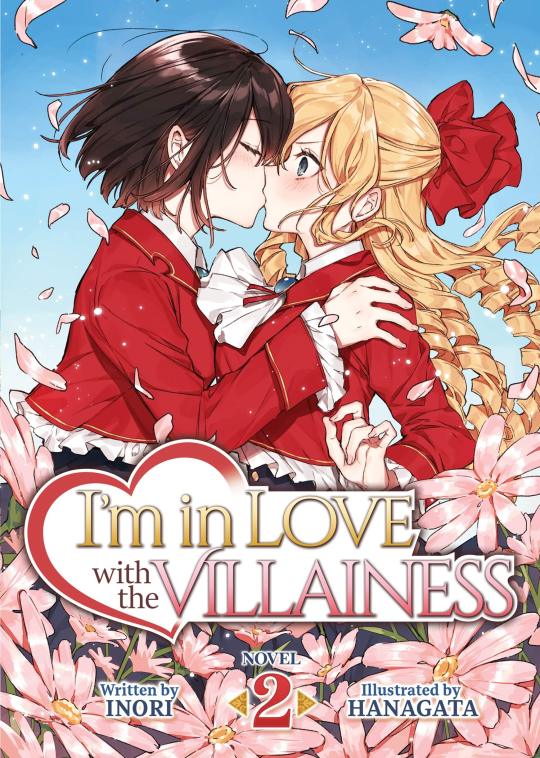
I have backed myself into a corner and see no way out of it. For I have already awarded Inori's I'm in Love with the Villainess a perfect 10/10 score for its stellar first outing. And then, upon seeing what Inori did in the second book, I regret my choice because I have no way to raise the bar on perfection as Inori did in her light novel. Indeed, it has taken me far too long to write this review. My mind is thoroughly exhausted after pondering what I read and accepting the honest truth: that that may very well become a defining work in the next generation of Yuri. For as much time as I spend diving into the Sapphic news of the day, I devote even more to looking to the next big movement of Yuri. If I'm in Love with the Villainess Vol. 2 is a signal of what Yuri's future holds, then we are entering an extraordinary queer era.
The story takes off shortly after the first book. At least for the moment, the commoner revolt is quelled, and Rae continues schooling alongside her beloved Claire. Storylines include a new transfer student rivaling Rae for Claire's affection and the girls going on vacation to visit their families. However, the story takes a pretty dramatic and welcome turn halfway through the book. Through a combination of luck and her expect negotiation tactics, a fruit of her intimate knowledge of Revolution's world and inhabitants, Rae is tasked with investigating corrupt nobles. This change allows Inori to take the world and characters further than in the previous book. While the first volume did an excellent job establishing the world inside the school, this entry ventures beyond the academy's borders into international relationships, the church's role and goals, and the dealings of various factions and political parties. It is appropriate progression and one that lends to the story's main arc well.
While all of these events occur, Rae continues her mission of protecting Claire from the inevitable new order. By the time the finale rolls around, it is so immensely satisfying to see all of her plans and strategies pay off. It carefully balances rewarding the reader's attention and keeping them engaged with new twists and revelations. As the story develops, Claire is exposed to more of the reality of common life through Rae and comes to appreciate her privilege and understand the realities of socioeconomic inequality, evolving from the arrogant young woman we initially met. This path has two effects on the story; first, it allows Inori to explore real-world economic disparity issues while still worldbuilding. Second, it ultimately continues the story of Rae's plan, as she wants Claire to be in the commoner's good graces.
These elements make for a fantastic story in a rich, developed fantasy world. However, I adore I'm in Love with the VIllainess not for its intricate magic system but because of the phenomenal LGBTQ+ representation. I was floored by a frank, open, and wonderfully thoughtful discussion of queer representation in the first volume. Few, if any, Yuri works have done anything similar, and it was honestly an inspiration for me, so much so that I awarded it a perfect score almost solely for that passage. However, Inori once again usurps her own throne, taking this forthright and deliberate queer content and turning it up to eleven!
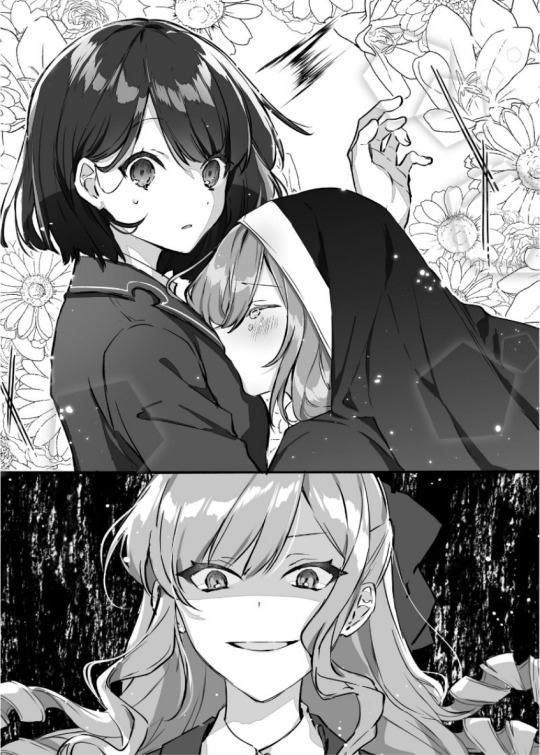
It is almost easier to count the number of main characters not confirmed as members of the LGBTQ community. Figures big and small have their identities explored and revealed during this novel. Some began believing themselves to be straight and exploring their sexuality further. In contrast, others are comforted by Rae's fierce, outspoken, and brazen support and pride in her identity to come forward. One particular scene that comes to mind is when she scolds a pair of nuns for using religion to justify their homophobia. This moment was particularly satisfying to return to after the Catholic Church's recent disavowing of same-sex marriage.
The series even has a character struggling with gender dysphoria who is liberated from society's expectations thanks to a rather ingenious plan of Rae's and her friends, new and old. While not exactly an example of authentic transgender representation as we consider it, as the character's struggles with gender result from a magical curse, but the parallel is clear. Speaking of reality though, the volume grants some glimpses into Ohashi Rei's life, the woman that would one day wake up as Rae.
Rae's experiences with LGBTQ+ identity, set in the real world, are powerful and pull few punches. It is perhaps here that Inori gets most honest and tragic, as Rae painfully describing the ostracization and suffering faced by queer people, culminating in a trans man's suicide (the author thankfully does not describe the actual death). However, Inori balances this pain with the thrill and joy of discovery and accepting oneself, and finding kinship. It is writing that could only come from an author who had experienced these feelings herself, and they will be immediately understood and have a visceral effect on queer readers. I love these moments so much for their vulnerability and relatability. But my favorite part has to be the ending (skip to the final paragraph if you want to avoid spoilers and somehow have not seen the cover of Volume 3).

We finally come to the big queer happy homosexual ending, which is also gay, and my great Yuri goddess, it is perfect! After wading through a revolution and enough surprise revelation to last a lifetime, Claire and Rae settle down into their new life together. Although they cannot legally get married, despite their best efforts, they are absolutely wives. Their families support them, they love each other, and they even have kids! Yes, this unexpected and blissful development, the final gift of this volume, comes in the form of adopted children May and Aleah.
As I exclaimed upon the reveal of Vol. 3's cover, which features the mothers and children, "WE DID IT!! YURI FAMILY!! In Yuri, there are virtually NO stories about queer women raising a family with children together. It is a long dream of mine, the YuriMother, to promote such stories. To have one of the most profound and explicitly queer Yuri stories end in such a happy and new way brought me to happy tears. Except, this is not the end! There are two more volumes beyond this one that continue the story of Claire, Rae, and their children! There is even a very sweet and wonderfully sappy, tear-jerking, bonus chapter of the mother's bonding with the children and helping them recover from their traumatic past. And even become TEACHERS; I could just die happy in this Yuri paradise!
'We need to show we are prepared to live happily ever after, as a family of four. So, I swear to God: I will always love May, Aleah, and Rae.' When Claire said this, she broke out into a tremendous smile and I found myself once more overflowing with love for her. I held her close without saying anything.
Inori's I'm in Love with the Villainess Vol. 2 is precisely what an excellent sequel should be and everything I have ever wanted from a Yuri story. It appropriately raised the stakes in every way, expanding the world, flushing out its many factions and conflicts, and setting a new bar for queer representation and discussion in Yuri. Everything Inori writes feels so perfectly slotted together. Each set piece adds to the character development; each queer issue and identity showcased helps build towards the satisfying and exceptionally gay finale. It is a superlative weaving and integration of the priceless artifacts into an absolute masterclass of LGBTQ+ storytelling. I suspect that this is one of the opening works in Yuri's next era, and I cannot wait to see what follows.
Ratings: Story – 10 Characters – 10 Art – 4 LGBTQ – 10 Sexual Content – 2 Final – 10
Check out I'm in Love with the Villainess Vol. 2 digitally and in paperback today: https://amzn.to/39gE664
Review copy provided by Seven Seas Entertainment
My sincere thanks to Jenn Yamazaki, Nibedita Sen, E.M. Candon, and the rest of the team at Seven Seas Entertainment for translating and adapting this light novel.
#Reviews#yuri#anime#manga#books#literature#lgbt#lgbtq#lgbtq+#queer#gay#lesbian#lesbians#girls love#gl#wlw#trans
374 notes
·
View notes
Note
Are you still working on your Commonwealth study? Do you have any thoughts on Arthur's relationships with his colonies apart from Canzuk + US?
Not properly, unfortunately with exams and then work I haven’t had mental/emotional capacity to do real research (and probably won’t for a while 😔). But I have continued to think about and develop certain relationships, and I think I also have old hcs I’ve never shared, so I’ll put those down!
Born into the Empire
Australia
@oumaheroes has already done such great hcs on him idk what I can add, but basically he was a little bit of a rowdy child, always breaking windows and shattering fancy pots, never able to sit still. I think rainbow once mentioned that Ken (short for Kenneth, my name for Aus) was a lot like England as a child in his curiosity and energy, and I wholeheartedly agree. But I think Arthur’s intensity was more inwardly directed, pushing him to pursue and master new talents and learn whatever he could, while Australia is a little more carefree in his love for the outdoors, exploring, jumping around and off things, little wild animals. Unfortunately for him, he was born in a period of the empire when Arthur was very serious about his kids education, and therefore often praised those who studied hard and learned fast, which really just wasn’t Australia’s cup of tea. Australia took this kinda hard and thought he was the “dumb” one in the family that Arthur was always scolding, but in reality Arthur knew and appreciated that Australias interests lay elsewhere — he was just a frustrated, tired, parent who really wanted to give his kids the best while also holding his empire together, two goals that were never going to fit well in the end and would completely exhaust him.
As Australia’s grown older he’s realized a bit of this (not entirely, though) and also that 1) he really did break a lot expensive things and cause general mayhem 2) scolding us Arthur’s way of showing he cares, if he didn’t he wouldn’t have payed attention to him at all 3) despite being a penal colony, he was still one of Arthur’s more “legitimate” children (being white and a boy) and was therefore still incredibly privileged — never having to question, for example, why it was that Arthur was his dad, if it should be this way, or if he had a seat at the family table at all (more on this later).
New Zealand
Zee, from birth, was a clear favourite. Obedient, calm, quietly intelligent, he would also later develop a blistering sense of humour which combined with his appearance made it overwhelmingly clear who’s child he was. If Ken questioned his place in the family because of his poor academic record and others did because of their appearance/race/other complications, Kaelan never had such problems; his siblings called him the “prince.” Zee, however, also had a charm that, like Matthew, endeared him to his siblings and mostly protected him from jealousy, though he certainly still had issues with being called a try hard, daddy’s boy, bossy, arrogant. Certainly as a child Zee was a little prideful and, under that unperturbed demeanour, willful, but he grew out of it by the 20th century and became one of those most trusted by Arthur, second only to Matthew. He’s also always been inseparable from his brother Australia despite their differences, and today they both have one of the healthiest and most amicable relationships with Arthur of any nation, let alone former colonies (family road trips, every summer).
Bermuda
I absolute fell in love with this girl after reading about here, once, in this fic by @shachaai, and after that my mind just ran away with me. For me, her human name given to her by Arthur just has to be Ariel — for the little mermaid reference, yes, symbolizing her connection to the sea and stunning good looks, but also because:
1. Ariel is a biblical name, meaning lion of God. This makes sense to me, because Bermuda began as a Portuguese trade post, so Arthur definitely consulted our resident bad catholic Port before naming her.
2. Ariel used to be boys name. This also makes sense, because I hc Bermuda was and still is a tomboy. Bitch is fierce, takes no prisoners, and has zero filter. Her letters to Arthur, which all the colonies sent so Arthur could keep an eye on things, were full of shit like “I swear to god if the Spanish don’t get out of my waters I might eat one of them,” and “father, I asked you for destroyers two months ago, and yet you sent them to Hong Kong — could you explain this most unusual occurrence, surely it’s not that you forgot”, and “thank you for the harpoon on my birthday, I caught a small shark a couple days ago and have sent you some of its teeth for your collection.” Arthur tolerates this attitude because he’s weak when it comes to girls; he absolutely spoils his daughters (and flushes like a 16 year old when a woman so much as bats her eyelashes at him). Yes, p*ssywhipped Arthur is a hill I will die on.
3. It also suits her because? Ariel? Shakespeare? The Tempest? Bermuda Triangle? Shipwrecks? Daughter-like figure of powerful and vengeful sorcerer? Yeah. And this girl is a fire spirit — she is so lively, snarky, clever. As she’s grown older she’s mellowed out a little, but still: a no shit taken, no fucks given type of gal.
4. Speaking of growing up, she’s also become quite the beauty. Shacha, if I’m remembering correctly, described her as dark skinned, wavy-haired, and green eyed and that image has been burned onto the back of my eyelids ever since. Those Iberian genetics really be pulling through for her, that’s for sure. Engport love child if I’ve ever seen one. Definitely one of the prettiest in her family.
Singapore
I’ve already mentioned this to needcake, but I’m not too big a fan of canon Singapore, so this is my oc version. Singapore is fascinating to me because it had only a very small local population before it became a colony (The original settlement had actually been destroyed by the Portuguese about two centuries before the British started building a port there.) So nation-tans like Singapore and Bermuda really are Arthur’s children in the most direct sense of the word. And yet, Singapore is mostly ethnically Chinese, with Malays being the second largest group. Growing up Asian in a white, Victorian era family surely cannot have been easy and more than once Singapore probably wondered if there hadn’t been some mistake. To make up for the constant fear that he wasn’t “really” British, Singapore studied ferociously and had a truly terrifying work ethic. I’m not sure if this is common knowledge outside Asian circles, so I’ll mention that this hc comes from the fact Singapore is well known for having truly exceptional students and some of the most prestigious schools. Singaporeans score highly in literally everything and they have an advantage with good English learning environments, a highly desirable trait in Asia, but these results come from brutally long hours — and its really saying something that they’re known for working hard, considering the studying ethic of students in Korea, Japan, and China aint nothing to sneeze at, either. To me this actually fits really well with Singapore’s upbringing in Arthur’s household, because Arthur himself prizes intelligence and hard work above all else, being a workaholic himself.
As for their relationship, it was probably the best when Singapore was young and peaked in the 1930s with the massive naval base the British built at Singapore, at the time the largest dry dock in the world. Singapore was a well-behaved child, not necessarily introverted but not rowdy either, and all the way into his teenage years he truly admired Arthur and was proud to be a part of the British Empire, despite his lingering unease and insecurities. The British defeat in World War II, however, was a massive turning point. He had worked his ass off to be a good son, a good brother, to contribute to the only family and system he had ever known, and he had thought by the 30s he was finally on his way to becoming a fine adult. And suddenly, the British surrender brings his entire world crashing down. He had followed the rules faithfully thinking it was his destiny, but suddenly it was clear that all rules were made up. Of course, his insecurities exploded. If the empire was a ruse, what the hell was he? A part of the illusion? He couldn’t have a truly Asian identity, because many of the old East Asian nations shunned him for his Western upbringing, and he could not entirely understand their values either. So he was a kid who kinda had to figure out late and very very suddenly who the fuck he was and wanted to be.
And, well, he’s done pretty well for himself, hasn’t he. After having a total crisis and questioning everything, I think Singapore slowly started to realize that just because the British Empire as a political entity didn’t last forever, that didn’t mean that his entire childhood and identity weren’t real. The love he gave to his siblings and the love he got back, the hard work he put in, his bond with Arthur and the safe, happy childhood he had — those memories and feelings didnt have to be diminished by what came after. Essentially, he learned the lesson all nations have to learn, which is that one needs to be able to discern between duties as a nation and feelings as a human being, and to some extent keep them separate to protect both.
Whoooooo ok I’ll stop there because this turned into a dissertation, sorry. Let me know if there are any specifics u want me to elaborate on or anything I missed, but I’ll leave this here for today :)
#hws england#hws Australia#hws new zealand#oc: hws Bermuda#not gonna tag anymore I’m lazy#fun times with the commonwealth#I probably won’t write so much for all of them I just put it there to remind myself#needcake#ask#my hcs
43 notes
·
View notes
Note
Do you have an estimation how much racism or xenophobia Yusuf would have encountered traveling with Nicolo across Europe up to the modern ages? This is a very vague ask, forgive me. I wonder how much the concept of racism has changed over time. I have the vague impression that pre-modern European societies were always more diverse than one might assume nowadays, but I have little factual historic knowledge. I also wonder how much xenophobia Nicolo would have encountered.
And you would be correct! Because the “medieval ages were all lily-white and anyone placing POC in them is Wrong” is yet again, surprise surprise, another total lie that is a product of right-wing reactionary revisionism and not based on actual historical evidence. A couple years ago, I wrote a very lengthy post about historical people of color in Europe, starting from the Roman era and going down to about the 19th century (everything prior to the 20th century, basically). Obviously, it only discussed each example briefly, but there’s definitely more than enough there to debunk any idea that medieval Europe was monochromatically white. Iberia, Sicily, and other “crossroad” kingdoms had the most visibly and long-term settled diverse populations, but major cities such as London were ethnically diverse from their founding (which if you know anything about the Romans, truly, is obvious). There is extensive evidence for Africans and Muslims traveling to, if perhaps not settling in, early medieval Ireland and Britain (though sometimes they did do this, as there is a record of at least one African abbot of an English religious house). I also have this list of readings on the golden age of medieval Africa, including the richest king of all time and the various powerful empires that existed particularly in West Africa.
As noted in the Historical People of Color post, the crusades themselves, despite their obvious violence and bloodshed, were vehicles for cross-cultural exchange, which resulted in both Islamic ideas traveling to the west and western ideas traveling to the Islamic world. Medieval Christians were fascinated by “Saracens” as much as they were frightened by them, and there was a flourishing genre of “Saracen romances,” such as Parzival (one of the most popular romances of German medieval literature,which features the half-Muslim hero Feirefiz) and The King of Tars. These romances obviously display complicated attitudes about race and religion; the Saracen heroes are usually depicted as having to forsake their mistaken beliefs (usually some jumbled combination of paganistic polytheism rather than actual Islam) to complete their moral and emotional journey, and in King of Tars specifically, that results in an actual physical transformation for the Muslim sultan, the Christian princess’ husband, from black-skinned to white-skinned as a symbol of his newly gained virtue. Obviously there is an element of colorism at play; I wouldn’t call it racism because racism as a scientific term and “biological” concept was invented in the 19th century when, yet again, the West was busy concocting “impartial” reasons for its colonialism and “civilization” of supposedly inferior people. In the Saracen romances, however, the Saracen characters are not unsympathetic (if misguided), and the star-crossed lovers trope between Christian princesses and gallant Muslim warriors is played pretty much as you would expect it to go (with the implication that we’re supposed to root for him converting to Christianity so they can be together). As long as religious identity is correct, skin color doesn’t really matter or is at least less important, is viewed as mutable and changeable, and not the only marker of a person’s identity.
So in that sense, Yusuf and Nicolo would not be unfamiliar as characters in their very own star-crossed Saracen romance, and since we’ve already discussed the bonds between knights and how deeply romantic and emotional friendships were often the case even between men who WEREN’T lovers, it’s entirely possible that people would have understood them in that context. It also depends on how much time they spent in medieval Europe (as in DVLA, I have them traveling across the Eastern world for several hundred years after the crusades and not getting back to Europe until the Renaissance, when ideas and attitudes toward race and religion were once more undergoing huge transformation). Obviously, yes, there would be an element of xenophobia throughout history, and England (aha, hello Ancestors of Brexit) has in fact pretty much always been known for hating foreigners. But these weren’t necessarily foreigners of color; white Europeans from France, Italy, the Low Countries, Flanders, Bohemia, etc could all be viewed suspiciously by the English, especially post-Henry VIII and the religious break from Rome. (But this was, again, also the case before that happened, because apparently the English just suck like that.) This plays into the fact that as has been pointed out before, racism in Europe is cultured along very different lines from how it is in America, and takes into account geographical, cultural, religious, and other factors, as well as simply skin color. (Though colorism is usually also unfortunately part of it pretty much everywhere, since the ideal medieval woman was often thought to be blonde and blue-eyed, and fair coloring has always been positively correlated with morality -- just look at “Dark Magic” and “Black Magic” and all those other fantasy tropes of the villain being Dark.)
So basically, Yusuf and Nicolo would probably have been equally mistrusted in, say, 16th-century England (such as when they go there in the attempt to rescue Andy and Quynh in DVLA). They’re sodomites, for a start (this is right about when male homosexuality starts to enter the books as a capital crime), and Nicolo is Italian and therefore deeply suspicious as a possible papal agent. Yusuf might have actually made out better in that case, because Elizabethan England had fairly friendly diplomatic relations with the Ottoman and Persian empires (this is written about in the Historical People of Color post) and there was even an idea of Protestant England and Muslim North Africa allying together to attack their mutual enemy, Catholic Spain. Othello is obviously a product of this cultural context, with its dashing but doomed and tragic Moorish captain (see once again: the character himself is not unsympathetic, and is misled by the evil Iago). So many Elizabethan Englishmen settled in Muslim societies that there were attempted royal incentives to lure them back, and Yusuf would probably have been an exotic curiosity more than an existential danger. (As noted, they would almost certainly hate Nicolo more.)
In places such as Constantinople, where I had them live for a while in chapter 4, Nicolo would also be the more obviously mistrusted party. In a Greek Orthodox city that had substantial and long-term populations of Muslims and Jews, a Latin Catholic would be more the Enemy, because... well, sometimes we hate the people who are almost like us more than we hate the people who are obviously very different and therefore cannot be compared. Emperor Alexios Komnenos of Byzantium helped launch the First Crusade, at least in part in hopes of getting formerly Byzantine lands back from the Turks, but very quickly realized that he couldn’t control the crusaders and things went sour long before the trauma of 1204 and the sack of Constantinople; relations between Latin and Greek Christians had been at the brink of outright hostility for most of the crusades (though of course hostility was not the only experience between them). The Byzantine emperors were used to diplomacy and negotiation and trade agreements with their counterparts in the Islamic world, all of which was viewed as “consorting with the enemy” by the West. Besides, the Great Schism in 1054 had already broken the Western and Eastern churches apart after centuries of bitter theological disputes (these arguments may look like the most mind-bogglingly boring and tiny and insignificant details ever, but the battle over defining heresy and orthodoxy RAGED almost from the founding of Christianity in the first century). Edited to add further discussion on the nuances and complexities of the Eastern-Western Christian relationship.
So yes. As ever, the reception that they would have encountered is complicated, and it would not be immediately analogous to modern racism and Islamophobia. It would also be intensely mediated by their cultural, chronological, and geographic location, where sometimes Nicolo would (paradoxically) be MORE mistrusted by other white Christian Europeans. Not to say that Yusuf wouldn’t have encountered prejudice too, because he would, but not quite in the same ways as he would now, or that we would expect.
Thanks for the question!
359 notes
·
View notes
Text
Clarity in the Cancellation Crusade
After posting multi-paragraph comments on a couple different things that have popped up in my feed recently, it seemed like I should probably just sit down and write this out.
“Cancel culture.” Crazy shit, right?
The recent onslaught of cancellations includes Mr. Potato Head, Pepe Le Pew, a handful of Disney movies (Peter Pan, Dumbo, The Aristocats), and *audible gasp* Dr. Seuss. The Muppets also got a newfangled Disney+ content warning, though I’ve seen significantly fewer headlines about that.
The thing that inevitably happens when the news media decides to publish a headline about a children’s toy or book being “canceled” is a veritable parade of social media complaints about how sensitive people have become. I saw this particular post over 10 times in the period of a couple hours one day last week…
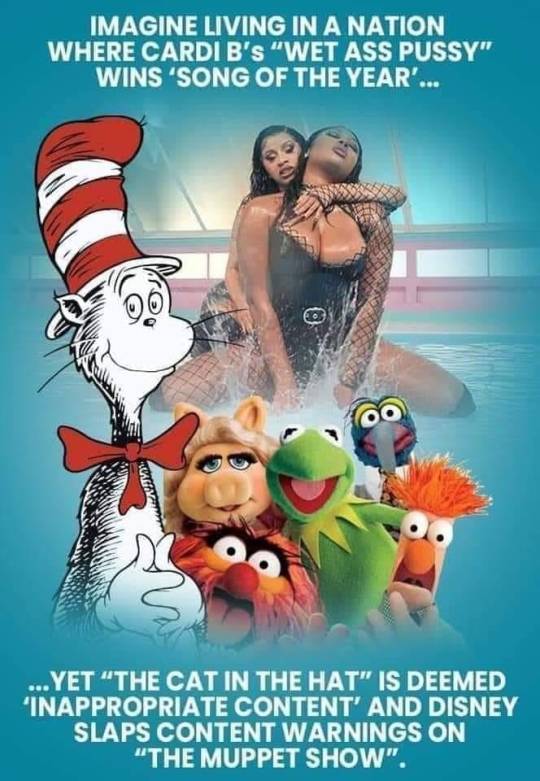
The question I’ve been asking recently when I see posts like that is this: “Who do you think cancel culture is?”
Because “cancel culture” isn’t real. In the majority of the cases currently making headlines, the choice to remove a character from a movie or stop publishing a book has been made by the company responsible for that character or book… and that is very much a normal thing companies can choose to do.
No one I’ve posed the above question to has overtly mentioned “Libtards,” but it’s certainly implied. People who haven’t read a Dr. Seuss book in 20 years are now suddenly all up in arms (literally?) because “the Liberals” are coming for “And to Think That I Saw It on Mulberry Street.”
The Liberals are not coming for Dr. Seuss. They do not care about a potato toy. Also, nothing is happening to the Cat in the Hat. I repeat: NOTHING is happening to the Cat in the Hat.
The choices to stop publishing that book and to market a vegetable toy in a less gendered way were made by the companies responsible for producing those products… not the Liberal “cancel culture” ghoul. In fact, it’s really, really hard to find public outcry about any of the things that have been recently “canceled.” There was a single NYT article that recently discussed the problematic nature of the Pepe Le Pew cartoons… that said, Warner Bros hasn’t aired that show in decades and it is not clear whether that article had anything to do with the skunk’s scene being removed from the new Space Jam movie.
Even growing up I remember things like political correctness needlessly becoming a partisan issue. When we fall into that media trap, all we’re doing is watering the plant of an already poisonous and ineffective two-party system. Be bigger than that temptation. Push back against media intended to further divide Americans. If something stinks, it’s probably rotten. Sure, there are certain topics that fall under the umbrella of political correctness that sound alarm bells for censorship issues… but didn’t everyone’s mom tell them that if they didn’t have anything nice to say, they shouldn’t say anything at all?
Again, though, the most important thing to remember about this recent wave of “canceling” is that censorship concerns are moot. A person who owns a thing is legally allowed to do all the censoring they want. It’s not the government that has decided to stop publishing 6 books written by Dr. Seuss… if it were, we could have the censorship conversation. These changes aren’t happening because there is a Democrat in the White House. They’re happening because the company who makes these products, has for whatever reason, decided to take a different approach.
In the case of the Dr. Seuss books, Dr. Seuss Enterprises re-evaluated their choice to publish 6 books based on racist themes and images. I have only heard of two of those six. The image below is, in my opinion, objectively problematic:
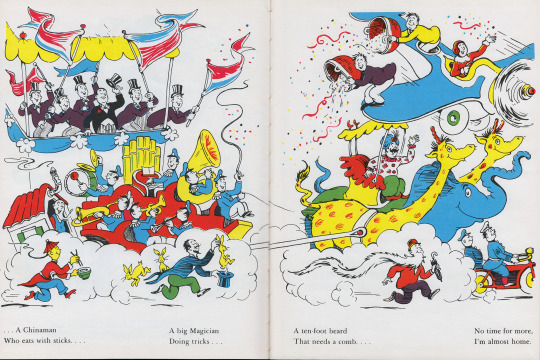
The fact that a major company behind such a well-known name has seen that something is problematic and has decided to stop publishing the books containing overt racist images is awesome. It sets a great example that we can all learn from. Humans have an amazing capacity to learn… that’s one of the only reasons we are in charge here on Earth. If we fall on ice once, we are often more careful on ice the next time. When we see that something is racially problematic, it’s a good thing if we can take action to get that thing out of rotation. More on that later.
Fundamentally, what is happening right now in Media Land is gross sensationalism.
“Cancel culture” isn’t real. Should people face consequences if they say or do racist things? Yes. We should all agree on that. Should we stop publishing books that perpetuate racist stereotypes? Yes. There are plenty of non-racist books that provide an education about racial differences without the added (exceedingly inappropriate) zing of Asian characters being painted yellow and African characters being given monkey features.
If you’re not convinced that some of Dr. Seuss’s material is racially problematic, I encourage you to pop on over to Google to check out the series of ads he did for FLIT in the 1930s. Yes, it was the 1930s. In the last 90 years, we’ve learned that images like that are not okay… let’s use that knowledge to let old racist graphics die.
Still can’t accept that “cancel culture” isn’t real? Still feeling like there’s something in the air now that is different and worse than before?
Okay, then, let’s consider it further.
Things have been “canceled” by people for millennia… this isn’t new. Being all for cancel culture when Colin Kaepernick kneels for the anthem (a perfectly legal form of peaceful protest considered respectful by many veterans) but opposing cancel culture when it’s threatening to eliminate an obviously racist thing is not exactly a moral stance. Burning your Nikes in the street but then turning around and spending $400 on a copy of “If I Ran the Zoo” on eBay after Dr. Seuss’s own family has pulled it from publication due to racist imagery is… silly.
The same people who seem to be so vocal about “cancel culture” now are part of the same communities who tried to cancel plenty of things in my lifetime. Things like trick-or-treating, Harry Potter, school dances, books and movies with LGBT+ characters and themes…
History absolutely bubbles over with things that have been canceled… often for good reason! Some examples that come to mind:
DDT
the Catholic Church (see the 16th century Protestant Reformation)
doing our everyday poopin’ in outdoor holes
polio
hoop skirts
phrenology (new science cancels old science like every damn day)
Ford Pintos (not to mention cars without seatbelts)
telegrams and rotary phones (replaced by easier and better ways to communicate)
lead paint
asbestos
Four Loco
Y’all remember when we all did the ice bucket challenge to cancel Alzheimer’s?
Learning that something is problematic and moving past it is LEARNING… not cancel culture. Learning and growth are good things. We all benefit from them.
Another thing worth commenting on from that Cat in the Hat post that circulated in my Facebook feed: why do we consistently demonize sensitivity? Racism feels like something we should all be sensitive about. If being sensitive about something results in meaningful change and a less hateful country, isn’t that… good? Why do so many Americans seem to place so much value on their “freedom” to hurt others?
And don’t get me started on comparing this stuff to Cardi B. It boggles my mind that that’s happening at all. Why is there suddenly so much outcry about one song that features female genitals in a literal ocean of songs that feature male genitals. I grew up knowing every word to songs about sex well before I even knew what sex was. Your kids are only desperate to listen to WAP because they know it makes you squeamish. And take a second to think about why it makes you squeamish. Genitals are human and scientific and we literally all have them. If you have more of a problem with WAP than with any of the other 10,000 songs about dicks and sex, you need to spend some time examining why that is.
Here’s another post I’ve seen bouncing around the social media feeds:

Something about this is just plain hilarious to me. Like what are racism and rape culture if not THE REALEST issues? This country’s problem with systemic racism runs so, so deep and is reflected very plainly in centuries of cold, hard numbers. It’s not that I *think* systemic racism is a problem. The data very clearly shows that regardless of what white people think about race in this country, systemic racism absolutely IS a problem. Racism and rape culture, arguably at the root of the most recent canceling spree, are not just real issues, they’re real American issues. They’re cultural issues. And solving cultural issues is not easy. We know that these issues have been passed down through the generations so maybe changing children’s toys and books and shows isn’t such a bad thing to try. There is SO much work to do to address racism and rape culture in the United States, but small steps are still progress.
If choosing to stop airing a show that blatantly perpetuates rape culture means one less young person is stalked or assaulted or raped, that’s worth it, no? What if that one young person who doesn’t become a victim is your daughter?
If choosing to stop publishing a book with racist themes and images leads to even one kid understanding more about the nuance of race in America and the breath-taking extent of white privilege, that’s worth it too.
Would I rather the media spend time and money to bring American attention to bigger issues associated with this nation’s racism and rape culture? 100%. There are ENORMOUS fish to fry. Dr. Seuss is not an enormous fish. Potato head toys are not enormous fish. Pepe Le Pew is not an enormous fish. They’re not even big fish. They’re small. They’re tiny fish. They’re anchovies. But frying some fish is better than frying no fish.
Canceling Pepe Le Pew is not hurting anyone. Warner Brothers owns Pepe Le Pew. Warner Brothers owns nearly everything; they are not hurting for money. And canceling Pepe certainly isn’t hurting American kids. There are plenty of other kids’ shows to watch that are significantly less problematic. Just because you watched Pepe Le Pew and went on to be a properly respectful adult doesn’t mean there aren’t other kids out there who did internalize a harmful disrespect for consent. No, Pepe Le Pew probably isn’t single-handedly responsible for anyone’s decision to stalk or rape anyone else. But could a show reinforce the groundwork that ultimately leads a kid down a path where he is unable or unwilling to respect the boundaries of others? I mean, it’s not the craziest thing I’ve heard this week.
Canceling six total Dr. Seuss books that are already pretty obscure is not hurting anyone.
Changing the name of an already genderless potato toy to reflect that genderless-ness is not hurting anyone.
A brief recap: racism and rape culture are very real, very American issues.
If the decision to stop doing a thing doesn’t hurt anyone and may even save someone some hurt, why does that decision bother you?
Also, in all your frantic Facebook posting, make sure you are differentiating between “cancel culture” and consequences. When the media tosses around the phrase “cancel culture” it has this tone of finality that is, plainly, not realistic. Fads and trends move so quickly in the internet age that the idea that a group of people could “cancel” something permanently is just not possible. People who do or say racist things, though, should face consequences. People who do or say transphobic or homophobic things should face consequences. Consequences are one of the only ways we learn to do better. And again, that’s not my opinion, it’s science.
One of the consequences that can have the most impact is, you guessed it, losing money! In this capitalist hellscape, money talks. Boycotting and choosing how we spend our money are some of the most engaging ways to combat racist and homophobic garbage. When you have your temper tantrum because the company who owns a book with overtly racist imagery decides to stop publishing that book, that speaks volumes about your priorities. If you respond to that company’s decision by buying the book in question on eBay for $400, that speaks even louder volumes. What are you doing? WHY are you doing it? I’m guessing you don’t even know, and you should probably spend some time thinking about it before you flush away a chunk of your stimmy on a freaking RACIST KIDS’ BOOK.
All actions have consequences. All of our choices never affect just us. How we vote affects other people. How we spend our money affects other people. Spending our money on things that are problematic perpetuates the problem… whether it be racism, rape culture, homophobia, or transphobia… or so many other things this country desperately needs to address.
It’s human to not like change. Change is going to happen, though, regardless of whether or not we’re comfortable with it. In the information age, we have a remarkable opportunity to steer that change. Leaving behind racist relics is change, so it may be inherently uncomfortable. But change that moves our country away from racism and rape culture is GOOD change.
I am begging you. Use critical thinking… if you’re seeing a headline about something being canceled, look up WHY. Some of these headlines are absolute bunk… they’re shared just to get people all riled up and create American division. However, just like we *should* cancel lead paint, a children’s book with overtly racist images shouldn’t be published anymore and it’s weird if you disagree with that. Disagreeing with that decision, as silly as it may seem, perpetuates racism. I know how triggered y’all can get when someone suggests you might be perpetuating racism, but it is what it is. Do your research. Don’t spend your money on racist garbage. Be better.
I feel like this post is me just barking the exact same thing in different ways, but I also feel like there is so much more I could say.
I’ll leave you with this:
What will it take for Americans to weigh the threats of racism and homophobia the same way we weight the threat of lead paint? If it’s a matter of costing lives, well, the numbers speak for themselves.
#cancel culture#cancellation#racism#rape culture#the muppets#pepe le pew#dr. seuss#seuss#consequences#change#mr. potato head#potato head#cancel culture isn't real
16 notes
·
View notes
Note
hey, can you tell us a bit about racism in Spain? I'm incredibly uneducated about it, and I don't know much about Spanish history especially racism wise so it would be really nice to get an insight from you about it.
this is a big question, since Spain’s relationship with xenophobia dates back centuries and I’m neither the most qualified person to take you through it nor someone who has suffered from Spanish society’s racist tendencies. However I’ll try to piece a bit of something together and maybe other people can add on if there’s other stuff to include. Also, this is mainly Spanish history from a racism perspective, there are many other positive things in other areas that I haven’t included (patriota pero no mucho)
So basically, up until the 15th century, Spain (in its then form) was a relatively harmonious melting pot of different cultures. With the Roman invasion, settlements and a Visigoth takeover (Germanic population) thereafter, Christianity was pretty firmly established in the country/iberian peninsula by the 2nd Century AD. In 711 AD the Moors, who had control over Islamic Africa, invaded the peninsula and established a Caliphate named Al-Andalus which had a particular stronghold in the south: in Andalusia and their Córdoban capital. Rule was stronger or weaker depending on the region but largely Islamic rule was established and Jewish and Catholic people were treated as second class citizens. Córdoba became the wealthiest, largest and most sophisticated city in Europe by the end of the tenth century, with trade and rich intellectual North African traditions forming a unique culture in the region.
There is a strong historical basis that during a lot of this period there was pockets of ‘La Convivencia’ ie. the co-existence of Jews, Christians, and Muslims. Like for example, around Toledo where in universities the three backgrounds contributed to tremendous amounts of sharing of knowledge etc.
However, from about the 9th century onwards the Catholics who still held strong points right in the north, begun ‘la Reconquista’, the “reconquest,” where they began chipping away at the Caliphate’s dominance. By the early 11th century they had gained more land than was held by the Muslims and 1492 is where we set our next scene.
This is probably one of the biggest and most path changing years in Spanish history. Most known for being the year when Columbus landed in America, this enabled the start of Spanish imperlism which would extend to almost 5 centuries afterwards, conquering territories in South America, Africa and Asia and subjecting them to imperialistic rule and policies of white totalitarian dominance.
The second important happening in this year was the fall of Granada, the last remaining territory the Caliphate had in Spain, signifying the end of Muslim rule in the country. They were, as expected, thrown out of the country in their droves and many others were forced into hiding being subject to situations that would only get worse with the Inquisition in full swing.
The third, and last, big event in this year was outlined in the Alhambra Decree where the expulsion of all practicing Jews was announced. Now this had already followed the forced conversion tens of thousands of Jews had been subjected to in 1391 and 1415 (ie. crusades and masacres against them). As a result of the Alhambra decree and the prior persecution, over 200,000 Jews converted to Catholicism and around 160,000 were expelled.
This ended religious diversity in Spain, the Inquisition sealed this fate. If you’ve heard of one thing about all of this I’m sure it’s the spanish inquisition. Primarily set up to identify heretics among those who converted from Judaism and Islam to Catholicism and ensure the establishment of the Catholic monarchy, it became a method of torture, fear and murder for those who were perceived to cause any threat to the Spanish catholic order. The effects of the Inquisition are widely debated, with some saying the death toll and magnitude has been blown up by the Protestants in other European countries at the time and does not show the full picture of the hundreds of thousands of converted jews and muslims who remained and overtime became integrated into Catholic society. Whilst others remaining firm to the devastating measure of these actions and the ‘pure blood’ mentality it created. What’s for certain though, is that by the end of the Inquisition in 1834 very little religious nor ethnic diversity remained in Spain.
Jump forward about 100 years and the Spanish Empire is no more after the 1898 crisis, there’s a weird back and forth period with Republics and Monarchies and dictatorships until the Civil War broke out in 1936. It lasted until 1939 when the Nationalists, led by Franco, took total control of the country and submitted it to a dictatorship that would last until his death in 1975. I don’t even know where to begin with a period that many people see as rosy and many others ignore completely whilst Historians have now gone so far as to call the 1940s and 50s the ‘Spanish Holocaust’. However I’ll break it down to one or two main things that have predominantly spurred on today’s racist attitudes.
During the Civil Rights movements of the 50s and 60s Spain was largely immune to the winds of changes due to their isolationist policies and dictatorial power holds. We didn’t take part in any of the dialogue nor go through any racial reconciliation, at least to much a lesser extent than most other countries. It’s quite a common thing to say that what much of europe did in 70 years we’ve only had time to do in 45, and there’s much of a grain of truth in this.
A famous conservative spanish politician called David Aznar defended these views and can be extrapolated into the sentiment that existed to facilitate the transition to democracy and still remain today: "In the democratic transition there were implicit and explicit agreements. One was that we Spaniards don't want to look to the past. Let's not disturb the graves and hurl bones at one another.” As a society, we hate to think about the past, it’s just not widely done. There’s ONE museum solely dedicated to the Civil War, the Historical Memory Law passed in 2007 to try and increase the rights of victims and their families was met by so much opposition and is devastatingly underfunded etc etc. This still translates to spaniards’ views on racism, saying it just doesn’t exist here and moving on. There’s a refusal to confront this and microagressions are ingrained in the culture.
As I’ve kind of mentioned before, issues of race extend much further than towards just black people which is why the US BLM movement cannot simply be traced onto Spain. People who are originally from Latin America face extreme stereotypes and varying forms of discrimination against them as do Arab populations and other people who have immigrated from MENA countries plus the large Roma communities.
The refugee crisis has further perpetuated the stigma around African immigrants in the past years, whilst the social effects of the 2008 Financial Crisis and beyond also continue to contribute to a xenophobic and nativist perspective where true spaniards should be prioritised with jobs, opportunities etc. For example, the alt-right wing party Vox that’s blatantly racist, anti-immigrants etc posted something with the slogan ‘Spanish Lives Matter’ the other day. They are purposefully incendiary.
Anyways, hope this was a suitable start for you, you can’t summarise millennia worths of history into a few paragraphs but I tried my best. Also there are obviously many who stand for none of these values, politicians who have tried to right these wrongs, activists who keep fighting the fight, people who have broken down barriers and areas where there’s complete coexistance. However the fact remains that these views and ideas are ingrained in people’s minds, theres blatant job discrimination and a lack of equal opportunities despite laws that may have been put in place.
I’m going to point anyone who has got this far to a couple of articles about racism from an Anglo-Saxon perspective below, racist football culture is almost always mentioned. Being a black traveller in Spain; Same Spanish Holocaust link as before but an extremely important book review read; Irish perspective on the Enigma of Spanish Racism; Racism? What Racism? Asks Spain; Opinion: Racism Is Alive and kicking in Spain
#almost a decade of ciencias sociales and cono lessons pulling through#anyways there's a lot here so maybe dont read it all by id recommend having a good skim of it!#i tried ny best to condense almost two centuries worth of histort into one post lol#blm#black lives matter#racism#spain#españa#history#og#the asks#*not two centuries lol two millennia im out here discrediting myself and everything i wrote
42 notes
·
View notes
Text
charactersssss (a constant wip)
annie morris … twenty-five. currently haunted by her paintings and doodles. how embarrassing! waitress, artist, medicated for an illness she doesn’t has. is actually just from a bloodline of cursed female creative types. more info can be found @tghluck. (fc: mary elizabeth winstead)
edward ainsley … sixteen years old, is actually fifty-seven, vegan vampire. utterly disliked by his vampiric peers due to his being turned into a vampire in his youth, rendered sixteen years old for life. has a tendency towards alcoholism in order to silence his cravings for blood since he deems vampirism altogether unethical. more info found @pastytwat (fc: craig roberts)
robbie moore … fifty. always one of those too big for his own boots kinda guys – one of the ‘i’m jumping ship as soon as hit eighteen’ types. that’s what he did, and that’s when he absolutely fucked it. ran his mouth too loud for too long and ruined any chances he had anywhere he went. robbie is a writer but his unwillingness to compromise with his work leaves him unable to find any real place in the industry. an absolute self publishing expert. to pay the bills he’s an english teacher but there’s no real passion for it. he came back to his hometown after struggling his way around the country and settled down in a marriage with his high school sweetheart that turned sour quickly. the pair never had children and were heading to a painful divorce when his wife passed away suddenly. years down the line and he’s still trying to wrap his head around it. jesus fuck this guy. (fc: marc maron)
tara shaw … thirty-four. owner of SHAWSPB, an independent publishing company ran (run? past tense…? it’s confusing) by one tara shaw, someone who needs to work on her social skills. as it seems, you can actually only reject so many people so many times before it bites you in the ass. more specifically (and more accurately), you can only reject so many people so meanly after you fire the companies’ reader because they’ve let one too many trashy reads out of the slush pile and you have to start wading through the heaving thing yourself. opening manuscripts seemed well and good and safe enough because all you’d be facing is words that were crappy in a worst case scenario, until late one night, you stumble upon something that a sour faced rejectee (yes, one that landed themselves with a personalised handwritten and very specific rejection from the woman herself) gets their pages in the pile. tara opens it and finds that it’s no story at all. it’s a string of nonsense – words that don’t exist, script she’s not sure she’s ever seen before, but transfixed on the page, tara shaw reads the thing front to back and the second she puts the papers down is hurtled into the space time continuum, left to float around in there til something grounds her back into the real world, when or wherever that is. it’s an act of karma, or something, and whenever she lands she pukes her guts out because that’s what that kind of thing does to the human body apparently. (fc: natasha lyonne)
genevieve walsh … seventeen. was made fun of in year six for choosing to go to an all girl’s catholic secondary school, her classmates saying that she would end up a lesbian. she did, though it was unrelated to her formal teaching. very unrelated. she has too much going on and is too moody for her own good. extra info can be found @genegrieve.
morrigan kenny … age unknown. bringer of the apocalypse. wanders earth with her way too long hair (it collects twigs and mud) looking for someone to spend the rest of the end with.
alex … thirty-odd (undisclosed actual age) years old. she is yet to learn to do her taxes, and is for all intents and purposes: a con-woman. arguably not an ethical profession, charging the old and the gullible for exorcisms and that of a supernatural variety while having no knowledge of the subject. but a girl’s gotta make a living — volunteering yourself for stand up gigs at the same place night in night out with little to no compensation doesn’t provide much. she’s a kind person, if you ignore the conning, and is decent to talk to. will give away any information. whoops. (fc: jenny slate)
lou webster … seventeen. modern prophet. refuses touch with good reason (skin on skin means she see the other person’s skin melting off, right to the bone). regularly sees the end of the world and it gives her stomach aches. (fc: natalia dyer)
liv o'dell … twenty-nine. screaming messy would probably win the lottery (the luck of her) if she ever tried it, multiple time accidental murderer. makes no sense. is rude. is annoying. has a surprisingly sweet daughter (kitty). more info @heavyroads
betty cloverfield … a twenty one year old motormouth who can’t hold down a single thing she’s meant to. she happens to have recently induced some type of magenta sensitive dissonance in her sensory processing that she can’t shake. it’s speculated by many that she’s taken one too many poppers and it’s taken its toll. (fc: kat dennings)
aiden ryder … seventeen years old. the angstiest, quietest idiot with four fully charged portable chargers to hand at any moment you will ever know. heavily associated with @optimistsclub (fc: jack kilmer)
mert james ... 21. a children’s author, the writer and illustrator of the BEWARE GIANT CREATRUES series. he has many reasons to not want to leave his house and most surround the obvious images conjured in the phrase hatemyself1999 — hate myself (explanatory) and 1999 (dexter ‘mert’ james’ birth year. also self explanatory once you know this fact). all that said, he does in fact leave his house. teaches drums to kids. none of them practise and it makes him insane. in a running circuit of bands where none of the members are committed. that, or he’s misjudging their commitment and giving them nothing when they do in fact care and then he is the dick. music snob, deadpan snarker, karma houdini, middle child syndrome, world of cardboard, can’t get away with nuthin, i coulda been a contender!
lazyguts / victoria ... suicide/eating disorder mention. i’m writing her through ages 17-19 and here’s the brief overview/context: lazyguts lost all of her friends the year before she went off to university as a result of her total withdrawal [causes being a) her brother attempting to kill himself (he survived but it’s very confusing to grieve a hypothetical especially when you’re not supposed to talk about it) and then b) her already struggling with food issues getting worse worse worse. these two things alone are not the reasons as no one else explicitly knows about them, but the adverse effects of these things combined make her difficult to be around/hard to maintain a friendship with her. all very tragic, but still happens. uno].going to a uni where she doesn’t know anyone seems like the best move. she does. she makes friends with a girl called olivia and they become mad close very quickly. this lasts maybe two months until lazyguts starts locking herself away in uni room and doesn’t see much of anyone at all. she has to drop out on mental health reasons just before the end of her first year. she moves back home and lives miserably and very solitary. she and olivia have long lost touch by this point. a few months later she sees an in memoriam post up on olivia’s social media from some of olivia’s friends saying how tragic the loss is, etc/ olivia had killed herself. the post had said something about a project for the close friends of olivia and she tentatively sends a message despite having never really known the girl. anyway, after quite a few ‘exaggerations’ and then a few straight up lies, she ends up super into the friend group of olivia’s based on the lie of being a long-time friend of hers. she’s not sure why the lie comes out nor why she keeps it going. it’s something to cling onto so she does. best way to put it is she’s very dear evan hansen about it, lying lying lying lllyyyinng. eventually she’s caught out but we’re not there yet (fc: odessa a’zion)
dale knox ... 30ish. painter/decorator. info literally not ever written out before. he’s lovely and in a constant state of stress! affiliated with @fullyfungi (fc: aidan turner)
lenny gata ... 26. lonely funeral poet. followed by a select few of the unknown dead #irl after an accidental latin spell read out at a graveside (not her fault, literally not her fault - she read this out in good faith). caught ignoring them/walking them to their homes depending on the day. (fc: aubrey plaza)
millie matthews ... 17. half part antichrist. the other half is her twin sister (#MISSING). currently, unfortunately, sadly, disappointgly, worryingly, being tracked down.
more tbaaaaaaaa thank you thank you
2 notes
·
View notes
Text

Ravished By a Highlander. By Paula Quinn. New York: Forever, 2010.
Rating: 2/5 stars
Genre: historical romance
Part of a Series? Yes, Children of the Mist #1
Summary: Davina Montgomery is no ordinary English lady. For her own protection, she's been locked away from society, her true identity the Crown's most closely guarded secret. Until a shocking betrayal--and a bold rescue--land her in the arms of a fierce Highlander, a powerful warrior whose searing gaze and tantalizing touch awaken her body and soul. As the firstborn son of a powerful Scottish laird, Robert MacGregor has no loyalty to the English throne, but he's not the kind of man to leave a woman in distress, even if she is English. He vows to deliver Davina to safety, unharmed and untouched. Yet one stolen kiss leaves them both smoldering with desire...and desperate for more. With Davina's secret threatening to destroy his clan, Rob must choose between everything he holds dear and the one woman he can't live without.
***Full review under the cut.***
Content Warnings: sexual content, violence, misogyny (including misogynistic language)
Overview: This review requires an explanation. I used to work for an academic journal which received a copy of this book a number of years ago for review. The journal not only does not review fiction books, but only covers the field of medieval studies, and Ravished by a Highlander definitely isn’t “medieval” (it’s set in the 17th century). The review copy of this book has been sitting in the office ever since, staring down at the editorial assistant from atop a filing cabinet, and has come to be a kind of unofficial mascot. But no one who works for the journal, past or present, has, to my knowledge, read it. So I did. And boy, was I kind of torn on how to rate it. On the one hand, it didn’t have any sexual assault, which is good, and the heroine critiqued the hero’s broodiness and violence in a way I found pleasing. I also think Quinn tries to do some interesting things with her religious language, and I appreciated the fact that this story was set in a relatively little-used historical period. However, I ultimately gave this book 2 stars because I didn’t find the hero or the overall plot compelling, and I’m generally skeptical of Highlander romances, as they tend to exoticize and eroticize Scottish culture in ways I find uncomfortable.
Writing: Quinn’s prose is, for the most part, fairly straight forward. It’s about what one might expect out of a romance novel in that it makes no attempt to be literary or high brow. I think that’s fine, as this book is aimed at a particular audience and doesn’t need to try to be something it’s not. I also appreciated that Quinn’s prose flowed fairly well and was easy to follow, so it’s skimable, if that’s what you’re into.
I also think it’s worth giving Quinn credit for attempting to do interesting things with religious language and imagery. A number of times throughout the book, Quinn will allude to God or the Bible to remind the reader that both protagonists are Catholic and religion plays a large part in their lives. While sometimes it comes across as cheesy, I think it’s fine, given the genre.
I will say, though, that I found Quinn’s attempts to write in the Scots dialect a bit heavy-handed and archaic-feeling. I can’t say for sure if it’s accurate, since I’m not Scottish, but there were moments that made me wonder if she was more concerned with the Scottish aesthetic than actually making her language sound natural.
Plot: Set against the backdrop of the coronation of James II of England, this book tells the story of Robert MacGregor, the son of a prominent Scottish laird, and Davina Montgomery, an English noblewoman. Fearing assassination, Davina has been hidden away in an abbey, but her whereabouts are soon discovered by her enemy, the Duke of Monmouth. Monmouth’s agents launch an unsuccessful attack on the abbey, leaving Davina alive but alone and unprotected. Robert, a Scotsman who happens to be visiting the Abbess, agrees to see Davina to safety, but has a crisis of loyalty when he falls in love with her and learns her true identity.
I really appreciated that Quinn chose the reign of James II as the setting for her story. I’ve read countless romances set during the 19th century, and though Highlander romances seem to span a number of different time periods, it doesn’t seem like this one is particularly popular. Because this is a romance and not historical fiction, Quinn does tend to flatten the history a little, but I don’t think I have grounds to complain too much.
Where I do think I can complain, however, is in my reaction to the rest of the plot, which involves a lot of running away from Monmouth’s agent, Gilles. Honestly, it never felt like Gilles was a threat, and because he never seemed to get close to Davina and Robert, much of the book was really about characters having angsty feelings as they traveled north to Scotland. Nothing much happened to them on the road, which is fine sometimes, but as a result, I found their relationship drama to be somewhat repetitive. I would have much rather they encountered threats to Davina’s safety and identity along the way so I could see the two navigate these challenges and, consequentially, also navigate their political hang ups.
Characters: Davina, our heroine, admittedly defied some of my expectations. I expected her to be something of a headstrong woman who does what she wants, and to some extent, that was true. But I was rather surprised that Davina mainly does what she wants and what she wants is to be kind and compassionate towards others. I loved that she drew people to her with her warmth and genuine interest in other people’s well-being, and I liked that she was always looking to connect with people by sharing in their joy. I did get a little tired of people constantly referencing her beauty, and I occasionally wanted her to be a little more angry when Robert did something undesirable, but overall, she was complex enough to hold my interest.
Robert, our hero, was about as interesting as a rock, in my opinion. Though he has some personal conflict in that he feels like he always has to live up to his father’s expectations, he really doesn’t have much of a personality beyond that (unless you consider “Scottish” to be a personality trait). I did appreciate that Quinn didn’t make him overly broody or violent; he does have his moments, but his protectiveness over Davina wasn’t as possessive as other heroes I’ve read.
Edward Asher, an English captain tasked with guarding Davina, was also something of a surprise in that he didn’t quite fit the jealous lover stereotype. When I read that he was in love with Davina, I expected some petty fights between him and Robert, but I was glad to see Asher put those aside when necessary and seemed to prioritize Davina’s safety over his own happiness. I half wish Davina had ended up with him, as their relationship has way more angst to overcome (you’ll see why if you read the book) and might have been more satisfying than her falling in love with someone she just met.
Gilles, the main antagonist, was just meh. He mainly exists to have some scenes where he’s killing people or being a misogynist, but since he never squares off with out protagonists until the end, he’s something of an empty threat.
Other characters were hit or miss. I feel like most of the male Scottish characters were there to be Scottish, or else show the complex web of family ties and expectations. They could have been more interesting, as none of them had their own arc; those with the most potential (like Tristan) seem to have their own novels later in the series. I found the Scottish women to be much more interesting, as they were fierce and warm, becoming friends with Davina in a women-supporting-women way.
Romance: While I liked that Davina and Robert seemed to build their relationship around the desire to put their own desires ahead of their family duties, I ultimately didn’t find their reasons for loving one another very compelling. Davina seems to love Robert because he makes her feel safe, which is fine, but they don’t really bond over shared enjoyment of things, which worried me. Robert is serious all the time and never plays around with Davina the way his family does, so it feels like, once the danger is behind them, the only thing they enjoy about one another is their physical attraction. To be fair, Robert seems to have some admiration for Davina that will last over time. He enjoys her laughter and her kindness, and I think he talks a bit about being drawn to her personality in addition to her beauty. But overall, it felt like their relationship had very little staying power.
There’s also a really odd romanticization of Robert impregnating Davina, which like... I get it. They’re Catholic. And having children is often portrayed as the ultimate fulfillment or realization of heterosexual love in romance. But still, I found it unsettling.
I also should mention that I can’t quite tell if most of the appeal of this romance is in the fantasy of taming or seducing a Scottish “barbarian.” I’ve always felt like Scottish culture was Othered in historical romance, maybe because it’s a “white” culture (which is objectively wrong, but I’m talking about the popular imagination) so it can be called “barbaric” in a way that African or Asian cultures can’t (without the author being accused of racism or Orientalism). It seems to me that a lot of romances simultaneously Other and eroticize Scottishness, perhaps as a kind of power fantasy when the heroine tames or tempers Scottish brutishness. To be fair, Davina never attempts to reform or “civilize” the Scottish characters aside from balking at unwarranted violence, and she even finds belonging in the Scottish Highlands, something she spends the majority of the book searching for. But still, the Scottish references were stereotypical or generic enough where I couldn’t quite see the characters as real.
TL;DR: I read Ravished by a Highlander for reasons related to my former job, and while I’m glad I did, I also didn’t enjoy the experience very much. While I didn’t find it offensive as other romances, and Paula Quinn does subvert some of my expectations, I also didn’t find the plot very exciting or the romance very compelling, and the hero was more of an archetype than a full-fledged character. Thus, I couldn’t give this book more than 2 stars.
2 notes
·
View notes
Text
Letter from a disenchanted student of the Divine Principle
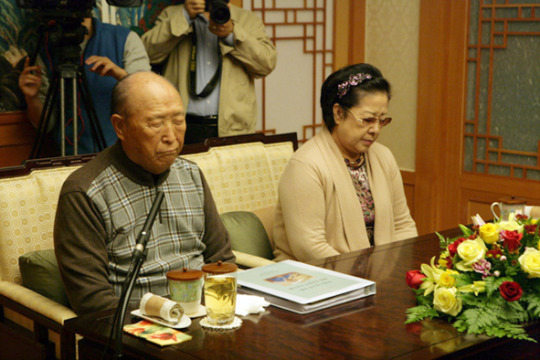
Many Unification Church members seem to think people who left the organization are like some kind of lapsed Catholics, but most of those people just recognized Moon’s absurd and contradictory rhetoric had absolutely no relationship to reality – I pointed out many of those obvious contradictions in my previous letter to Rev Moon. Even the vaunted Divine Principle was not his own teaching. Much of it came from a woman called Seong-do Kim whose revelations began in 1923. She stated that Jesus did not come to die (not new because other Christians had taught this previously), she also taught that the fall was a sexual sin (again not new because Jewish scholars suggested this long ago and anyone can recognize the association, even sex shops use a bitten apple to advertise their wares). She also taught about the change of blood lineage through the messiah – thus justifying all the deviant sexual activity involved in the pikareum rituals. Another source was a woman called Chong Deuk-eun who dictated a book called the Principle of Life in 1946-47. It was published in 1958.
The history parallels were taken straight from the teachings of Baek-moon Kim’s Israel Monastery – being the reason they finish in 1917, which was Baek-moon’s birth date rather than 1920 when Moon was born. The final Divine Principle book was composed by a committee guided by Hyo-won Eu with input from Young Oon Kim and various professors. So rather than being a direct revelation, the DP is actually an interesting amalgam of Christian theology, nineteenth century science, Oriental philosophy and shamanism – added to the insights and teachings that were taken from various Korean spiritual groups.
This was why I felt free to approach much of the DP as almost allegorical because the main thing to emphasize was personal spiritual maturity – the development of a loving parental heart. (The real meaning of ‘perfection’.) I never believed that absolute Cain/Abel rubbish spouted by Moon and Japanese leaders. I remember one itinerant worker saying, ‘If my central figure tells me this red dress is blue then it’s blue.’ Absolutely insane – but this is exactly the kind of thing that has been propagated by the Moon family and their minions, especially in Japan, and it leads to all kinds of abuses.
In addition to the DP we also have Rev. Moon’s great blessing theory, whereby through downing a glass of holy wine and being engrafted to his lineage we become capable of conceiving pure offspring, free from original sin. These ‘blessed’ children can then form the core of the heavenly kingdom on earth, of course with the ‘True Parents’ and their children at the absolute center. However, the proof of any pudding is in the eating – regardless of how good the recipe might sound. So let us look at the results, the fruits of the messiah and his teaching.
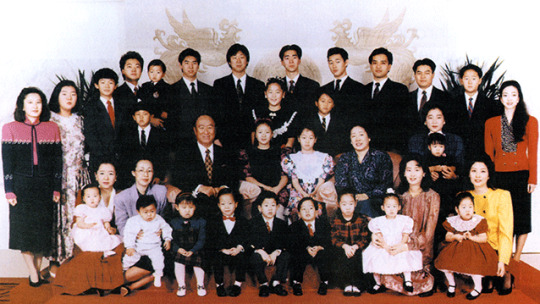
We can start with some of his own blessed children: Ye Jin – (Divorced.) Hyo Jin – was a drug addict, I saw him give a sermon one time when he was so stoned he had to hold on to the podium in order to stand up. He punched and kicked his wife, Nansook Hong, watched pornography, walked around with a gun in his pocket and beat up church members. (Divorced.) In Jin – was forced to resign her position because it became public knowledge about her affairs with two married members and the illegitimate child she had with one of them. (Divorced.) Un Jin – said clearly on TV that her father was not the messiah, and that the church was just about power and money. (Divorced.)
Hyun Jin, the kind-hearted business expert who wanted to cut the salaries of our church’s jewelry workers by a third – I saw a video of him calling a church leader an arrogant bastard and kicking him as the man knelt before him. No matter what the guy was guilty of, this was just one more example of the violence perpetrated by the Moon family. Which of course was epitomized by Cleopas, the black Zimbabwean supposedly embodying the spirit of Heung Jin, who went around the world viciously beating up men and women, putting some in hospital. He even threatened church members with a pistol. (All of it approved by Rev Moon who laughed at the beatings and had himself used a baseball bat on members.)
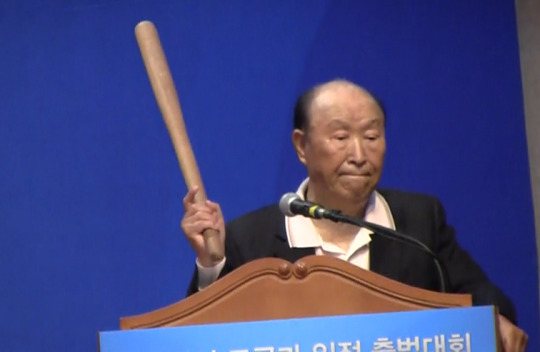
Kook Jin – an arms dealer who said Abel wouldn’t have been killed if he’d had a gun. Divorced his wife and had himself re-blessed with a Korean beauty queen. He now has his own group of armed ‘knights’ willing to do whatever he orders. (Divorced.)
Hyung Jin, the heir apparent (according to him), lied about getting a BA from Harvard when he actually attained a lower qualification – and if he thinks the parable of the sower is referring to ‘absolute sex’ I think he needs to go back to Divinity School. His Sanctuary Church now promotes the owning of AR-15 semi-automatic assault rifles, and has ceremonies with participants carrying these lethal weapons while wearing bizarre crowns of bullets. According to one of his recent speeches, all the women of the world are ‘Brides of Christ,’ and he of course is now in that Christ position.
Don’t want to go into details about some of the others as I feel sorry for them.
So this so-called true family demonstrates clearly that there is no difference between blessed children and any others. Rev. Moon said as much in Korea when he was talking about Sammy Park, his illegitimate son. He said, ‘The sons from the concubine are better because there is more passion involved in their conception.’ So much for the value of the blessing.
(Of course Mrs Moon blames the bad behavior of her adult, absolute ruler children on the poor church members, as though they could do anything to control it.)
So now lets look at the practical results of all the members’ sacrifice and offerings:
This Parc One court case (the conflict that began between Kook Jin and Hyun Jin) resulted in at least 700 million dollars of church money going to lawyers and outside companies. This is at a time when Japanese church members were being bled dry; many could not even afford to go to the dentist. (They were commonly referred to as ‘the toothless ones’ in Japan.)
Cheongpyeong – you couldn’t make it up – they were selling apartments in the spirit world! People have to be completely away with the fairies to buy into that. Mrs Hyo Nam Kim (Dae Mo Nim or Hoon Mo Nim) after being denounced as a fraud, walked away with assets worth more than 230 million dollars (including one of the top golf courses in South Korea), so her spiritual real estate business must have been doing very well. It’s as crazy as charging money so that your ancestors can attend workshops with the spirit of Heung Jin, or paying thirty dollars for two bottles of Danjobi shampoo to get evil spirits out of your hair. (This all of course also being done with the consent of Rev Moon.)

Mrs Kim was supposedly channeling Dae Mo Nim, the mother of Hak Ja Han, which was actually a strange choice because Dae Mo Nim and another woman had spent two years in jail for beating a mentally ill youth to death in one of these frenzied ansu sessions (where they beat bad spirits out of people).
That whole Cheongpyeong providence is merely old Korean shamanism, and just because people have spiritual experiences there doesn’t validate what is going on. Something many members don’t realize is that God works to educate and reach people regardless of what religion they are following.
Rev. Moon often praised Korean culture but Korea was a slave society for most of its history. Although the number of slaves had declined during the nineteenth century the institution was not legally banned until 1894, and the system survived in practice until the 1920s. At least one third of the population were slaves in the past, and the children of slaves automatically belonged to their masters – with most wealthy men keeping concubines. The Koreans always had that tradition of the Yangban, or aristocrats, being served by everybody else, even having a caste of sex slaves for that purpose.
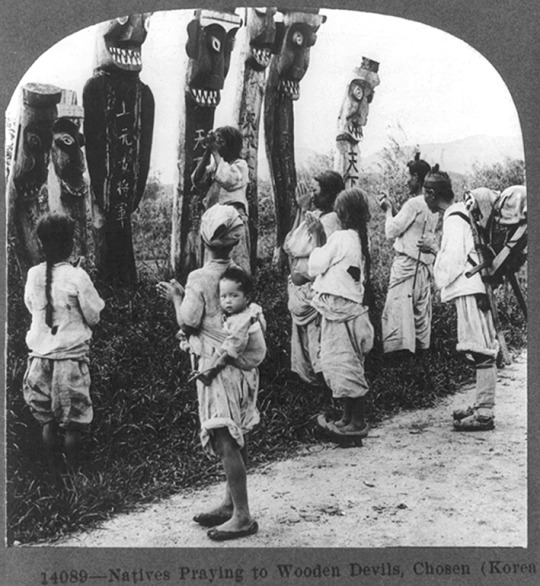
Another tradition was idol worship and shamanism. All this drumming and beating at Cheongpyeong is actually for drawing spirits into people, not driving them out. The disgusting business of putting Moon’s semen and blood into the holy wine is more shamanism. Shamans believe if you can get someone to imbibe your bodily fluids they will come under your control. By the way, Rev Moon’s children used to refer to Mrs Kim and her people as ‘the witches of Cheongpyeong.’ To put this in perspective there are still over 300,000 shamans or ‘mudangs’ plying their trade in Korea.
Conferences. After working on some of them I was shown very clearly that all those big science, arts and other conferences actually had no purpose other than glorifying Rev Moon. He wasn’t at all interested in any results from those meetings, only in how many famous people attended.
About 500 million dollars is donated each year by the Japanese church, but where does it all go? What great world-changing projects do you see it used for? Of what use are all these glorious palaces? The one at Cheongpyeong cost over a thousand million dollars. Just think what good could have been done in the world with such funds. This particular palace is now adorned with giant statues of Hak Ja Han with Jesus kneeling before her and a much diminished figure of Sun Myung Moon in obedient attendance. She has effectively created a new religion centered on herself by changing the basic teachings and proclaiming herself as the Only Begotten Daughter of God, the wife of God, the mother of God and God himself/herself. (What kind of mental gymnastics the present members are doing to believe this utter nonsense is beyond me.)
I know each national church lives in its own little bubble, in effect creating its own version of the Unification society and cherry picking which headquarters’ directions to implement. Each country also seems to hold onto its own view of the ‘messiah,’ effectively editing out anything that does not conform to this ideal. However, with the advent of the Internet this can thankfully no longer be the case.
It is the very core of the Unification Church that needs to be examined. The whole church has been built on lies. Even Rev Moon’s life story is full of falsehoods. Remember that picture of him carrying the man on his back; he let it be known for years that it was him before finally admitting it wasn’t.
The stories about Heungnam – I heard a testimony from one of those early disciples where she went to visit him and found him drinking tea in a nearby village! Chung-hwa Pak had been an officer in the military and was put in charge of the prisoners. He designated which tasks the prisoners should do. He was able to give Moon time off so they could talk together about his beliefs. Moon was not always being worked to death as he later stated.
He said he graduated in electrical engineering at Waseda University in Tokyo, but he actually only attended night classes at a technical high school.
The Church made out that Moon was arrested in North Korea for preaching against communism, but the charges were really for bigamy and adultery. Chong-hwa Kim, the married woman involved, was also jailed. His anti-communist stance came much later.
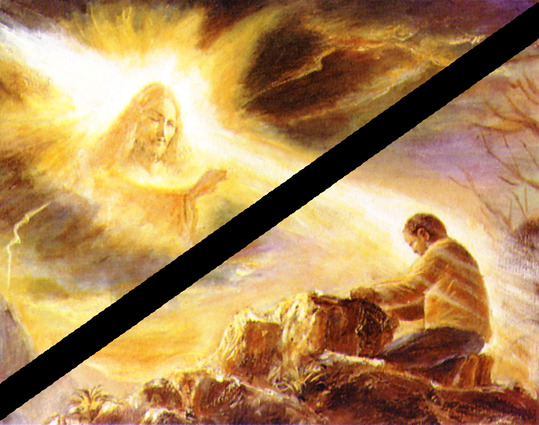
The story about him meeting Jesus on the mountainside is also untrue. It was Seong-do Kim who first told people she’d had these Easter revelations, then Baek-moon Kim claimed them as his, and finally Rev Moon – whose lies gave him away as Easter did not fall on the date he gave for that year. In his most recent account of that meeting he calls Jesus a bastard, and originally taught that Jesus should have had sex with his mother to restore the fall. He also claimed to have met and talked with Buddha, but until his first visit to India he thought Buddha was Chinese.
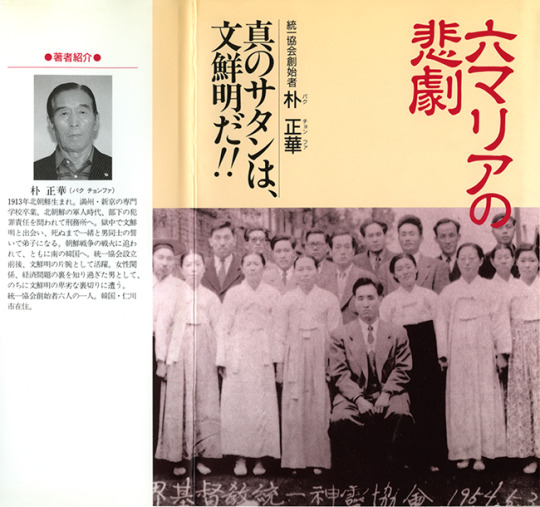
The Tragedy of the Six Marys. This book described the pikareum, or womb-cleansing, ceremonies conducted during the early years of the Unification Church. For years we were told it was untrue, but before the book came out in Japan they started giving lectures explaining the providential reasons why Moon had to have sex not only with the Six Marys, but also with all the wives of the 36, 72 and even the 124 couples. Some of the members listening to those lectures left the church afterwards so they stopped giving them, but they started them again in Korea from what I heard.
The Israel Monastery was a pikareum church with Baek-moon Kim doing the womb cleansing by having sex with the female members. Another similar one was the Olive Tree Movement started by Tae-Seon Park. This had 300,000 members and the churches had special rooms to practice the pikareum rituals. So there were plenty of examples of this grotesque idea for Rev Moon to draw on.
The holy wine ceremony is a symbolic sexual act, but for the first years of the church Rev Moon actually had sex with the female members. This is the core of the church and it is both vile and ludicrous.
I don’t say these things lightly because I needed plenty of evidence before I believed them, but I know people in both Japan and Korea who attended lectures where this behavior was justified. In America Hyung Jin and Kook Jin have admitted such things happened. It was admitted by Young Oon Kim, Papasan Choi, Chung-Hwa Pak, President Eu’s cousin (Shin-hee Eu), Annie Choi (the mother of Sam Park), Deok-jin Kim and many others. Rev Yong also went around the world giving lectures explaining the dispensational necessity of such sex practices.
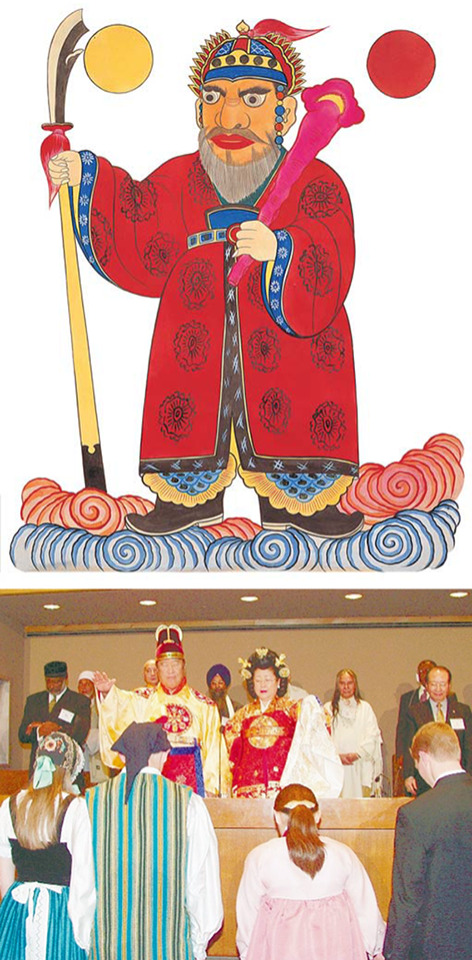
God of Day and God of Night. There used to be a shrine to this primitive Korean god to the east of Seoul. (Moon was incorporating any kind of rubbish into his mythology by the end of his life.)
I could report on even worse activities and crimes but I think this is enough for now. The Divine Principle itself is a wonderful construct, (Hyo-won Eu being something of a genius) the only problem being that it isn’t true. So much of the numerology, four position foundations, triple objective purposes and so on, is actually meaningless. There was no sexual fall and inherited original sin and Satan are non-existent. The history parallels are extremely contrived, and although interesting, prove nothing at all. There are many more aspects of the book that don’t make sense. Some parts of course are helpful, Jesus not coming to die and so on, but none of these are original ideas, so the book certainly doesn’t prove that Moon is the Second Advent.
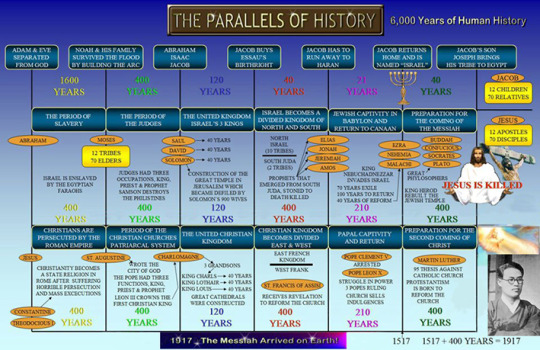
▲ Baek-moon Kim was born in 1917. He devised the parallels of history.
As predicted nothing happened on Foundation Day apart from a few pointless ceremonies. The church leadership knew this would be the case, which is why they were already telling people to prepare for 2020, the 100th anniversary of Moon’s birth. Mrs Moon is emphasizing witnessing now. (Because tithes are an ongoing source of revenue.) She recently told the Japanese wives in Korea that if they don’t do well then their descendants will pay lots of indemnity. She seems to have forgotten what her husband said on October 27, 1999, ‘No more indemnity is needed. The providence of restoration is completed.’
I personally think anyone still teaching the Divine Principle has to examine all of the above, and then ask themselves if they are just helping to propagate a gigantic destructive fraud? Thousands of people have gone through real suffering to enrich Moon and his family. Many of them had their lives ruined by being matched and married to people they could not relate to. It’s hard to believe but Moon’s church even advertised for any Korean men who wanted wives to come to one of those big blessings – just to make the numbers up, although he charged them between two and ten thousand dollars for each purchased bride. He then matched dedicated Japanese sisters to men who weren’t even church members – some of whom were unemployed drunkards or worse. (One of these wives eventually killed her Korean husband after suffering years of abuse.) Again, ask yourself whether these matchings were the action of a loving father, or an evil despot with no concern at all for the happiness and well-being of others?
If members were matched with someone they could love and be happy with, then they were in the minority, as it was mostly a matter of luck. Remember he matched physical brothers and sisters on at least four occasions that I know of, then changed the matching when he was told about it, so it certainly wasn’t God guiding him.
If people want God in their lives all they have to do is invite him in. Knock and the door will be opened. You don’t need to go to God through Moon or anyone else, and heaven is a place for heavenly people, so if you aren’t heavenly then no blessing, white robe or inseminated wine is going to get you in there.
And just to be clear, arrogance and avarice are not heavenly attributes.
I believe anyone who has sincerely tried to serve God and create a better world has certainly not wasted their time, because God will remember their efforts whatever religion they followed, but the Unification Church, FFWPU, or Hak Ja Han’s new name for it ‘Heavenly Parent’s Holy Community,’ is nothing but a despotic money-making, power-seeking, destructive scam that should not be supported in any way.
My apologies people, no jokes this time, I’m too disgusted by the whole sorry mess.
Sloe Gin
______________________________________________
Newsweek on the many Korean messiahs of the 1970s
Hwang Gook-joo and his orgies
The Divine Principle is constructed to control members
Sun Myung Moon’s Theology of the Fall, Tamar, Jesus and Mary
Sun Myung Moon – Restoration through Incest
Shamanism is at the heart of Sun Myung Moon’s church
Japanese member, Ms. K, was forced to marry Korean man she did not like
Sun Myung Moon makes me feel ashamed to be Korean
The Fall of the House of Moon – New Republic
Sun Myung Moon’s secret love child – Mother Jones
Cult Indoctrination – and the Road to Recovery
3 notes
·
View notes
Text
Bare Yourself - Iris’ POV
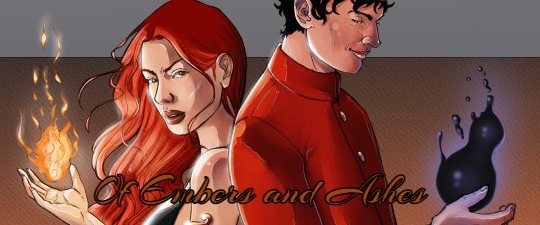
tw nudity mention, tw abuse mention
The chiming of the bells coming from St. Auodeon’s Church is enough to bring chills to me, even though it’s a nice spring day. Memories from Catholic school hit me like a train, thinking of Yvette almost. I wonder how she fares—not that it matters.
She made her choice when she wouldn’t even help me anymore, and I’m the fool for trusting her still.
My hands go to the cross necklace I decided to wear today, the cold metal unfamiliar since it has never remained on my neck until after school. I look over at the nuns, bowing in respect to the people who are entering, seeking a familiar face.
“Father Daniel.” I announce his name, walking over to him. The nuns look up and smile. Of course they remember me.
He turns, gives me a soft smile. “Ah, Iris. What a pleasure to see you on holy grounds again. It’s been what, a few months?”
“Just one month, Father. I heard the bake sale was a success.” I look over at the nuns. “Sister Harriet, you look lovely as ever.”
“Oh stop it dearie. I remember when you were just a wee little girl, scared of the ruler. And now look at you, all confident and strong.” She reaches for my wrist and I retract slowly.
“I was hoping if you weren’t too busy Father, I would like to speak to you.” I whisper the last seven words softly so only he could hear.
He nods. I don’t tell Father Daniel much. Mainly the nightmares that never wish to cease their orchestra in my skull. And for some of the acts I’ve committed. I couldn’t stop myself from crying when I told him I killed someone, but he never turned me in. Just told me to find some way for forgiveness to seek absolution. Strangely, in the world we live in, we accept it.
And this church was now polytheistic.
He takes me to the confessional booth, sitting on the side so he can appear aloof. Once I sit down, my hand goes to my cross. Rubbing the metal until it hurts my fingertips.
“Father I have felt plagued by the past.” I start off, lean my head against the chair. “For two weeks now, I have gotten nightmares involving . . .” I exhale slowly, thinking if I say his name, he’d appear like Bloody Mary. My finger goes over the rosary beads that were conveniently placed beside me, inhaling deeply. He’s not here. He won’t get me here. He won’t he won’t— “Remington, someone who had wronged me in the past.”
He hums. “What about him that plagues you?”
“I think he’s back.” I breathe the words out. “He attached me in the woods, I know he did. And my family thinks that I’m imagining it.” As the priest remains silent, I sit back and continue. “You know it’s been over three years since he died?”
“I remember that day, you had come into my church that following night. Still in your gown. Be grateful it was so dark no one recognized you.” He looks up to the sky, probably apologizing to the Gods.
“Yeah, thanks for that.” Almost three years ago, after the wedding was off the air of television due to a electrical circuit being cut, I drove the wedding limo towards this very church. When I made it here, still stained with blood, ready to confess my sins, Father Daniel welcomed me inside.
“Do you believe his spirit is unrestful, due to the nature of his death?”
“I don’t know.” Every time I think of the alternative than what I have experienced, it gives me a headache. “But due to a random Titan bringing people back, if you haven’t heard, anything is possible.”
“It frightens you, the idea of him back in your life?”
It makes me sick. He takes my silence as confirmation.
“I’ve also had dreams… memories of us. I’m not sure, but they feel like they happened. Showing me what he really was.” He’s silent the whole time. Something wet hits my hand, my fingers are burning from the rubbing of the rosary beads.
The dreams have started last year on my birthday, showing me glimpses, through motion or a whole movie-length. It’s either our happiest moments, or signs of his abuse I didn’t speak out on. That lunch scene genuinely frightened me.
And I have no idea if it was real, or he’s fabricated it years ago. My heart rattles inside my ribs, hurting me. How deep did his influence run?
“That is something I don’t think I could help with,” Father Daniel leaves his side of the booth and walks for a moment. Then he opens my door, his green eyes soft with concern. Hands me a tissue. “I think that we are done for today.”
I let go of the beads, see the paint is rubbed onto my skin, a rich brown. I must look a mess in front of him. Shaking, crying. “I—I’m sorry, I didn’t mean to—”
“Breathe, child. It is natural to let go of your emotions.” Father Daniel takes my hand, helps me out of the booth. We go out to the back of the courtyard. “There are things even I cannot assist with. Hearing one confess, hear their problems, but at their own mental expense, I feel it would be too much for their soul.” He gingerly places a hand on my shoulder, smiling at me.
“Of course, Father. What should I do?”
“I would suggest talking to someone with knowledge of the mind. Perhaps they can help.” I grimace, but he doesn’t notice, or he did. “Or journal, do something to find ways of what it means.” He inhales, continues. “Sometimes God doesn’t have the answer for it all. I hope you find peace, in what you are going through, Iris.”
I nod, hear a distant clap of thunder over on the east side. It vibrates within my skin. Hot tears slide down my face. “Thank you.”
Perhaps it’s because I was born in water, or maybe my zodiac sign, but I love the feeling of it. The floating, the light twinkling through the glassy ceiling of blue. Submerged ten feet underwater in my pool with flowers floating above, I feel a sense of peace. My hand slowly moves in the water, my eyes open. It doesn’t burn.
My body twists and glides effortlessly, hair tickling my skin. Finding peace through swimming, ballet. Things I used to do before— they can help me. Sure, I could take Father Daniel’s suggestion of seeing a therapist. But not now. Not until I get him out. Out of the physical realm and my mind.
And these damned memories. Why are they resurfacing? And are they real?
I swim back up to the surface, pushing my hair back. All that I hear is my breaths, the muffled sounds from my music, and the water moving with me in tandem. I’ve sent the servants home, and I usually pay them while having them every six months. It’s better being alone. No one hears my screams from my nightmares. No one has to see my battle.
I’ve had one person to see my vulnerable side like that, and she’s in a crypt in the frozen tundra. Per my demand. I wasn’t going to let him turn her to rubble. I trusted him.
I pull myself out of the water, pulling my hair to the side to wring it out of excess liquid. Maybe I could cook something, get my mind off of today. “Radio, off.” I command, and the radio silences, leaving me in quiet. It’s fine. I can make it one day in silence.
I wrap the towel around myself and exit out the pool room, making my way to the bathroom, and turn on the shower, nice and hot. I strip myself of my swimsuit and get in. Wash the chlorine from my hair and skin, ignoring the sting of soap in my eyes. I blink it away, scrub it out.
I don’t want to close my eyes. I don’t want to see the darkness.
I wash my back, the scars showing lines where I was hurt. Can’t believe it’s been six years since that day. As I look, I notice some look older, a bit more darker than the others. As if I had these scars before my kidnapping.
Couldn’t be my wings giving the scars. It’s a weird sense of anatomy how they come out, but never resulted in my back bleeding.
And I remember the pain of each whip, but on some parts, it hurt worse. Hitting something that was there prior.
I shake off whatever idea I have, despite the chill and continue to shower. Wanting it out of my system. Maybe… Maybe Dad was right. Maybe it was just because of his anniversary of his death that I imagined it. No. It sounded stupid as soon as I thought of it. Dad can be right on many things, but not this.
Definitely not this.
I change into some sweatpants and a big shirt once I’m done, splash some cold water on my face before walking out to the living room. I bend to the fireplace and start it up with some wood and a flame. The sounds of the ember popping a comfort to me. When I exhale, I notice how cold it is.
“Nick?” I say into the silence, before groaning. “Not in the mood for this, big brother. Next time use a lock.”
“You’re not as aware of your surroundings as you used to be.”
My instincts are quick, grabbing the fire poker and pointing it straight at the intruder in my home. He stands at the front door, arms behind his back. Clad in blue, the symbol of our clan proud in the center of his headband. A soft smile. Sad, but soft nonetheless. It’s been four months since I’ve seen the man in front of me. Four months since I almost killed him in revenge.
Not since the funeral of our friends, clan, of Frost.
“Hi, Sub-Zero.”
1 note
·
View note
Text
Plastic Trees
Arthur wasn't entirely sure where he was. He spent his morning as he usually does, reading the trades over a bowl of shredded wheat, watching the news, and looking at his wife, Edna, who was already focused on the dishes in the sink. Today was a big day. This week’s market was incredibly volatile, and there were some incredibly important stocks to consider. As he went for his fourth sip of coffee, he blinked and felt a strange temperature shift, followed by a completely different setting.
No more Edna, no more shredded wheat, no more stock options. Just a small, dingy office with brochure racks and a toothy-grinned man with a wide tie and a short torso.
It was at this moment that Arthur realized he was dead. There wasn't any major shift in his perspective or knowledge, no changing winds or rising tides; it was almost as if in a dream, where you suddenly are made aware of a concept, an idea, and it feels as real as the tree in front of you. Except then you wake up, and none of it was real, least of all the tree with its waxy leaves and styrofoam bark. If anything, the idea is the only thing that feels real at all.
Except this was no dream. There would be no waking up, no plastic realization of the falsities your mind force-fed you in your fit of sleep. He was stone-cold dead, much to the horror of Edna, who turned around to find her husband of twenty-two years face down in a bowl of milk and grains.
Arthur looked at the walls around him, covered with posters and pictures of people. Happy people. Some stood in front of statues, others near large volcanoes or fluffy clouds. He looked at a brochure nearest to him. It read: Welcome to Hell: We Promise It's As Good As You Make It!
A look of horror spread across the recently deceased’s face. Behind him, a voice breathed out a question.
"Hello Sir, have you had a chance to read our selections?"
Arthur took a second, staring at a poster of a small cat clawing to a tree branch, coaxing the viewer to " hang in there".
"I...I'm in Hell?"
The man with the coffee-stained teeth smiled, leading Arthur towards a desk and a laminated book.
"Well, no. Or yes. It depends. We have lots of options. Would you come have a seat?"
Hot, salty terror washed over Arthur. The high, obsidian spires of an unknown hellscape curled around him like tendrils of a great fire. The crackling screams of millions of tortured souls closed in like a headache until he couldn’t take it anymore. A large, hoofed creature, with wings like a bat and a snout like--
Arthur let out a long breath, a cold sweat on his forehead. The toothy-grinned man held his familiar posture.
“Not to your liking?” He said.
“Not so much,” Arthur gulped.
The man thought for a moment before flipping the page.
“Hmm. Perhaps this one!”
A large, spiraling vortex of color and light washed over Arthur, sending him into a state of spiritual bliss. Orgasmic images of the future, the past, the very foundations of time and space were known to him in this moment. The questions of the universe, answered.
And on and on went Arthur and the Salesman, through worlds of torment and turmoil, sacrifice and satisfaction, through all the fetishes and fantasies of the people of our world, in search of the perfect period on the note of life.
Arthur realized quickly the truths of the afterworlds. This quilt of options was crafted by the needs and wants of his fellow man, all of their dreams in life, come to reality as a result of their last thoughts. In this moment Arthur felt powerful, but in the next he felt a question. It nagged at him in the back of his mind, slowly at first, and then more as he thought. More as he saw. Worlds of horror and hopelessness, of anger and spite. He had one question.
“Excuse me, but I’m a bit confused.”
“What’s that?” Asked the salesman,
“These options all exist because someone lives in them, yes? These places came about as a result of people’s afterlives?”
“Well, yes, you could say that.”
“Then why did they pick them? Why would you want to live in Hell, when Heaven exists alongside it?”
The salesman smiled.
“A fair question. Our aim is to give release in death. Give people what they want. What they’re expecting. A fair amount of people over the course of history have believed wholeheartedly in dark and depressing fantasies. If in your mind, the afterlife should consist of good, evil, and the weight of your heart at the deciding scale, then we give that to you.”
“But they would never pick the worse option, would they?”
“They don’t want the options in the first place. They want reassurance.”
Arthur thought about the implications of this.
“Why do I get the option, then? I consider myself to be...well at least relatively Catholic”
At this, the salesman stood, excited.
“There it is, Arthur! A good question. Your religion, see, is Catholicism, though it’s not your faith. You don’t believe in it, not truly.”
“Now, that’s not quite fair.” Arthur faltered for more of a rebuttal than that.
“And yet, you have strong beliefs. The free market. Consumerism.” A devilish grin swept over his face. “You believe in choice. Beat the system, as they’d say.”
For a moment, Arthur’s life flashed before his eyes. His decisions, politics, beliefs. Is this really the best way to describe his life? Apparently it was. And further, what would he pick? Where would we spend his time?
Before he had a chance to answer this question the Salesman turned another page in his book.
“Arthur, I sense your apprehension, and I for one think you deserve the answers you seek. Would you mind visiting one last location?”
“Sure,” Arthur muttered, lost in thought.
Large, oaken veins coursed mightily up the great bark of an overwhelming tree. Complex branches tangled between themselves, sporting leaves of deep and ancient green. Thick roots pulsated like tendrils, wrapping themselves deep into the soil on which Arthur and the Salesman stood. A vast catalogue of images and feelings wrapped around his brain. They came from the tree; from its leaves and its roots. Arthur couldn’t quite find words to describe the wonder encapsulating his mind and body.
"This is the single greatest testament to the accomplishments of the Homo Sapien. This is what you pride yourself so heavily on."
"What is it?"
"It has many names, many faces, but you would understand it best as human consciousness.”
The images were overwhelming, but started to quantify themselves as things Arthur could grasp.
At first, they were simple. He felt a hot burning, one that made him feel dizzy and warm and fulfilled. It quickly dissipated, leaving him with a dull, grey ache. His head went fuzzy. His knees buckled.
These concepts took greater form, first as colors. He was an infant, with the soft, pink, wonder of how the warmth of other humans feel. He saw his father. He smelled like aftershave and work. His mother looked an angel, with smiling brown eyes. He swam in them.
He watched himself age, his complexion change. His first love, then his first wife, then his daughter. He wept and screamed. He grew weak.
The images changed, less personal now. Visions of death and what lay beyond it entombed him. He saw an infinite spread of hellscapes and ethereal nothingness. He saw all the book had to show him and more.
“These places are like in the book.”
“The very same. These are your options,” The Salesman looked at peace, eyes closed.
“I thought the images of afterlife were from the minds of other people, not my own.”
“Truly, Arthur, is there any difference? The images of others, their beliefs and knowledge is in your mind, your human understanding. As a hatchling turtle or young goat knows the instincts passed down from their ancestors, you too know yours. The instincts of the human race are social, they’re abstract. The human understanding of life is not isolated to your own mind.”
“I thought the options in the book were real places, and now you say they come from inside my head. I don’t understand. Is this real?”
The salesman chuckled.
“Does it matter? If it helps, then no. These places are inside the mind, not cosmically tangible. They are explanations for the mind, so the soul can rest.”
“An explanation of what?”
“Of what it means to die. The human mind knows one thing; existence. You have lived for an eternity, Arthur. 62 years isn’t long for a rock or a planet, but to you, it’s forever. The mind won’t be so easily tricked into shutting itself off. It’s as difficult as teaching a bird not to fly.”
“So all this, this is just an...an escape? Like a dream?”
“Exactly like a dream. You are dying, Arthur, and soon you’ll have nothing left. Your brain has been existing for a very long time, and it needs to rest.”
Arthur could tell that his time here was nearing. He needed to make his decision.
“What are you?” Arthur asked, looking for the first time into the Salesman’s eyes. They were dark, and loving. Full of understanding.
“I am tired. And I must rest. Do you have your answer?”
Arthur did.
Arthur sat at his kitchen table. He spent his morning as he normally does, reading the trades over a bowl of shredded wheat, watching the news, and looking at his wife, Edna, who was working hard scrubbing last night’s lasagna dish. He stood, and walked over to her. He wrapped his hands around her back, kissing her with passion. He was happy.
3 notes
·
View notes
Text
The Not-So-Amazing Mary Jane Part 4: The Death of Mysterio
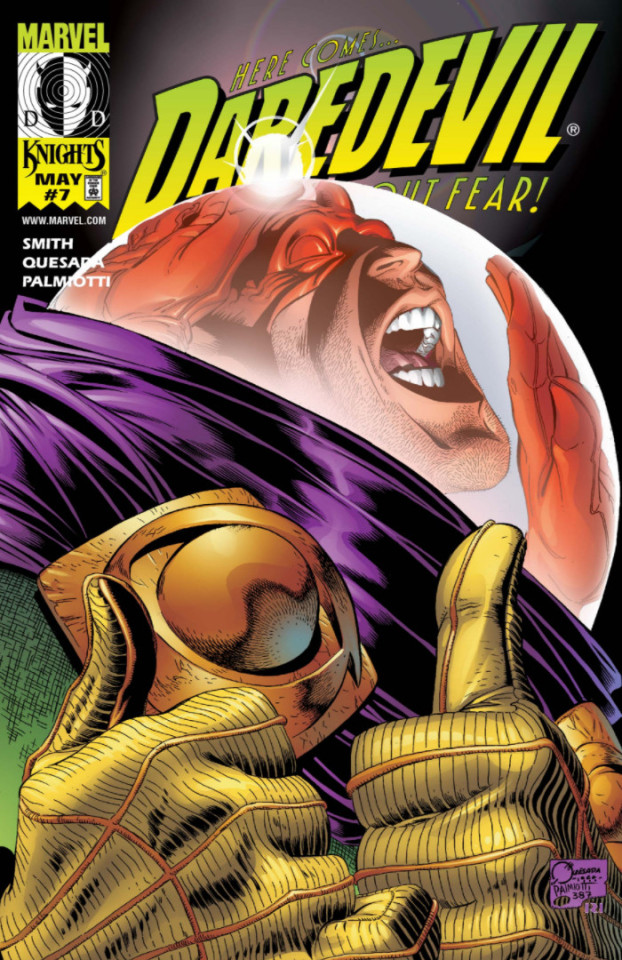
Previous Part
Next Part
Master Post
Last time we began our look at the life of Mysterio. In this post we’ll continue our retrospective, starting with the 1990s.
The 1990s: Helping Harry
We come now to an event that chronologically would’ve happened in the 1990s but was retroactively established in 2009.
During Brand New Day (ASM #581 specifically) we learned via retcon that Mysterio was responsible for faking the death of Mary Jane’s close friend, Harry Osborn. He did this on behalf of his Harry’s, father Norman.
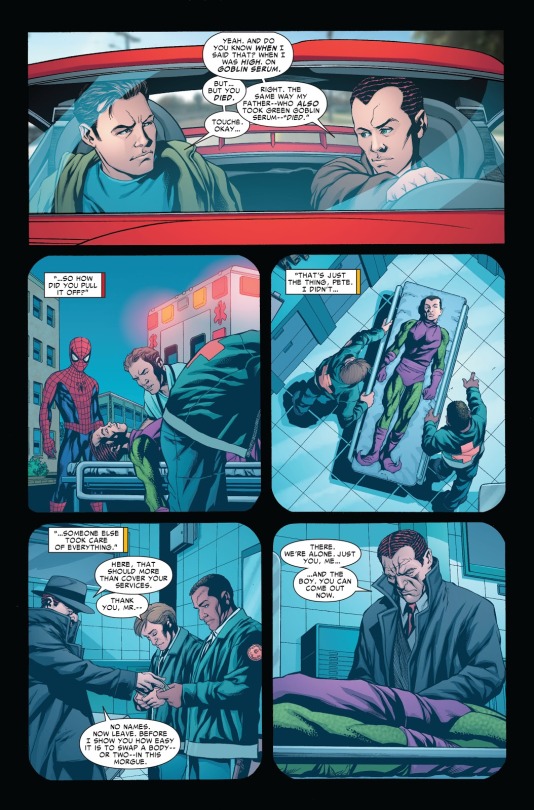

I won’t recount the entire Harry Osborn Saga for you, but suffice it to say that Harry’s descent into madness was incredibly stressful for Mary Jane and Peter.

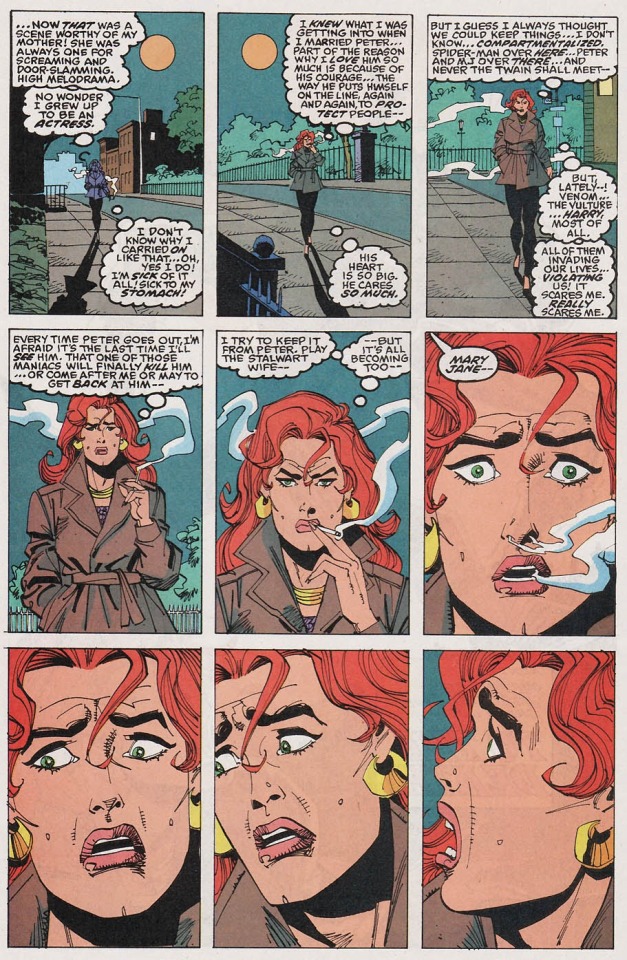

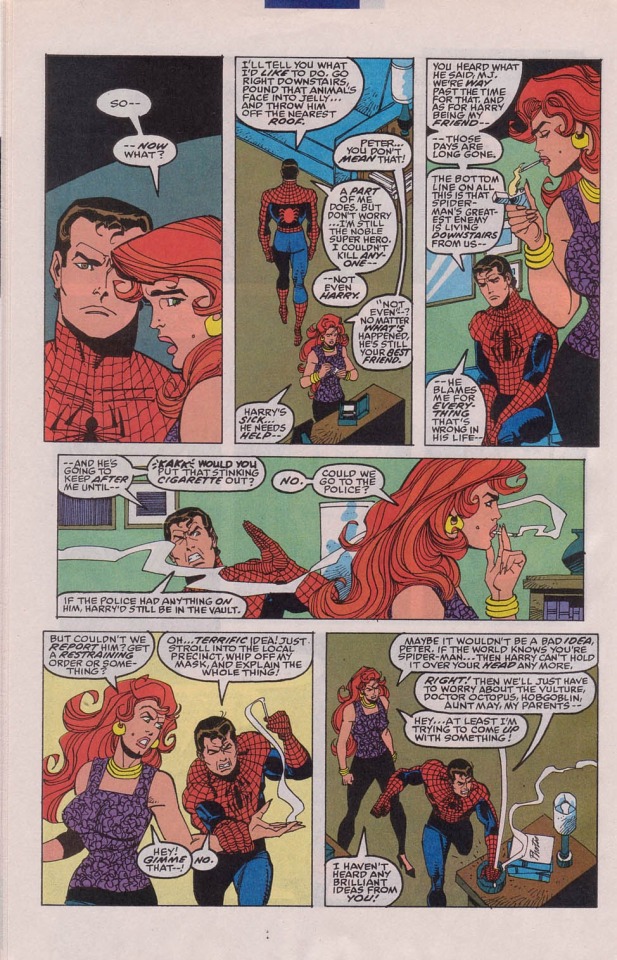
In spite of what Harry had become the couple were grief-stricken by his death.
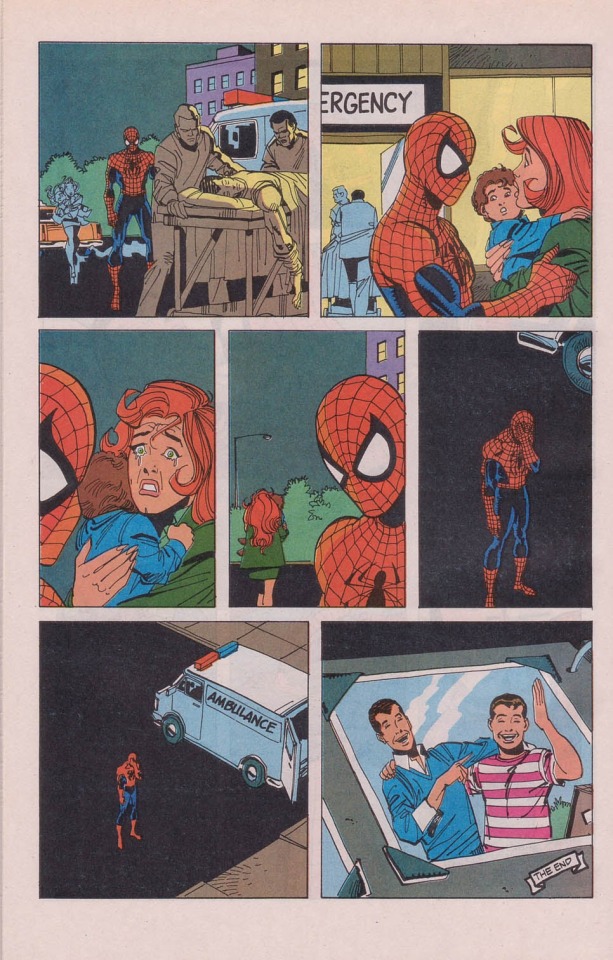

MJ in particular was so affected by his death she requested Peter take a temporary break from hero work.


That same day Carnage began a killing spree alongside several other highly violent super villains. MJ’s grief over Harry coupled with the anxiety that Peter might meet a similar fate contributed to straining her and her marriage further, albeit briefly.

At the time Peter and MJ were living in an apartment owned by the Osborns. Following the Carnage crisis, Harry’s widow Liz Allan evicted the Parkers as a direct result of Harry’s death. Obviously this added to the Parkers’ distress.

In general Harry’s death left short and long-term wounds for MJ and people she loved and Mysterio was directly implicated in that. As he had done with Aunt May he had caused entirely unnecessary pain and grief out of pure selfishness, even if he was merely a ‘hired gun’ to that effect.
We never see MJ learn this information but given how one of her friends seemingly came back from the dead it’s something she’d obviously want to know about and since she is so close to Peter and Harry it’s extremely unlikely they wouldn’t have told her.
I will admit that this example is a contentious one as it doesn’t really make sense for a loooooooot of reasons and the story doesn’t 100% confirm that Harry (and by extension Peter and anyone either of them might tell) knows Mysterio was responsible.
So it could be argued that as far as Harry knows an unknown ‘someone’ covered his tracks (presumably his father) but he’s in the dark regarding Beck’s involvement.
However it is food for thought, yet another thing that would realistically cause MJ to hold Mysterio in lowly regard.
Duel with the Devil
Lets move away from Beck’s encounters with Spidey and towards those he had with Man Without Fear, Daredevil.
The first of these occurred in Daredevil #358, set shortly after the Onslaught crossover. In the wake of Onslaught’s attack and the presumed deaths of the Avengers and F4 Beck set up a fraudulent insurance scheme to con people out of their money. That isn’t too relevant beyond it once again proving what an exploitative dickbag Mysterio is. More importantly though, it sets up his next encounter with DD.
I am of course referring to the ‘Guardian Devil’ story arc that ran through Daredevil volume 2 #1-8.
This arc is the absolute nadir of Mysterio’s ‘bad behaviour’.
Developing terminal illnesses and with just a year to live, Beck sought to go out with a bang. Initially he intended to make Spider-Man the centre of his plan but due to confusion (arising from Ben Reilly’s tenure as Spidey) he targeted Daredevil instead. Learning personal details about Daredevil’s life (including his secret identity) Beck built a plan designed to attack Matt Murdock’s sanity (evoking his scheme in ASM #24). In particular his plan hinged upon Murdock’s Catholic beliefs.
A key component of his plan was the abduction, drugging, artificial insemination and gas lighting of a Catholic teenager named Gwyneth.
Although her faith led Gwyneth to believe her pregnancy was divine in origin, she was understandably emotionally distraught after discovering herself pregnant and her pregnancy caused major strife with her parents. To ensure Gwyneth’s parents wouldn’t get the chance to investigate the matter, Beck hired some thugs to murder them. Witnessing her mother being beheaded over the body of her father Gwyneth fled with her baby, terrified as the thugs pursued her.
Out of desperation she was temporarily forced to sleep on the streets with her baby. It was at this point that Beck used his illusionary skills to trick her into seeing a ‘divine vision’ that led her to Matt Murdock. Passing her baby onto Matt she fled again hoping to lay low. However Mysterio’s men found and promptly murdered her. Her body was buried somewhere it wouldn’t be found.

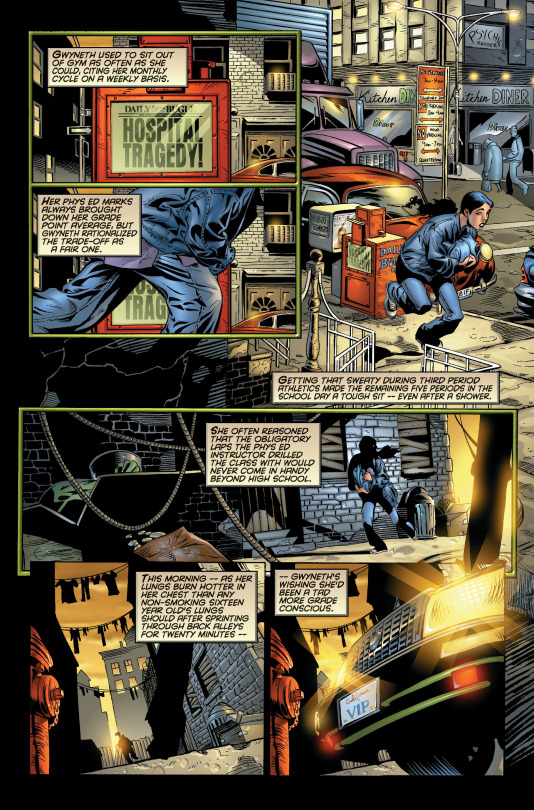
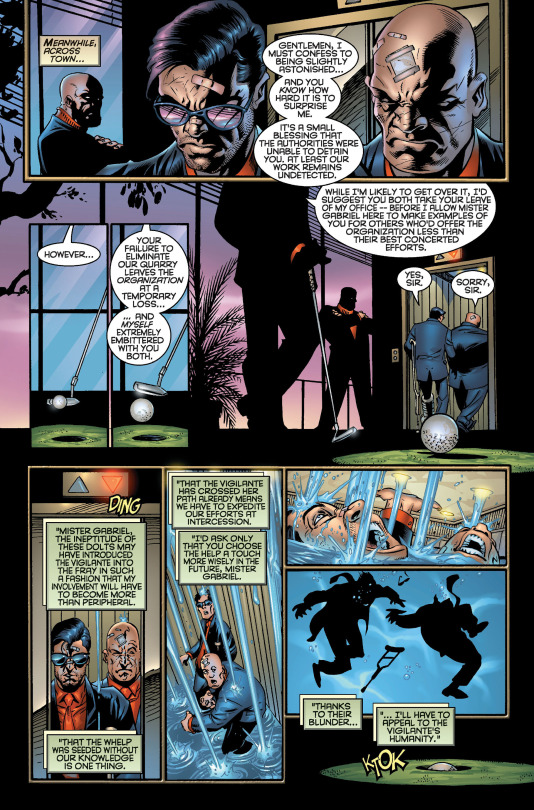


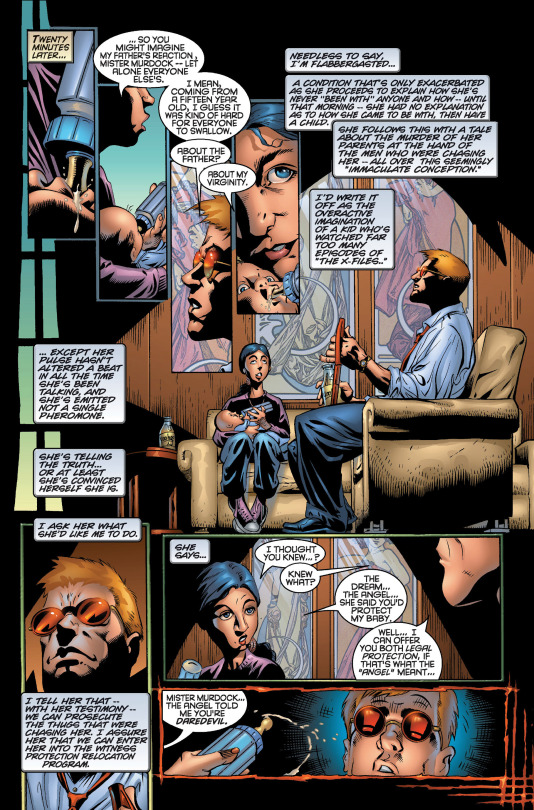
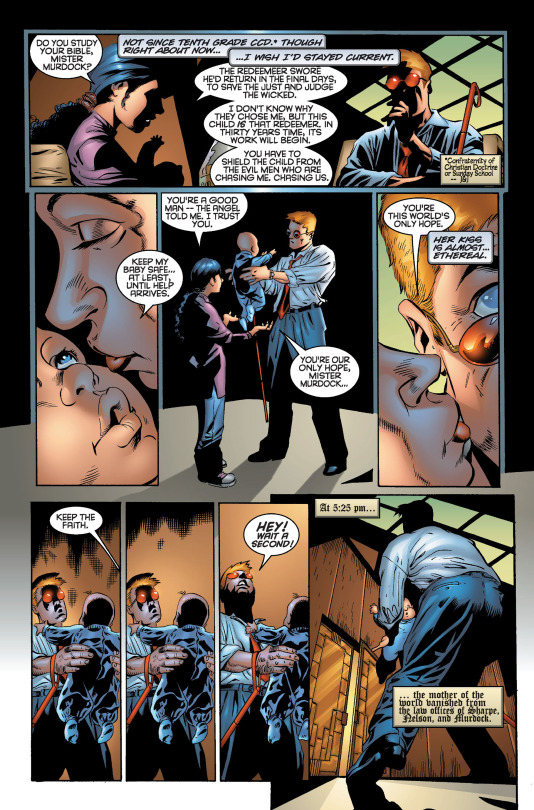
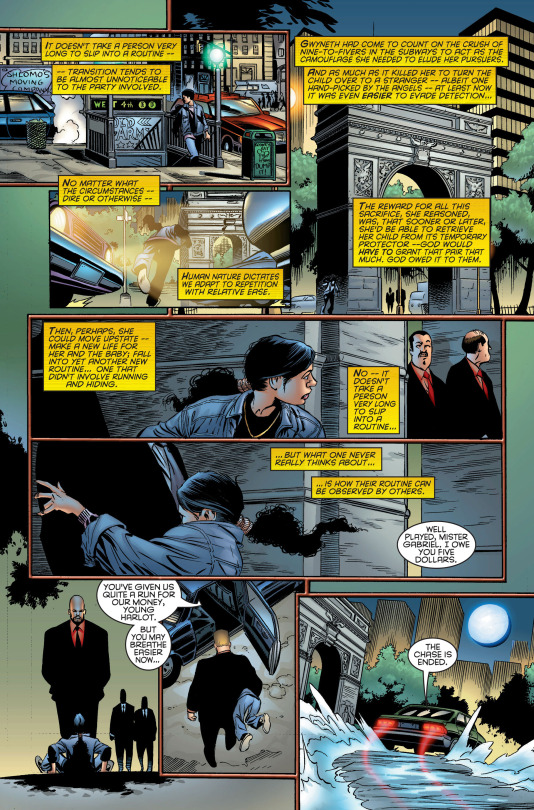
Just to bottom line things so far, Mysterio knowingly:
Abducted
Drugged
Sexually assaulted
Orphaned
Traumatised
Hunted
Distressed
Manipulated
And murdered
A TEENAGED GIRL!
Just saying…
Anyway, there was more to Beck’s scheme than just Gwyneth.
He also murdered an innocent old man and for his fortune and impersonated him to enact the next part of his plan. This entailed slipping Murdock drugs that made him susceptible to Beck’s cover story. According to this story Gwyneth’s baby was in fact the literal anti-Christ and misfortune would befall Matt the longer he was around the child.
To help make his story more convincing Beck began targeting Matt’s loved ones.
He hired a drug-addicted actress named Lydia Mckenzie to seduce Matt’s best friend Foggy Nelson, who was already in a relationship. On Beck’s orders she also slipped Foggy a drug that caused him to perceive her as a demon and believe that he had pushed her out a window. In reality Beck ensured she died of an overdose, shoved her out the window himself and over all framed Foggy for murder.*

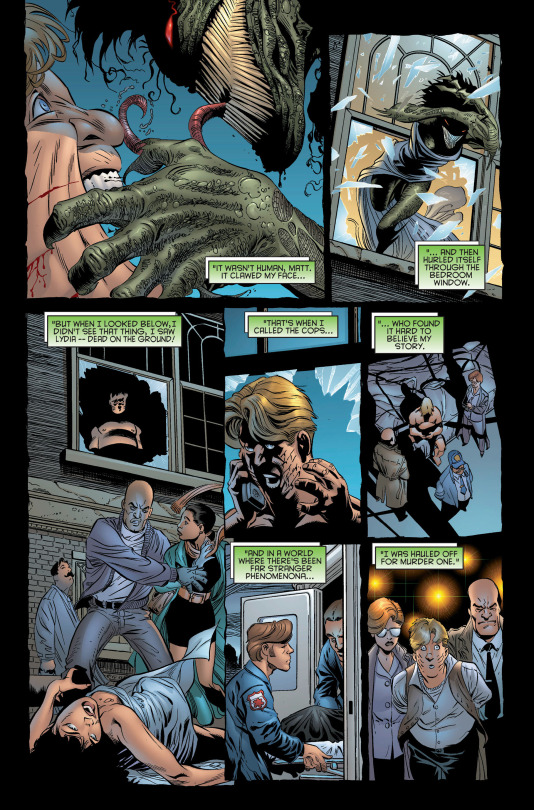

He also posed as a doctor and (I am dead serious right now) tricked Matt’s girlfriend Karen Page into believing she had AIDs. Remember this story was from the late 1990s so this was a BIG deal.

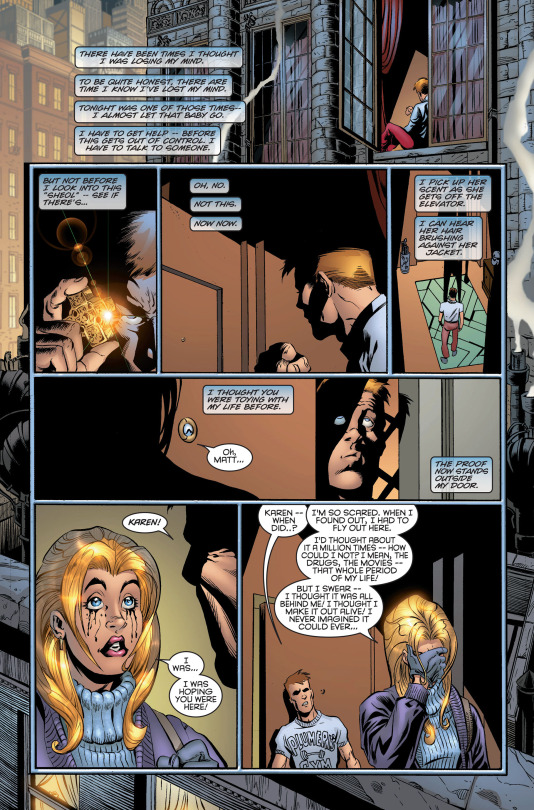
As a result of these machinations and the drug Beck slipped him, Daredevil genuinely tried to murder Gwyneth’s baby.
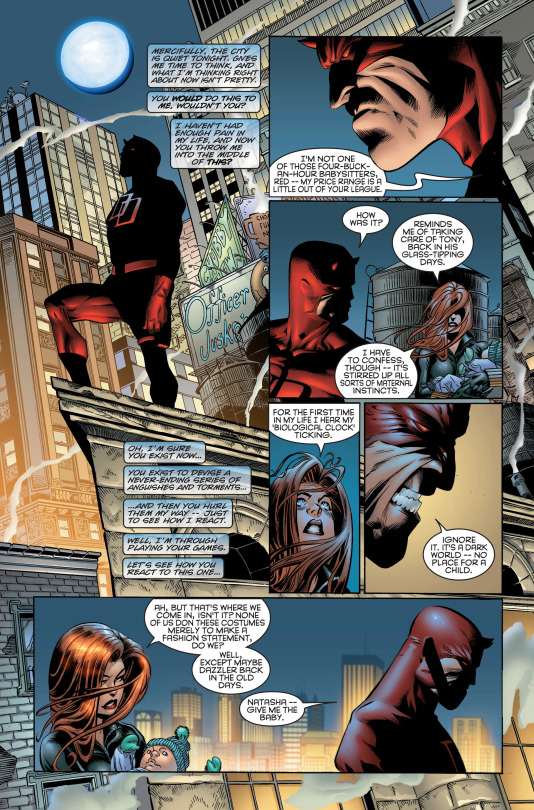

Mysterio later hired DD’s long-time nemesis (and known psychopathic assassin) Bullseye to abduct Lydia’s baby. He cared little about the inevitable collateral damage Bullseye caused in pursuit of his target. And by ‘collateral damage’ I mean the serious injuries to several people (including Matt’s mother, the nun Sister Margaret) and the murder of 11 people. Karen was among the casualties, traumatically dying in Matt’s arms.



Matt was so distraught over Karen’s death that he briefly contemplated suicide.

Angry and determined, Daredevil zeroed in on Beck’s hideout where Beck had a gauntlet prepared for him. One of the obstacles Murdock faced was an illusion of Karen stuck in Hell. Undoubtedly this was the single most spiteful and hurtful of the things Matt endured in Beck’s gauntlet.

When Daredevil and Mysterio finally come face to face, Beck revealed Gwyneth’s baby trapped in a soundproof chamber where the air was rapidly running out.

So…Mysterio is a-okay with seriously endangering and potentially murdering a baby.
…Again…Just saying…
Mysterio finally revealed his master plan to Daredevil, intending to push a broken Murdock into murdering him.
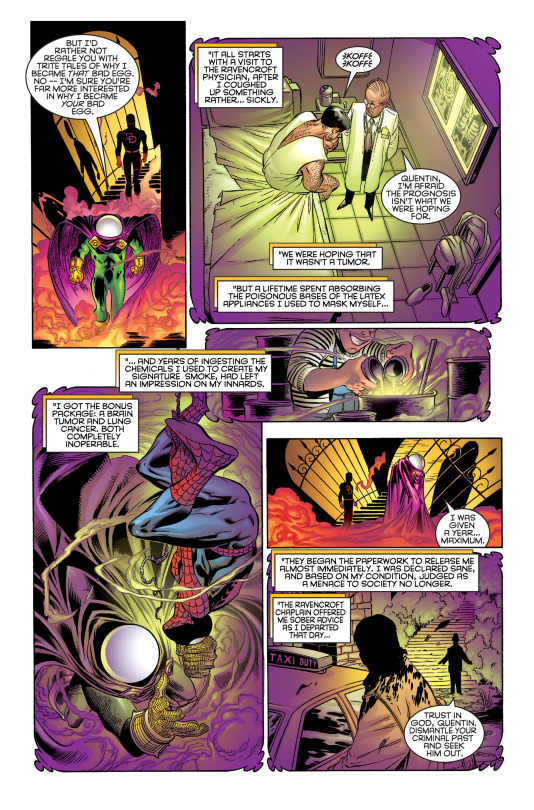



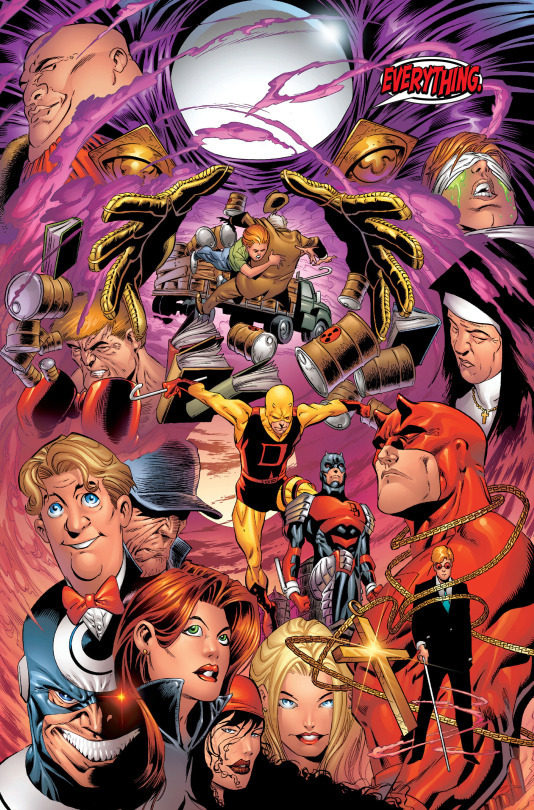




When DD refused Mysterio opted to emulate Kraven the Hunter and blow his own brains out; a fact that became public knowledge.**
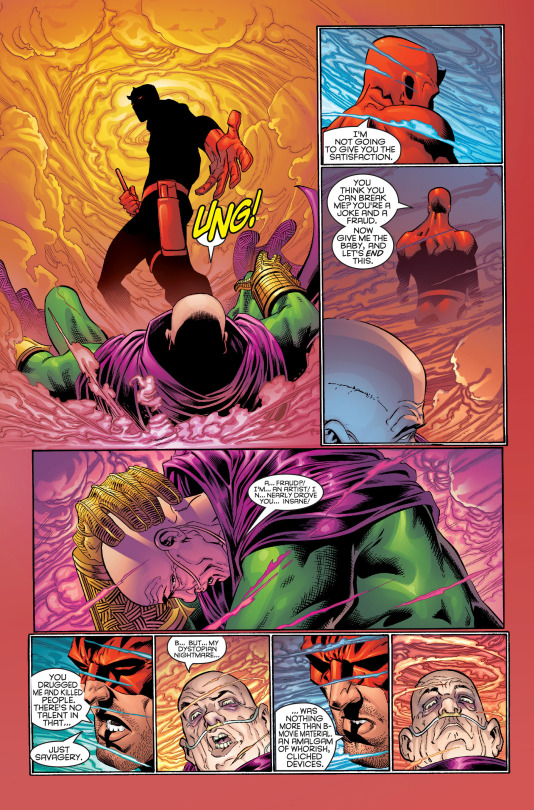
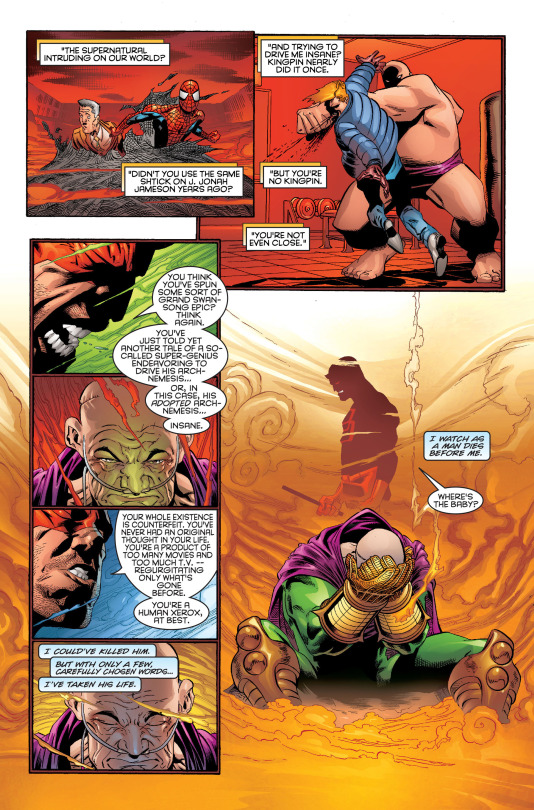
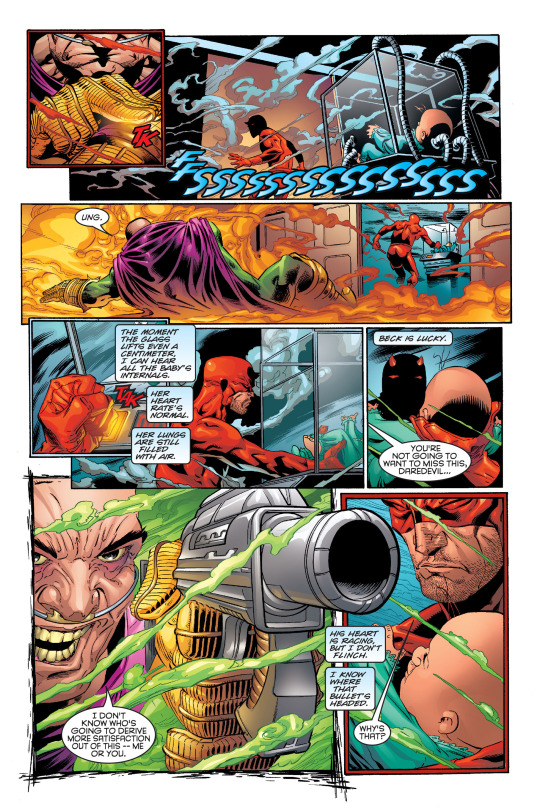
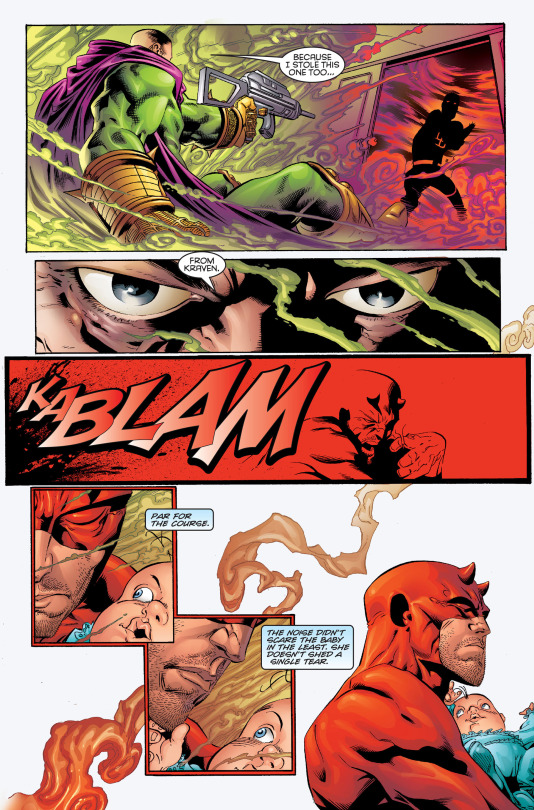

Now sure, we the audience might be aware of all these awful things Beck did in ‘Guardian Devil’; but how much does MJ know about them?
The potential answer is all of it.
The definite answer is more than enough of it.
Towards the start of Daredevil v2 #8 Peter is shown watching a news report about Mysterio’s death. The report acknowledges Mysterio committed suicide and that the bodies of his criminal crew had been found. It also refers to ‘a related story’, that of Foggy Nelson being freed from prison after being framed for Lydia’s death. This implies the news were aware Mysterio was implicated in Lydia’s death.
During this scene MJ is not only within earshot of most of the report, but she even consoles Peter that Mysterio was (in her own words) ‘a lunatic’. She acknowledges he was responsible for the deaths of ‘all those people’. She continues by saying Beck doesn’t deserve Peter’s ‘pity’ and that he should ‘not mourn for Mysterio’. She concludes by telling him to mourn someone ‘who deserves it’ instead.

Then they go to Karen Page’s funeral, which they were clearly preparing for during the news report.
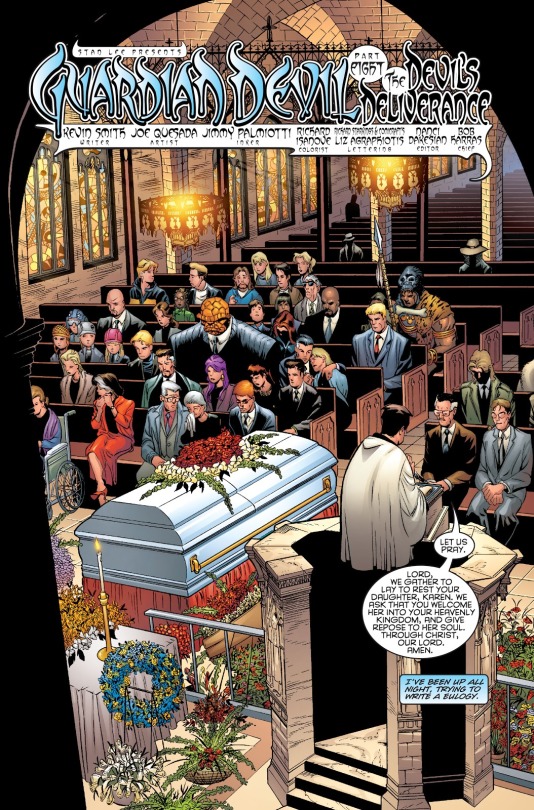
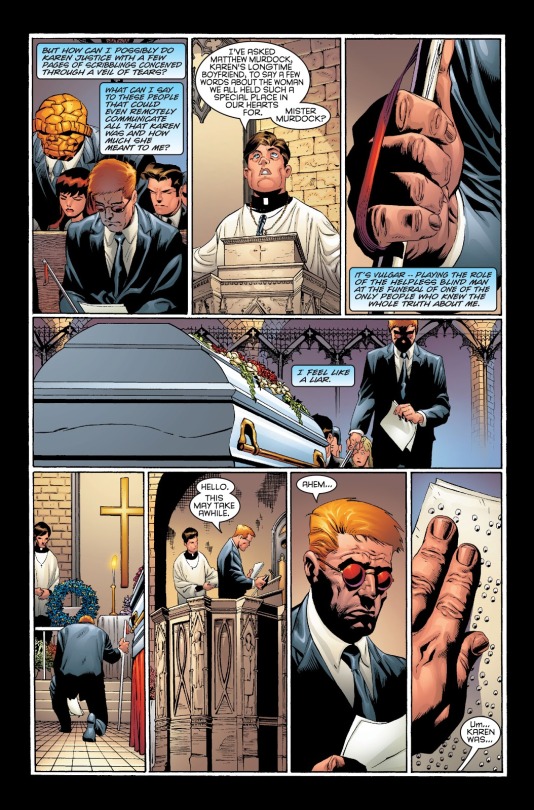
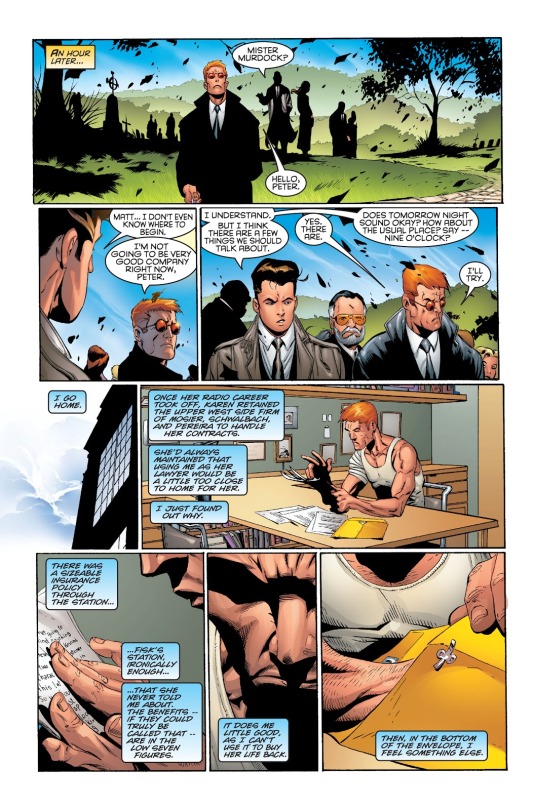
Their attendance of the funeral and the scene leading into it heavily implies that Peter and MJ were aware that Mysterio’s was implicated in Karen’s murder.***
Later in the issue Spider-Man talks to Daredevil in order to fill in the blanks.
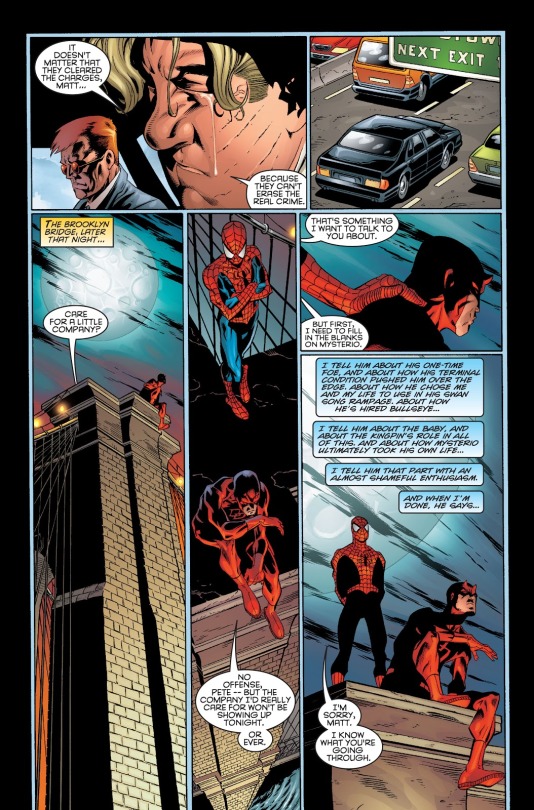
We do not know for sure if Spider-Man relayed any of this information to Mary Jane, but it’d be highly likely.
He typically confides in her and uses his conversations with her to process things. MJ herself often asks him to share if she sees something I bothering him.
In this case Peter would especially want to inform MJ of what happened and MJ would especially want to know.
This is because the incident entails one of Peter’s foes essentially manipulating and killing the lover of a fellow street level hero. In fact the only reason Daredevil was targeted at all was because Beck didn’t realise Peter was still around as the original Spider-Man. In other words Peter and MJ could very well have been in Matt and Karen’s shoes.
For the sake of future reference and general safety it’s totally unbelievable that Peter would not have told MJ about this at some point. After all, forewarned is forearmed and MJ has found herself targeted by people with powers of deception like Mysterio in the past, e.g. Venom and the Chameleon.****
I admit there is no hard proof that MJ knows all the details about Mysterio’s actions, but it’s rather unlikely that she wouldn’t if Peter did; it’s just common sense. Therefore we don’t need to see such a scene any more than we need to see the characters going to the bathroom or paying their taxes. It’s just such basic common sense we can presume it happened.
Even if you don’t think so, at the bear minimum Mary Jane definitely knows Mysterio is guilty of murder, accessory to murder (of someone in a similar relationship to herself), gas lighting and mental abuse. The result was that she personally regarded him as mentally unhinged and unworthy f sympathy.
If you only bear in mind ONE of the stories we’ve looked at so far, remember this one. In particular because the story is explicitly referenced in Amazing Mary Jane #1.
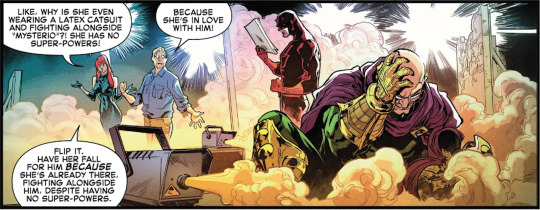
The 2000s: Rebirth of Berkhart
As far as those in charge of Marvel were concerned, Beck was genuinely dead and that was the status quo throughout the 2000s.
Nevertheless there are two very noteworthy events from MJ’s point of view that should be taken into account.
The first occurred in ASM v2 #7-8. In this story ‘Mysterio’ abducts the Parker family along with some of their friends and plugs them into a virtual reality machine because the Matrix was really popular back then. His intention was to deduce Spider-Man’s true identity by monitoring their interactions in the virtual world.



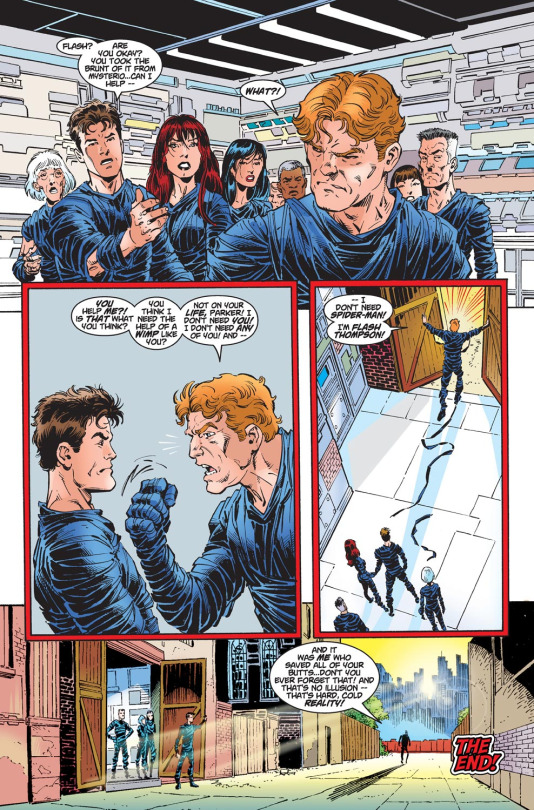
This virtual world happened to be shaped by the subconscious of Flash Thompson, meaning everyone was contorted to fit into his wish fulfilment fantasy. This included MJ’s friend Jill Stacy becoming a seemingly resurrected Gwen Stacy, MJ herself being gaga over Flash and wanting to marry him (the climax actually occurs at their wedding) and MJ’s husband being wheelchair bound.
Realistically the fantasy world (along with the realization they’d been abducted) would’ve obviously been upsetting for Mary Jane. Indeed it would’ve been upsetting for everyone else too (including fragile old Aunt May) even if it didn’t leave long-term scars. With no equivocation, this upset was directly ‘Mysterio’s’ fault.
I say Mysterio, but in actuality (and due to retcons) it was Beck’s ‘apprentice’ Danny Berkhart. However, Mary Jane couldn’t have known that (even the writers didn’t!), so from her point of view it would’ve seemed likely that Beck was responsible and merely faked his death once more during the ‘Guardian Devil’ arc.
Later during the ‘Mysterio Manifesto’ mini-series Spidey and Daredevil discovered the truth behind Berkhart’s scheme. This is tangentially important to bear in mind because of what we are going to look at next, namely Friendly Neighborhood Spider-Man #12.
The specifics of this story aren’t all that relevant. All you need to know is that following Spidey publically unmasking Midtown High (where he worked as a science teacher) was besieged by three Mysterios. One was a new villain named Francis Klum, who had a vendetta against Spider-Man. Another was Berkhart who took issue with Klum’s claim to the Mysterio mantle. And the third was Beck himself, literally sent back from Hell.
After deducing an illusion of MJ as a fake Peter calls the genuine article to confirm her safety. During their conversation it’s revealed that MJ believes Mysterio to be dead.
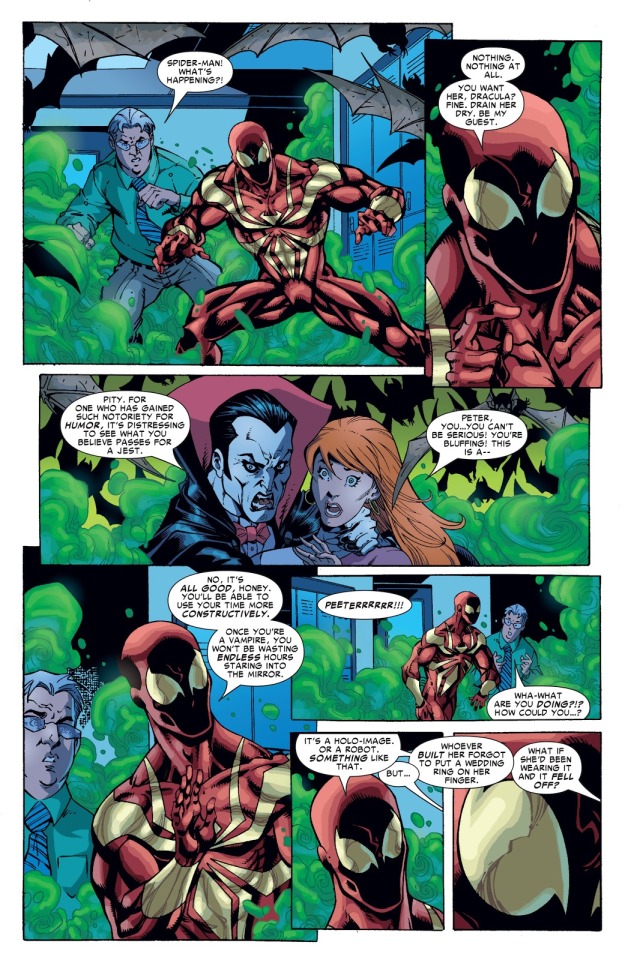
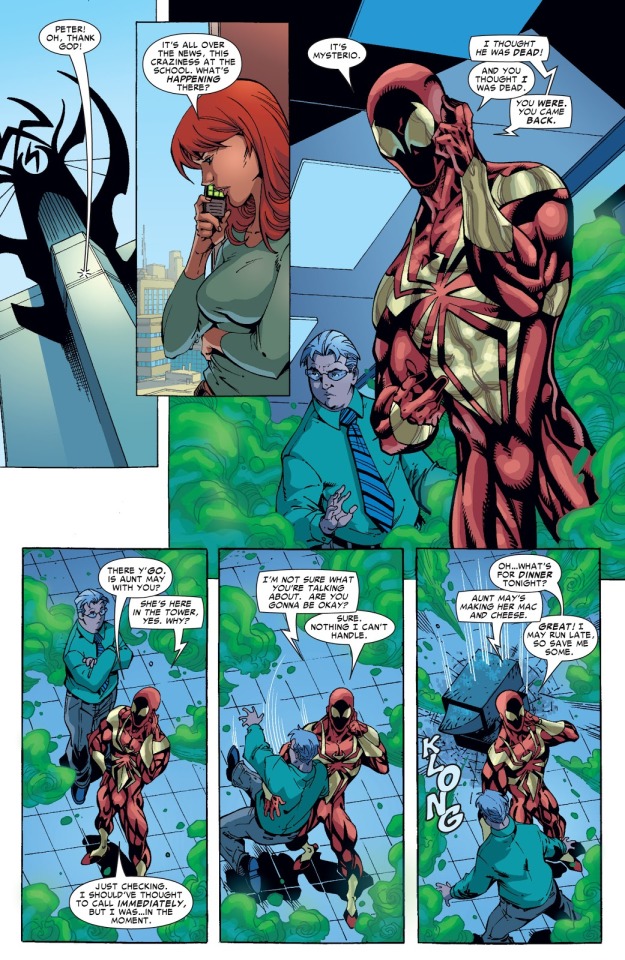
First of all, this scene establishes that MJ was definitely aware Mysterio had targeted her husband (again!) and potentially endangered school children in the process.
Second of all, from her point of view it’d seem likely that Beck would be behind this. I grant you that's a point that can be debated. However in her conversation with Peter he seems to imply to her that it is the original Mysterio.
Finally (and most importantly) MJ’s dialogue reveals that previously believed Beck was dead. Between ‘Guardian Devil’ and ‘Beck’s’ presence in ASM v2 #7-8 Mary Jane would have no reason to believe Beck hadn’t simply faked his death again. That is unless Peter told her otherwise.
Remember, Peter learned the truth in the ‘Mysterio Manifesto’ when MJ was believed dead, which occurred after ASM v2 #8. This means that Peter must have informed her of this discovery after she was revealed as alive.
This is a point less about how bad of a person Beck is and more about proving that Peter keeps MJ abreast of noteworthy events in regards to his villains. Thus it is absolutely illogical to presume MJ wouldn’t similarly be in the know about most events Peter experiences pertaining to his villains; or at least the really noteworthy ones.
Let’s leave it there for now. Next time we will finish our coverage as we enter the 2010s.
*‘Fun’ fact. In addition to her close friend/ex-boyfriend Harry Osborn struggling with a drug addiction (which indirectly led to Gwen’s death) another of MJ’s friends was well acquainted with drugs.
Her name was Lorraine and she helped MJ learn the ropes when she was first getting into modelling. Unfortunately after overdosing in the Parker residence, MJ learned Lorraine had a major cocaine problem. MJ was so upset by this she asked Peter to sort out Lorraine’s dealer, only to be distraught when Lorraine simply went to someone worse and very nearly died as a result.

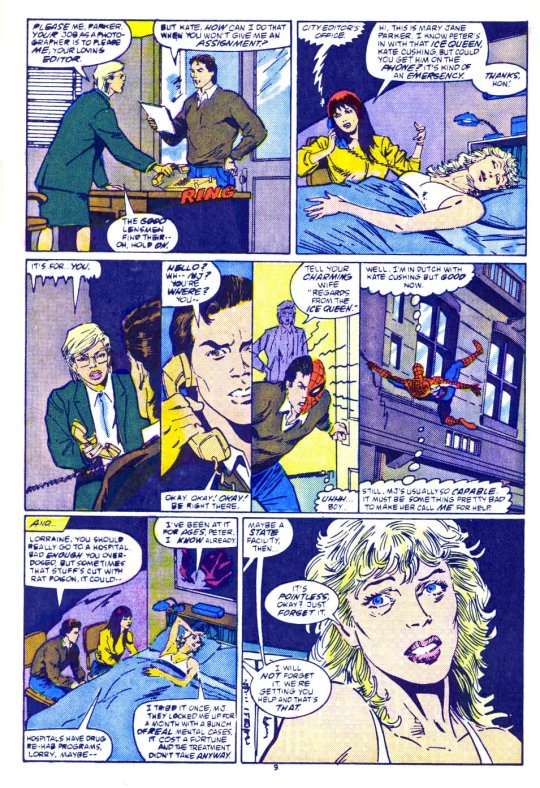
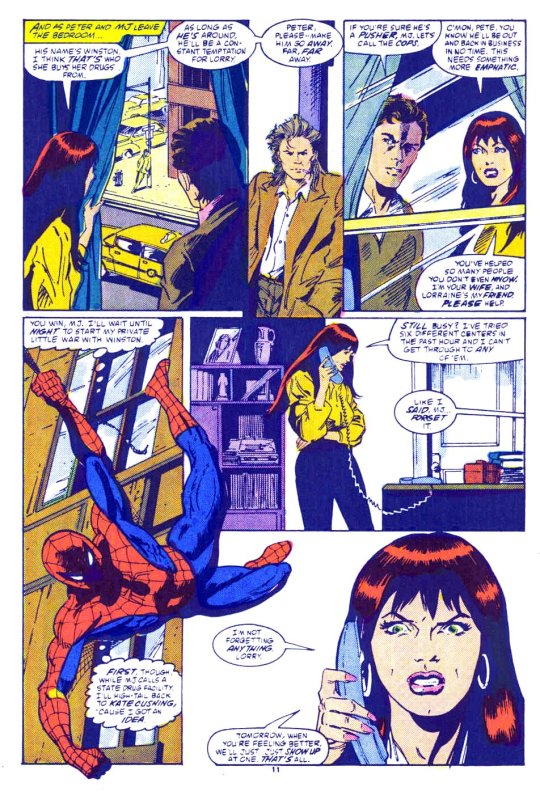
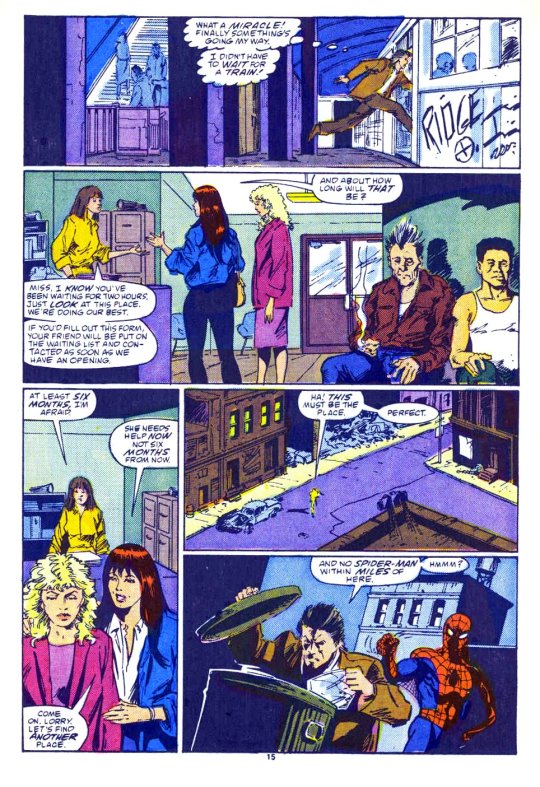
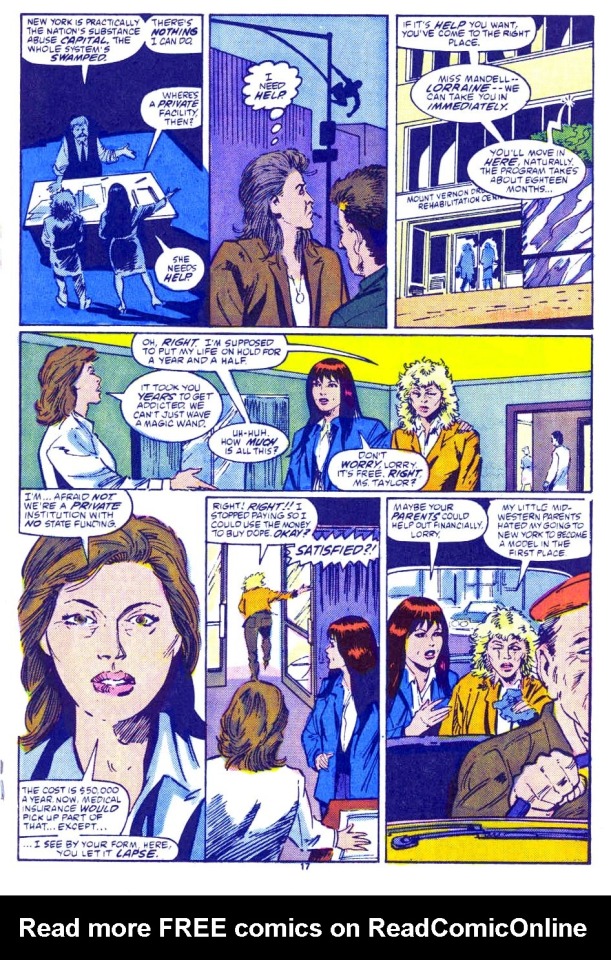
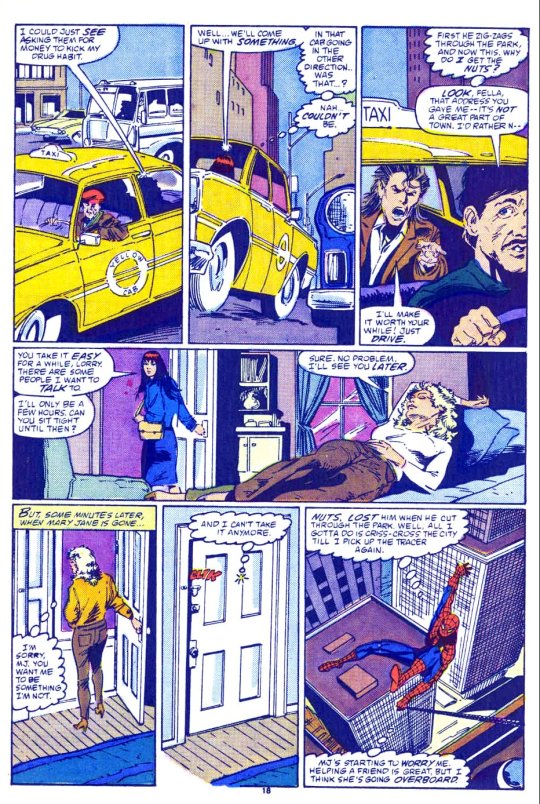


Lorraine survived and MJ was determined to help her through her problem.
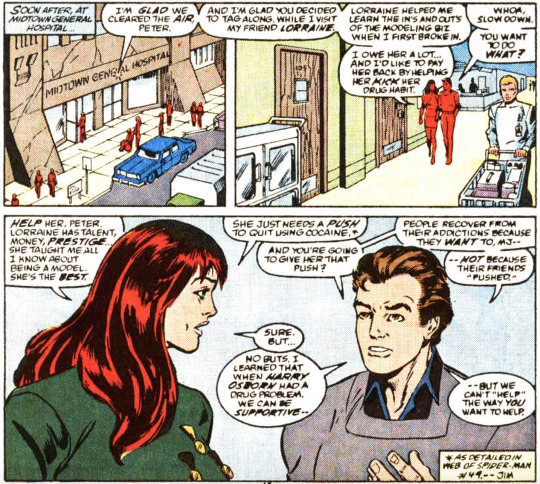
Oh and MJ herself struggled for a little while to kick cigarettes.


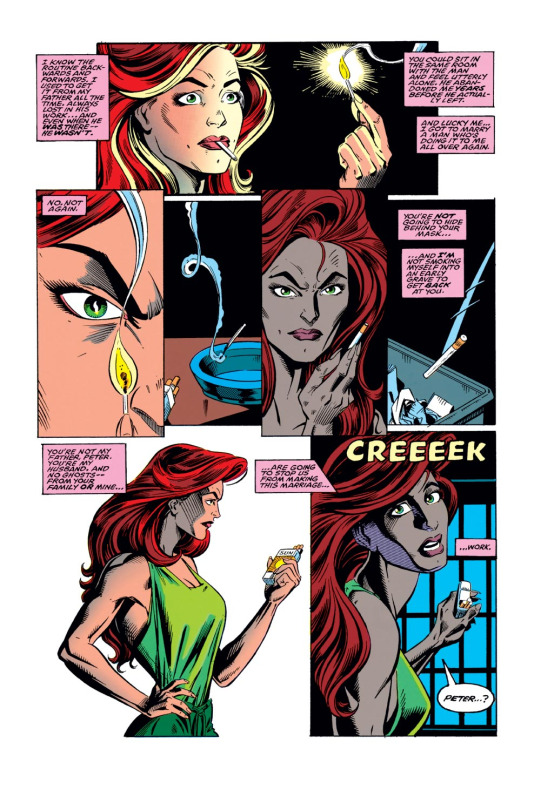

All of which is to say Mary Jane is definitely going to take major issue with someone exploiting someone else’s drug addiction for their own ends. Which is exactly what Beck did with Lydia McKenzie.
Not to mention Lydia was someone in the exact same profession as Mary Jane, which might incline further ire from MJ.
**Remember this is not the first time Mysterio has been publically declared dead. It first occurred in ASM #141, which I discussed in the last instalment.
***Not to mention how it’d be common sense to ask how someone so young died if you are going to their funeral.
****And as food for thought she has literally armed herself with guns in the past. As such the idea she wouldn’t make a point of getting practical information for the sake of safety is highly unbelievable, even if she didn’t live in a city where super villains are commonplace.
Previous Part
Next Part
Master Post
#Mysterio#Quentin Beck#Amazing Mary Jane#Leah Williams#mary jane watson#Mary Jane Watson Parker#MJ Watson#mjwatsonedit#Spider-Man#peter parker#daredevil#matt murdock#Karen Page#Bullseye#Harry Osborn#Flash Thompson#Foggy Nelson
17 notes
·
View notes
Note
It’s true, I personally think the universe is really amazing yet also really stupid, but maybe it’s because I think of it as another rough in-process draft of an indefinite number, to use your metaphor. But anyway if going by the premise + logic of what you say at the end of your post, how would one theoretically know that this universe isn’t the result of someone else remaking a former, even shittier/less amazing universe into something less shitty/even more amazing.
Hi, Anon. Sorry this took me a bit. I think that’s a great question (like, I can’t quite express how great because it gets too close to some other writing I am doing for me to talk about it too much right now, but it’s a *really* great question)!
[Note this is in response to this post.]
In the real world, I’m not sure there’s anyway we *could* know if we are living in one of a series of universes and most especially whether the cause of the “Genesis” of any of said universes was the result of the action of a conscious being working to “improve” on its predecessor, but it’s fascinating to consider! It’s really a *series* of great questions:
Are we in one of a linear series of universes?
Can we know if and how the previous universe in the series differed from ours?
Can we know if our current universe was engineered by a consciousness in the previous universe in response to fundamental conditions in the previous universe?
Is the current universe in some way ethically superior to the previous one and how would we measure that?
According to Cosmology
If we take out the metaphysical/theological/moral aspect as well as the “intention of a conscious instigator” aspect (that is, stick to question 1) it’s basically cosmology’s “Big Bounce” hypothesis (Einstein’s cyclic model, for example) where the universe doesn’t begin or end, but simply collapses and then re-expands in a cycle forever—Crunch, Bang, Crunch, Bang, etc. Something I’ve wondered for a while: if this is true, could there be any evidence available to us that past cycles existed and, if so, what they were like? I don’t know what such evidence would be (not that I’m, like, an expert :D), but that’s just a small part of the question you’re asking.
I don’t remember if the underlying “laws” of the universe were conceived as capable of changing between cycles in this conception—is gravity still the same, is there still electromagnetism, is there still entropy?(1) If we want to do more than limit this question to the material/mechanical “is it possible?” by looking at the moral implications(2) then we’d need for some of the underlying laws to be able to change.
There is an alternative to the Big Bounce: each universe (a) may create new universes (b, c, d, ...) through some action(s) either within the universe (a) or outside of all universes. White holes are an example of the former: new, separate universes beginning from singularities inside white holes in our universe. Brane Theory postulates that this happens when meta structures outside the universe called “branes” bump into each other; this would be an example of the latter. And I’ve seen versions of hypotheses for both that suggest the fundamental laws of nature need not be the same among the universe (a) and the universes (b, c, d, ... ). But as far as I know (and that’s not necessarily saying a lot :) ), no one has found a way to make these hypotheses falsifiable.
Still none of that addresses the conscious intent question, to say nothing of the last question; the last is, of course, quite subjective.
According to Religion
I’m not very familiar with religious/philosophical(3) conceptions of Creation as cyclical, though I know they exist in Buddhist and Hindu models as well as in the ancient Mayan religion. I’m afraid I don’t know which, if any, view this process as one with a goal or direction. Is growth and improvement of the universe and its mechanisms from cycle to cycle important in the same way as it can be said to be important for living creatures within it in these models? Furthermore, do any suggest that any such improvement is, was, should be, or will be the result of conscious, intentional actions? Can anyone help me out on this one?
It’s a fascinating prospect though. I’d even say it’s a hopeful prospect (and maybe, just maybe, not entirely out of line within the context of Tolkien—see below)!
[Forgive me if I get a bit over-explicatory and didactic here—it helps me to write all this out, even if it might be common knowledge to readers, particularly in the Silm fandom.]
For the purpose of my previous post, I’m speaking (somewhat obtusely) about Tolkien’s cosmological/metaphysical belief system which, at least by the time of the writing of the contents of the published Silmarillion, is somewhat in line with his underlying Catholic faith. The issue at hand, of course—and the issue that Tolkien was trying to “solve” (or at least consider)—was The Problem of Evil.
How does someone working from a Christian perspective square the fact that the world is filled with horrific pain and suffering with belief in the existence of an omnipotent, omniscient, and omnibenevolent God? David Hume in his Dialogues Concerning Natural Religion expressed the problem thusly: "Is he [God] willing to prevent evil, but not able? then is he impotent. Is he able, but not willing? then is he malevolent. Is he both able and willing? whence then is evil?"(4)
One such answer to this question includes an appeal to Free Will—after all, if people are to be allowed Free Will, then they must be allowed to use that will to commit evil, even if an omnipotent, omniscient, and omnibenevolent God would prefer they did not, since that is the definition of Free Will. And this may be convincing for some—or even for me on good days so far as it goes—but it does not address the fact that the natural world, up to and including processes that are several steps removed from consciousness/will (or even life!), generates the conditions for suffering. Free Will may explain why God tolerates things as unconscionable as genocide, but it does not explain why most of Nature consists of suffering as an integral part of its mechanism: we can see the fear in the prey animal’s eyes when it hears the twig snap, but the predator has to eat, too. Suffering is required for the system to run. The story of The Fall as told in Genesis may explain why such suffering happens to human beings, but it does not explain why it happens to everything else, why The Whole Damn Thing Is Fallen.
Enter Melkor stage left.
Tolkien’s Felix Culpa
There’s a quote in one of Tolkien’s letters where he addresses The Problem of Evil almost directly. Tolkien is writing to his son, Christopher, during his RAF training during WWII. Christopher was the child closest in mind to Tolkien, himself, and I am sure his proximity to danger at this time was especially hard for Tolkien on a number of levels. In Letter #66 Tolkien writes the following:
“I think also that you are suffering from suppressed ‘writing’. That may be my fault. You have had rather too much of me and my peculiar mode of thought and reaction. And as we are so akin it has proved rather powerful. Possibly inhibited you. I think if you could begin to write, and find your own mode, or even (for a start) imitate mine, you would find it a great relief. I sense amongst all your pains (some merely physical) the desire to express your feeling about good, evil, fair, foul in some way: to rationalize it, and prevent it just festering. In my case it generated Morgoth and the History of the Gnomes(5).” —Letter #66, to Christopher Tolkien, 6 May, 1944
The cosmology and theodicy of Tolkien’s Secondary World (Middle-earth, Arda, Ea) is laid out in the first chapter of The Silmarillion (Ainulindale, aka “The Music of the Ainur”) and represents an attempt to “make sense” of a world that could generate the kind of evil he had experienced in his life. If I may postulate: the death, during his childhood, of first his father and then mother; what he perceived as his mother’s martyrdom for her Catholic faith; and the endless mechanized, brutal, and senseless horror of WWI.
The answer to this for Tolkien was Melkor/Morgoth, his own resident Satan. But unlike Christianity’s Satan, Morgoth/Melkor had both sub-creative capabilities(6) and was responsible for some aspect of the “Design” of the universe through his Marring of the Music.
In my post the “drafts” are the Two Themes that were sung before the Third Theme (most importantly The First Theme—the Perfect World). The Third Theme is the Theme that finalized the means by which Melkor’s Marring would be integrated into Eru’s greater purpose in such a way as to generate Good that is far greater than what could exist in The Perfect World. It is the Theme that describes our Fallen World.
As The Fall of Man is envisioned as a “Happy Fault” (Felix Culpa), a sinful act that nevertheless allowed the far better redemption of Man through Christ to happen, so too is Melkor’s Marring of the Music envisioned as the means by which greater things than could have been otherwise will arise in the world.
The Problem of Evil as it extends to suffering “baked in” to the system is thus “solved” by placing a conscious agent, allowed Free Will, between God and material reality, with sufficient privileges to affect the design of the universe (Laws of Nature) and sufficient power to enact those designs, however evil, in matter, itself. While that latter part is not unique to Tolkien (hello demonology), the former is not something I have really encountered in quite that form anywhere else.
Now, getting back to your question and tying it to Tolkien :).
At first glance it might appear that any kind of cyclic model of the universe, with the actions of finite, fallen, non-divine beings working to “improve” on the designs of their divine predecessors, would be antithetical to Tolkien’s increasingly Catholic metaphysic. And yet...
Pair up some statements he made regarding both the Primary and Secondary Worlds with the events of the short story Leaf by Niggle and things look rather different. Tolkien said in a few places that he hoped that the ultimate fate of humans, as fundamentally sub-creative beings, would be to have God grant reality to their ideas, in the same way Eru grants material being (reality) to the vision created by the Music of the Ainur. This is essentially what Niggle receives when he reaches the upper layers of “purgatory”: his Tree made REAL (“Ea! Let these things Be!”). Not only that, his experience of it and its reality is intimately tied to his neighbor, Parish, the man who in life was always getting in the way of Niggle finishing his Tree painting. And this is a supremely important point for Tolkien and its the point that Melkor rebels against: sharing in the work of creation. Melkor cannot abide it, to the point that he would rather make all of creation not exist if it can’t consist only of his own mind.
Indeed, even in the context of his Secondary World there are hints that after the end of the Universe, Men will Sing a new Music, supplying their own ideas for the Design of new Eas. What would these human ideas be, and might they include universes even better than Ea, Men having lived in it and having not originated outside it and having been granted a capacity for working outside The Music unlike any other beings in Ea?
Well...one does wonder....
Notes
I seem to remember that the Second Law of Thermodynamics is one of the reasons this hypothesis fell out of favor back in the late 20th century
And unless I can lay my ethical issues with Nature purely at the feet of the happenstance of evolution on our particular planet (maybe on other planets life evolves in such a way that suffering does not exist but all the good stuff does?).
There’s also Nietzsche’s question of Eternal Return (among other philosophical equivalents). However, I don’t think that required distinct universes, but rather merely infinite time in which matter might, by sheer probability, return to a copy of its previous arrangement.
I posted a quote from Candide not long ago. In Candide, Voltaire was directly mocking Gottfried Leibniz’s take on this issue—that our reality must represent The Best of all Possible Worlds because it is the reality that God chose to create. OK, sure, Gottfried.
“History of the Gnomes” refers to the tales of the Noldor (then called “Gnomes”) and the Silmarils that make up the bulk of The Silmarillion.
It wouldn’t, I think, be out of the question to view much of Tolkien’s divine cosmology as rather Gnostic in flavor: a supreme One delegates creative powers to subordinate divinities who enter into the world, much as some Gnostic thought perceived the demiurgic Yahweh as doing, against the will of the higher God. The (very important) differences being that the Ainur’s powers (at least by the time of the writing of the contents of the published Silmarillion) were only *sub-creative* (they could not create matter or material existence ex nihilo), that material existence is conceived of as fundamentally good (divine sparks/souls are not “trapped” in matter), and that the demiurgic entities are not themselves responsible for creating humans (who are positioned as their peers).
#asks#long post#tolkien#the whole damn thing is fallen#problem of evil#cw: problem of evil#melkor#morgoth#the silmarillion#cosmology#big bounce#brane theory#the second law of thermodynamics#entropy#arda unmarred#arda marred#arda healed#theology#religion#david hume#voltaire#nietzsche#eternal return#cyclical universe
17 notes
·
View notes
Text
Discussion: Give Readers Some Credit.
So. Let’s talk about readers, and authorial intent, shall we?
First a detour. Who here is familiar with the Hays Code? Just in case: in the 1930’s it was established for motion pictures in the USA and presented strict guidelines about what could and couldn’t be put into films. The Code lasted until the late 1960’s but its impact on film is absolutely still seen today, specifically in the rating system for films. The Hays Code dictated various moral guidelines that somewhat stripped viewers of film of their autonomy, implying that the general public wouldn’t be able to distinguish between good and bad or right and wrong without films making it very clear what those lines were. There was no grey area in the Hays Code.
Literature, for its part, has had various formal and informal rules and guidelines applied to it throughout centuries of publishing that dictate who can and can’t read certain topics. I’m not going into a history lesson on that, but suffice to say that at some point just about every person who wasn’t a white cishet man has had a restriction put on them for reading at all or reading certain things. Today, the big issues come down to censorship, banning books, and lobbying against books for a particular reason.
Censorship Today
Censorship is a big ticket issue today, both formally and informally, and internationally. I will admit to having limited knowledge and experience of the kind of censorship experienced in places such as China, but I am aware it is present, enforced, and potentially dangerous. Formal censorship worldwide comes in the form of preventing books being published or translated in the country at all, banning its sale in its original format, and sometimes going so far as to censor access to websites that sell the book and social media platforms where the book is widely discussed. Government level censorship of books generally is inspired by fear of what the books might inspire, from protests to full on coups. Usually, this act of censorship is indicative of larger systemic problems within the government not real problems within the book’s content.
Informal censorship is a bit more complicated, and comes about in a few ways, including straight out banning books in a community which I will discuss in the next section. Informally censoring a book usually comes from a community speaking out against something in the book or something about the author they are opposed to. This differs slightly from lobbying against a book because if a community quietly agrees to censor a book from those in the community that shouldn’t be exposed to it (whether with good intentions or not) they won’t also attempt to have the book banned elsewhere, or turn it into a political topic by protesting the books very existence. More on that later. Instead, this informal censorship is more in line with parents or groups of parents agreeing to forbid their children from reading certain books–usually for moral and religious reasons.
An example of informal censorship from my own life: when I was attending Catholic school as a preteen The Golden Compass was released as a movie. The school itself never released a statement or talked about the book or movie, and the farthest I got to an adult’s opinion on it was when someone asked my religious studies teacher about it and she pointed out that the books are fiction so did it really matter if the subject matter went against religious beliefs? However, the parents of my classmates at least were scared. My mother received an email from a concerned parent who was encouraging all the parents in our class to prevent us from seeing the movie, and that if for some reason one of us did see it to keep it to ourselves so as not to encourage the rest of the kids to want to see it too. This act of informal censorship resulted in a group of preteens who probably didn’t even care about this issue being prevented from reading Philip Pullman’s works or seeing the movie based on them. The parents didn’t want to try and get the books removed from the public library or the movie taken out of theaters, they just wanted to ensure their children were never exposed to it.
Fun fact: the day my mother read that email she came home with the full set of His Dark Materials and later she bought me the movie on DVD.
Banning Books
Banning books is a lot more straight forward than the degrees of censorship. Most readers are familiar with the idea of banned books. Books tend to be banned from smaller communities, such as a town’s library and school, but are rarely enforced at a higher level without censorship getting involved. I’m going to be using “banned books” to refer to that lower level, not government level censorship. Thus, banned books are still purchasable in this context through retailers such as Amazon and chain bookstores.
A banned book can be banned for any number of reasons. I see banned book lists often enough that have things such as “unrealistic female characters” referring to The Wizard of Oz. Many readers who chance upon one of these lists tend to take pride in having read much of its contents, especially depending on the context of the book bans. Some book bans are focused on schools and keeping “unsuitable” material out of students’ hands. This ranges from “this book is too pornographic to be appropriate” to “this book encourages witchcraft and we can’t have that!” While there might be something to be said about schools having age appropriate books available in the library–if the oldest kids in the school are ten then maybe Stieg Larsson’s books aren’t a priority–many book bans are comical in their ridiculous reasoning.
Book bans come from a combination of underestimating the critical reading abilities of others and from fearing what those others might do with the knowledge the book contains. For example, a highly misogynistic person might not want books that portray women in positions of power to become available for the next generation of young girls. They both underestimate the girls’ ability to choose a lifestyle for themselves by assuming any fiction they consume will immediately shape their decision making, and they also fear what the girls might choose to do if presented with the idea that they have options. While many book bans sound like silly reasoning, a lot of them are insidiously chosen as a form of disenfranchisement. Preventing Black readers from having positive role models from authors of color, for example, assists the school to prison pipeline.
Lobbying Against Books
Lobbying against books is where book banning gets more serious. This is the middle step between book banning and book censorship, really. Lobbying against a book is when a group or sometimes an individual take it upon themselves to ban a book for their own community and then try to get it banned on a larger scale. Now, there are times that lobbying against a book is actually done with good intentions and not with the intent of banning or censoring the book. There are times where the author reveals themselves to be…lacking in some way, and that may have affected the writing they produce. I know I’m dancing around some authors in particular, but I didn’t make this post to call out specifics so.
An example of a bad lobbying idea: An upcoming YA release is announced and hyped by excited would-be readers. The book sounds awesome! It’s written by a new author, has really good Own Voices representation, and presents a unique story. It is largely regarded as an excellent contribution to literature by bookish folks. A conservative parent purchases the book upon its release with the intention of giving it to their daughter, and due to their household rules about book content the parent reads the book first to ensure it complies. The parent discovers that the book contains a relatively mild romance plot, but that the main character does have sex in this plotline, though the scene is hardly explicit or erotic. Conservative parent is very worried that reading about the idea of sex will inspire their daughter to have sex and decides this book is dangerous and not suitable for their daughter. Unfortunately, with all the excitement over the book, the daughter keeps asking to read it. Perhaps her friends have all read it, perhaps it’s being pitched by the school library as a great new release, perhaps it’s being developed into a film or TV series that her classmates are excited to watch. The parent now starts telling other parents that they shouldn’t allow their children to read this book or watch anything based on it, largely out of fear that their daughter will be exposed to it somehow. Other conservative parents jump on board, banning the book from their households and attempting to have it banned altogether so as to prevent their kids from getting their hands on it. Perhaps the ban makes it through the school and the public library, but the local Barnes and Noble continues to sell copies and they’re going fast. In order to get the book taken off of a chain store’s shelves, the parents now have to lobby to have the book banned on a much larger scale, so they do so. All because they don’t want their teenagers having sex yet.
An example of a good lobbying idea: A really popular author has come out with a new book. This is his fourth book, and many readers are excited to get a copy and devour it. Book bloggers and other voracious readers have torn through the previous three because they’re witty, have appealing characters, and a unique worldbuilding set up. However, a bisexual reader immediately recognizes that this fourth book has the main character being extremely biphobic. The biphobia is upsetting for the reader, but they persevere because up to this point the main character has been a good role model and perhaps the biphobia is a character flaw that’s going to be called out and corrected. It is not by the end of the book, and the reader is now uncomfortable. Unsure. The reader tells other bisexual readers to be careful, that the content can be triggering due to its biphobia. LGBTQ+ readers in general are warned and slowly become cautious about the books and author in general. The fifth book comes out, and the bisexual reader timidly approaches it with an open mind, hoping that it was just a multi-book character arc. The biphobia continues, reinforced by the positive reception to the character in the fourth book. It’s clear that this is here to stay. The LGBTQ+ readers who are aware of this problem start to speak out, asking others to critically read this book and not internalize the biphobia in it. The author doubles down on the biphobia, defending it when criticized. Now more readers speak out, pointing out that this is potentially harmful, asking other readers to be very critical when consuming the author’s works and to consider ending their support of the author over his remarks.
Why all of this sucks
Ultimately, a lot of this comes down to stripping readers of their autonomy. Think about people who argue that some books are bad because a character in them does bad things. The majority of those that read the book probably recognize those bad things for what they are, and know that the character is nuanced and not always right. But there are those that would lobby to have the book removed from all reading spaces because the character that does bad things might be appealing to an impressionable reader and encourage them to do bad things. This is a very narrow-minded view that is also highly condescending. Teenagers can read a book where a seventeen-year-old has sex without immediately going out and having sex themselves. Readers in general deserve the credit to know that not everything that happens in fiction is realistic or positive. If a reader can tell the difference between reality and fiction, they can certainly make their own choices in real life without being unduly influenced by the actions and thoughts of fictional characters.
This belittling fear that certain readers are too impressionable to be exposed to certain media is astoundingly simplistic. We have to give readers more credit than that. Sure, there will be books that need to come with content warnings, trigger warnings, and disclaimers. There are some authors whose racism, homophobia, transphobia, and ableism (among other things) leak into their writing and those books when read need to be read with the knowledge of that. There are even some books that are irredeemable from that standpoint and it is absolutely a valid choice to refuse to read books by an author whose morals go against your own. However, not everything someone views as morally wrong is also unnuanced when presented in a text. Additionally, not every reader takes what they read at face value. Many readers appreciate a well written villain while also recognizing why that character is a villain. Many readers also appreciate flawed main characters who aren’t always correct but are allowed to make mistakes.
As bloggers we are in a position to point out the nuance in such books. Reviews are excellent for helping readers figure out whether a book will be too far over the line for their moral compass, if there’s something in the text that matters for them or not. However, we have to give readers some credit. Just like in communities that would censor and ban books, sometimes book reviews overlook nuance. They make hard lines around characters saying that something is problematic and therefore the whole text is corrupted, or misidentifying an action or a thought as a moral or ethical opinion. I am not exempt from this, there are certainly times where I draw a hard line in the sand that I refuse to cross for any book regardless of the praise it receives. But I also recognize that there are other readers who will cross that line and read certain texts and find value in them where I didn’t. I have to give those readers credit and believe that they will also be able to see the negatives of the text and not internalize or forgive those.
2 notes
·
View notes
Text
Noah Primeval Preface Snark
If you enjoy the content you are reading, please like and follow the Center of Stupidity blog.
Summary: The author claims that his stories are rooted in "the theological and spiritual intent of the Bible." He also loves to scripture drop. The worst is yet to come.
In case anyone wants to read the original author’s preface in order to form their own conclusions, you can read it here.
In the event that this gets flagged, here is another place to read the chapter snark.
Inspired By True Events.
Keep this in mind, folks.
Because...
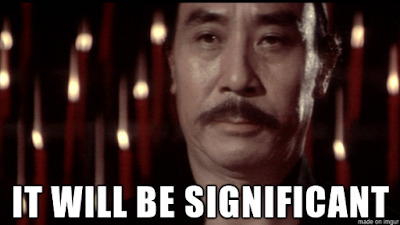
The story you are about to read is the result of Biblical and historical research about Noah’s flood and the ancient Near Eastern (ANE) context of the book of Genesis.
Translation: Because I did some research, it means that the novel is deep and elevated lit-ra-choor.
While I engage in significant creative license and speculation,
....
..................
......................................
That’s a verbose way of saying “I created a work of fiction.”
all of it is rooted in an affirmation of what I believe is the theological and spiritual intent of the Bible.
Even though there are countless Bible interpretations.
You found all of the "hidden truths"and know the "correct" way to read the Bible.

But silly me.
This is the same person who spews vitriol at movies that don't conform to his beliefs and wrote a paper called Calvinism and the Bible.
In the document, Godawa insists that "Calvinism is simply Biblical Christianity" and how the five points of Calvinism are “truly Biblical doctrines, then most of us western American Christians have been sold a bill of goods as to what the Gospel really is."
For those who are leery of such a “novel” approach,
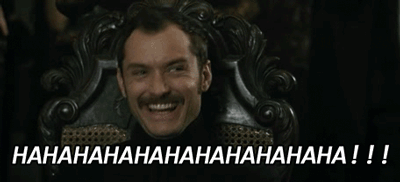
Like some other writers, Godawa believes that he has a Wildean wit.
let them consider that the traditional Sunday school image of Noah as a little old white-bearded farmer

I gotta call bullshit.
The traditional Sunday school image depicted Noah as being a white man.
It didn't emphasize that he was an old farmer.
building the ark alone with his sons is itself a speculative cultural bias.
It's been a while since I've been to CCD…
But I don't remember them ever discussing at great length on how the ark was built.
They don't deal in the minutia.
Instead they focused on educating people about their faith.
And the whole "speculative cultural bias" comment is rich...
Coming from a man who preaches in his fiction and does evangelizing podcasts with his friends.
The Bible actually says very little about Noah.
Instead we get lengthy details about who begat who and what tribe they came from.
We don’t know what he did for a living before the Flood or even where he lived.
Which is why the Midrash aggadah was written.
According to MJL, Midrash aggadah interprets biblical narrative, exploring questions of ethics or theology, or creating homilies and parables based on the text.
For instance, one of the best known midrashes is the story about Abraham.
It states while Abraham was a young child in Mesopotamia, he was smashing idols.
This story suggests that God didn't randomly pick Abraham.
Instead, God knew that Abraham would be receptive to His voice.
How do we know whether he was just a simple farmer or a tribal warrior?
The answer?
We will most likely never know for certain.
And secondly, who cares? It is minutiae.
Oh wait.
The author is going to bestow us the answer.
Genesis 9:2 says Noah “began to be a man of the soil” after the Flood, not before it.

Genesis 9:2 says this:
The fear and dread of you will fall on all the beasts of the earth, and on all the birds in the sky, on every creature that moves along the ground, and on all the fish in the sea; they are given into your hands.
(This comes from the New International Version.)
And I checked two other translations: the King James Version [KJV] and the English Standard Version [ESV].
They are the same as the first.
The passage about Noah becoming a farmer comes from Genesis 9: 20
Noah began to be a man of the soil, and he planted a vineyard. [ESV]
Noah, a man of the soil, proceeded to plant a vineyard. [NIV]
And Noah began to be an husbandman, and he planted a vineyard. [KJV]
So in conclusion:

If the world before the flood was full of wickedness and violence,
Because they would all fight evil physically.
It's not like righteous men would ever combat evil by using their words or practicing non violence.
Noah would not have been that different from Abraham,
Or…
He could have been a prophet whose words inspired others.
Nobody knows for certain what Noah did prior to the flood.
who farmed, did business and led his family and servants in war against kings.
Man, Godawa is obsessed with the idea of righteous warriors.
We know very little about primeval history,

There is a newfangled thing called archaeology.
but we do learn from archeological evidence that humanity was clearly tribal during the early ages when this story takes place.
Um…
The previous line belies the rest of the sentence.
Where's the editor?
Yet, nothing is written about Noah’s tribe in the Bible.
We also don't know anything about Jesus' childhood.
Your point being?
It would be modern individualistic prejudice to assume that Noah was a loner when everyone in that Biblical context was communal.
Who ever said that he was???
Is Godawa just making up arguments so he can tear them down?
Noah surely had a tribe.
You already said that. Move along.
There is really no agreement as to the actual time and location of the event of the Flood.
And in other news…
Bears shit in the woods and the Pope is Catholic.
So B. Godawa lists some theories about when and where the Flood took place.
He thinks it is "Early Bronze Age Mesopotamian contexts" because of some passages in Genesis.
By the by... He doesn't mention any specific passages.
At some other time, I'll take a look at the appendix.
Because right now, I'm not in the mood to read an appendix that is about one hundred pages long.
The Bible also says Noah built the ark.
And now for the following news bulletin:
Adam and Eve lived in a place called the Garden of Eden.
Are we to believe that Noah built it all by himself?
Yes, if you take the Bible literally.
It doesn’t say. With his sons’ help? It doesn’t say.

But that very same book does say earlier that Cain “built a city” (some scholars believe it was Cain’s son Enoch).
Which scholars said that?
Because doing a quick Google search got me absolutely bupkis.
Instead, I got a bunch of websites that talked about Cain building a city and naming it after his son.
Are we to assume that he built an entire city by himself?
No lie… I had to check and see if Cain had a son named Enoch. (And he did).
Because after the bungling of a verse from Genesis, I wasn’t sure if this was another mistake.
As for Cain building an entire city single handedly? I’m sure Christian fundamentalists would respond with “yes”.
My response would be “no” followed by:
Who helped Cain to build a city? A lot of golems? Some demons? Or did he hire a lot of people in the nearby area?
If Cain just hired a bunch of people, wouldn't the idea of God only creating two humans [a.k.a. Adam and Eve] be false?
How did Cain get the materials to build a city?
How would Cain know which materials would be good for building a city?
And why did Cain want to build a city in the first place?

Ridiculous.
Who knew that with one word, such disdain could drip from a person’s tongue?
Cain or Enoch presided as a leader over the building of a city by a group of people,

Wait a tick…
Godawa previously said that it was Cain that built a city but some scholars believe it was Enoch.
And now he is stating that it could be Cain OR Enoch.
Does that mean that Godawa forgot what he wrote previously?
Or the man who sees himself as the Grand Poobah of Biblical Knowledge is finally admitting that he doesn’t have all the answers?
just as Noah probably did with his ark.
So in other words, Noah just sat on his ass and barked orders at people.
Because as we all know, that is a great leadership style.
One of the only things Genesis says about Noah’s actual character is that he was “a righteous man, blameless in his generation. Noah walked with God” (Gen. 6:9).
Now a normal person would interpret this to mean that Noah was a good person who conversed with God.
But Noah Primeval turns Noah into a Gary Stu. (By the way, this will be revealed in future chapter snarks).
The New Testament clarifies this meaning by noting Noah as an “heir” and “herald” of righteousness by faith (Heb. 11:7; 2Pet. 2:5).
ESV [English Standard Version] said Noah as a “herald of righteousness” while NIV and KJV described Noah as a “preacher of righteousness” (2 Peter 2:5).
While ESV, NIV, and KJV all described how Noah “became an heir of righteousness.” (Hebrews 11:7).
You might be thinking to yourself: What’s your point?
If we are to take into account what the Bible said about Noah… It describes Noah spreading God’s message (like a herald or a preacher). But it also adds that because of Noah’s faith in God, he “became an heir of righteousness.”
This differs from the depiction in Noah Primeval where Noah is the Chosen One from an ancient prophecy.
And that makes him superior to all the other filthy mortals along with slightly less perfect than Jesus.
The popular interpretation of this notion of “righteousness” is to understand Noah as a virtually sinless man too holy for his time, and always communing with God in perfect obedience.
But is this really Biblical?
If you mean, some people acting like sanctimonious hypocritical assholes, then I would loudly shout “Hell yes!”
Would Noah have never sinned? Never had an argument with God?
Personally, my answers would be “no” for both questions.
But in this novel, when Noah isn't acting like a bratty teenager, he acts like a smug douchebag.
Yet the reader is supposed to see Noah as a paragon of virtue.
Never had to repent?
In order to repent, a person must have genuine remorse for their actions. It also requires accountability.
It doesn't entail a person rending their garments melodramatically until they are completely naked and then yelling at the top of their lungs. I'm looking at you, Noah Primeval.
As a matter of fact, the term “righteous” in the Old and New Testaments was not a mere description of a person who did good deeds and avoided bad deeds.
Maybe it is because the writers of the Old and New Testament know that good people are not perfect. They make mistakes and take ownership of their actions.
Righteousness was a Hebrew legal concept that meant, “right standing before God” as in a court of law.
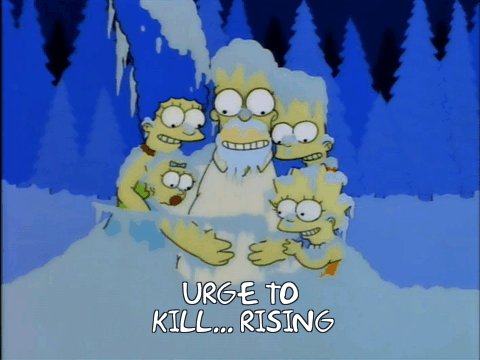
What makes me so fucking disgusted is that Godawa has no qualms with cherry picking things from different mythologies and whatever doesn’t suit his narrative is either discarded or depicted as being malevolent lies.
It carried the picture of two positions in a lawsuit, one “not in the right,” and the other, “in the right”
You mean a lawsuit involves two sides: the prosecution and the defense?
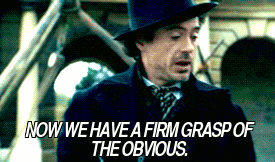
or “righteous” before God.
And this series doesn’t hesitate to jump on a soap box and shout at the top of their lungs.
It was primarily a relational term.
*Sigh*
What’s next?
Are we going to define the definition of is?
Not only that, but in both Testaments, the righteous man is the man who is said to “live by faith,” not by perfect good deeds (Hab. 2:4; Rom. 1:17).
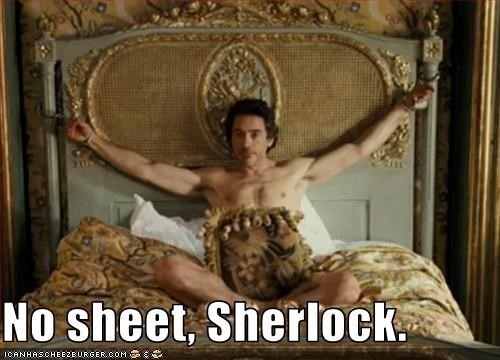
So righteousness does not mean “moral perfection” but “being in the right with God because of faith.”
In other words, ice is cold and fire is hot.
….
This is leading up to rant filled with gratuitous Bible citations.

What’s more, being a man of faith doesn’t mean a life of perfect consistency either.
You mean good people aren't perfect??? Thanks for notifying me Brian Godawa!
Look at David, the “man after God’s own heart” (Acts 13:22), yet he was a murderer and adulterer and more than once avoided obeying God’s will. But that doesn’t stop him from being declared as “doing all God’s will” by the apostle Paul.
At risk of sounding like a broken record, good people are not perfect.
Which is why repeating the obvious makes a person look like a blithering moron.
Or consider Abraham, the father of the Faith, who along with Sarah believed that God would provide them with a son (Heb. 11:8-11).
What does this have to do with anything? Is Godawa trying to dazzle the reader with how many Bible verses he can quote?
Yet, that Biblically honored faith was not perfect, as they both laughed in derision at God’s promise at first (Gen. 17:17; 18:12).
I guess Godawa never heard of a thing called context.
According to the Zohar, Sarah laughed because her son would have a feminine soul.
The Zohar also states that a soul from the "feminine world" cannot have children.
Sarah knew this and laughed because this contradicted God's promise to continue Abraham's bloodline.
God had to remind Sarah that He has the power to do anything. Which means He can turn a feminine soul into a masculine one.
And because Godawa loves to scripture drop, he cites additional examples from the Bible when people either argued or complained to God.
The very name Israel means “to struggle with God.”
I normally don't split hairs but considering the fact that the author fancies himself to be a scholar…
The word Israel means "God contends".
An alternate translation is "He Retains God"or "God Is Upright".
All the heroes in the Hebrews Hall of Faith (Heb. 11) had sinful moments, lapses of obedience and even periods of running from God’s call or struggling with their Creator.
According to the NIV translation, it commended the people for having a strong faith in God and how that faith allowed them to do what it is just. It does not give blow-blow descriptions of their spiritual struggles or a detailed accounting of all of their sins.
Now that I'm thinking about it… I have a sneaking suspicion that this is leading up to Godawa justifying his depiction of Noah.
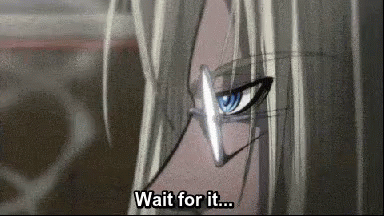
It would not be heresy to suggest that Noah may have had his own journey with God
Well, duh.
Noah's spiritual journey would have started with baby steps.
It is not like Noah would be chummy with God the very second he was born. A relationship with God is developed during a lifetime.
that began in fear and ended in faith.
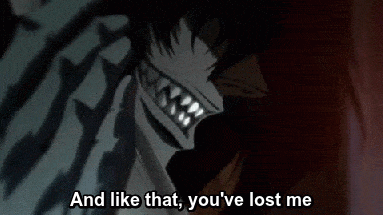
That's assuming that every person that started a relationship with God that said relationship was founded on distrust (which is fueled by fear) or the case of Noah Primeval, built on a foundation that is a passive-aggressive hate boner for the Almighty.
For some individuals, their spiritual journey never originated from animosity or distain because they always had faith.
In fact, to say otherwise is to present a life inconsistent with the reality of every human being in history.

I'll say it again.
Every person's spiritual journey with God is different.
To insist that every person's relationship with God originated from negative emotions is not based in reality.
To say one is a righteous person of faith is to say that the completed picture of his life is one of finishing the race set before him, not of having a perfect run without injuries or failures.

It is time for a writing exercise! Let’s take this wordy sentence and make it concise.
I'll go first.
The completed picture of a righteous person’s life is not a perfect run without injuries or failures but rather they finished the race set before them.
Now that I'm thinking about it …
This verbose sentence sounds like something that belongs in a fortune cookie.
Also, I find it odd that this little nugget of wisdom uses the gender neutral phrase “righteous person of faith” but then uses his | him pronouns.
Why am I getting the feeling that this is a subtle message that only a man can be a "righteous person of faith"?
Some scholars have even noted that the phrase “blameless in his generation” is an unusual one,
“They also think it is peculiar that the Flood lasted for forty days and nights. Why not eighteen or twenty-five? Is forty God’s favorite number or did He just pick it randomly?”
reserved for unblemished sacrifices in the temple.
Wait a minute.
So these scholars are stating that the phrase "blameless in his generation" is only used for animal sacrifices.
Which means Noah is likened to an animal sacrifice…

Which is totally different from Noah Primeval's depiction of Noah as a macho and virile warrior who is the Chosen One.
Also, it is really dodgy when someone only gives some citations or doesn't provide any.
This physical purity
…
The words "physical purity" just sent shivers down my spine.
Because when words like that casually enter into a conversation, it is not long before an argument is made in favor of eugenics.
takes on new meaning when understood in the genetic context of the verses
"Genetic context"?
I didn't know that words had DNA.
Flippant comment aside, all this talk of "physical purity" and "genetic context" prompted me to do a quick Google search of the following: Noah blameless in his generation animal and it brought up a thread asking if Genesis 6:9 is referring to Noah's genetic purity.
before it that speak of “Sons of God” or bene ha elohim leaving their proper abode in heaven and violating the separation of angelic and human flesh (Gen. 6:1-4; Jude 5-7).
Um…
This is sort of correct.
Genesis 6:7-4 is about the Sons of God marrying beautiful human women and having children called Nephilim. Yet it also states that humans will live to be 120.
While Jude 5-7, the writer reminds the reader that God delivered his people out of Egypt and destroyed the non-believers. They also said that the angels who "did not keep their positions of authority but abandoned their proper dwelling" along with the sinful people of Sodom and Gomorrah will be punished by "eternal fire."
Within church history,

The concept of the Grigori and Nephilim originated in Jewish folklore and legends.
At some point, early Christians either stumbled across an old scroll discussing these ideas or simply heard about it. They probably found the whole story to be fascinating and proceeded to write their own interpretations.
there is a venerable tradition of interpreting this strangest of Bible passages as referring to supernatural beings from God’s heavenly host who mate with humans resulting in the giant offspring called Nephilim.
The idea that some angels came down from Heaven to mate with humans doesn't sound bizarre to me.
Frankly, the Book of Revelation reads like John was on a big acid trip.
Other equally respectable theologians argue that these Sons of God were either humans from the “righteous” bloodline of Seth or a symbolic reference to human kings or judges of some kind.
Again, Christians didn't come with these alternate explanations. For instance, Rabbi Shimon bar Yochai strongly opposed the idea that the "benei elokim" were angels.
I have weighed in on the supernatural interpretation
That is a weird way of saying "I have decided to write a novel that depicts the Grigori as angels."
According to the Collins dictionary, the words "weighed in", means:
give an opinion or enter a discussion or argument
to measure how heavy someone is, esp. before a competition
It is important to note that The Free Dictionary and the Oxford Learner's Dictionaries has these definitions but with slightly different wording.
In conclusion?

and have provided appendices at the end of the book that give the Biblical theological foundation for this interpretation.

Only a filthy peasant has opinions.
An enlightened individual only believes in facts and since they are benevolent, they are imparting their wisdom to others.
This novel seeks to remain true to the sparse facts presented in Genesis (with admittedly significant embellishments)
“Admittedly significant embellishments”?
That’s putting it mildly.
More like “being preachy but insisting that you are only telling people facts.”
interwoven with theological images and metaphors come to life.

I’m sorry but I can’t take this statement seriously.
Because it reminds me of a scene in the movie The Ref when Gus is talking about how “a complex web of complications need to be weaved and woven into a quilt of some kind.”
Where I engage in flights of fancy,
That’s putting it mildly.
This story never put its feet on the ground.
such as a journey into Sheol,
Pray tell, what is Sheol?
An explanation would be nice because for all we know, Sheol is the name of a cave or a forest.
I seek to use figurative imagery from the Bible, such as “a bed of maggots and worms” (Isa. 14:11) and “the appetite of Sheol” (Isa. 5:14) and bring them to life by literalizing them into the flesh-eating living-dead animated by maggots and worms.
Let’s break this down, shall we?
Isaiah 5:14 ESV says this:
Therefore Sheol has enlarged its appetite
and opened its mouth beyond measure,
and the nobility of Jerusalem[h] and her multitude will go down,
Isaiah 5 is about the people of Israel who will be punished for their sins. This specific passage is discussing how the sinners are going to die.
Isaiah 14:11 ESV says this:
Your pomp is brought down to Sheol,
the sound of your harps;
maggots are laid as a bed beneath you,
and worms are your covers.
Isaiah 14 discusses how Babylon will be destroyed by God. This specific passage is about how the haughty King of Babylon will perish.
It still doesn’t answer the question of what Sheol is.
If we are still looking at the Bible for an explanation, the NIV translation of Isaiah 5:14 states:
Therefore Death expands its jaws, opening wide its mouth;
Also, the New International version of Isaiah 14 doesn’t use the word Sheol.
Instead, it uses the words to the grave.
Based on these translations, one can make the assumption that Sheol is the word for death or grave.
However, Sheol is a place where the souls of the dead reside.
Let's take a look at this line more closely:
bring them to life by literalizing them into the flesh-eating living-dead animated by maggots and worms.
The Bible having figurative imagery? That is not a groundbreaking revelation. Plenty of Bible scholars have written papers and or books analyzing this.
Figurative language is not supposed to be taken literally. It is used by a writer to convey an idea (example: time is a thief) or to paint a picture in a reader's mind (example: the flowers danced in the wind.)
To take something figurative and make it literal is asinine.
Also, "flesh-eating living-dead"?
I guess the word "zombie" is too plebeian.
Another player that shows up in the story is Leviathan.
“Another player”?
I bethink he is a pretentious rampallian who thinkest by using an antediluvian word maketh him intelligent and literary sir.
“Player” is an old fashioned word for actor.
It DOES NOT mean character.
So in conclusion:

While I have provided another appendix explaining the theological motif of Leviathan
Translation?
“Behold my dizzying intellect!”
as a metaphor in the Bible for chaos and disorder, I have embodied the sea dragon in this story for the purpose of incarnating that chaos as well.
One word:
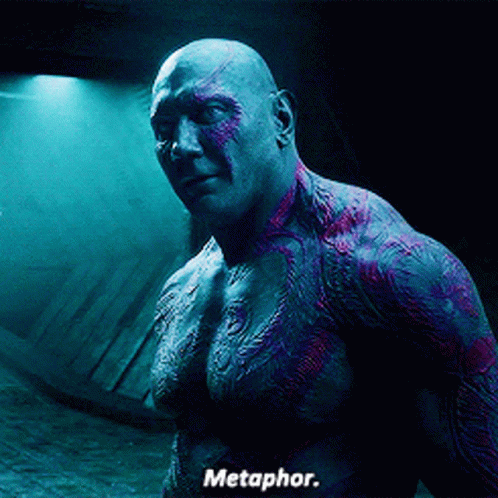
I have also literalized the Mesopotamian cosmology of a three-tiered universe with a solid vault in the heavens, and a flat disc earth supported on the pillars of the underworld, the realm of the dead.
Thanks to Brian Godawa, the words "metaphor" and "literalized" annoy me.
I'd hate to rain on your parade but Mesopotamian mythology isn't the only one who had a three-tiered universe.
Below is an image of the Hebrew cosmology:
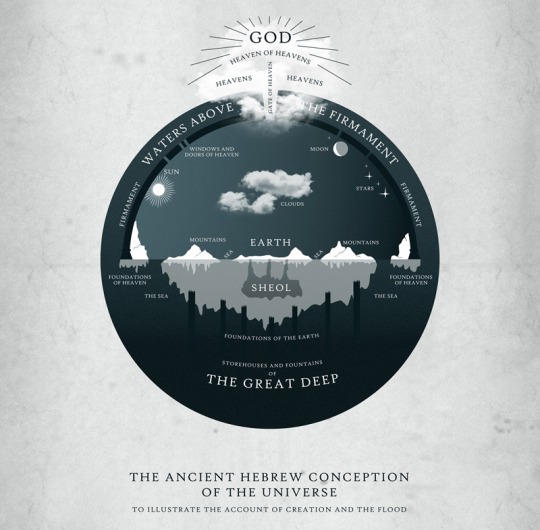
It also has an universe that has three levels: heaven, earth, and the underworld. The earth is a flat disc floating on water with heaven above it and the underworld below it.
If one takes a second look at the picture, you will notice that there are pillars or the foundation of the earth.
In conclusion, Mesopotamian mythology isn't the only one to depict a universe as being composed of three levels.
This appears to be the model assumed by the Biblical writers in many locations (Phil. 2:10; Job 22:14; 37:18; Psa. 104:5; 148:4; Isa. 40:22),

Jewish people have their own culture. They would not be using Mesopotamian mythology as their yardstick.
so I thought it would be fascinating to tell that story within that worldview unknown to most modern westerners.
You mean a different concept or an idea can be interesting? What a mind boggling revelation!
If I didn't know any better, I’d believe Godawa when he said telling a story from another culture’s point of view would be “fascinating.”
Yet it is painfully obvious that if something doesn't conform to his beliefs, it must be a vile falsehood created by malevolent beings.
The purpose of the Bible is not to support scientific theories or models of the universe,
Actually, the Big Bang Theory does not conflict with the story of creation.
but to tell the story of God through ancient writers. Those writers were people of their times just as we are.
Which is why the absence of Jewish culture is jarring.
Especially since all the "good" characters are Calvinists.
I have also woven together Sumerian and other Mesopotamian mythology in with the Biblical story,
It is randomly inserted (ex: Pazuz) or the deities are evil fallen angels who are destroying Family Values™ and Corrupting the Children™.
but with this caveat:
"Anything that doesn't conform to my worldviews must be the lies devised by Satan."
Like C.S. Lewis,
Did he compare himself to C.S. Lewis?
….
……….
…………………….
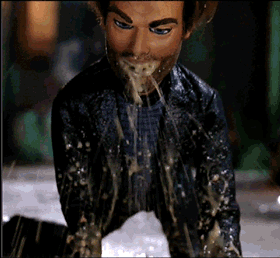
It is like trying to compare M. Night Shyamalan to Alfred Hitchcock.
Even though one is a hack while the other one is a talented creator.
I believe the primary purpose of mythology is to embody the worldview and values of a culture.
Aside from helping people to understand the world around them and giving them answers to timeless questions such as: Is there life after death? Why does evil exist?
Mythology also provides a form of entertainment and ensures that certain traditions survive.
But all myths carry slivers of the truth and reflect some distorted vision of what really happened.

This reeks of ethnocentrism!
Sumer’s Noah was Ziusudra, Babylon’s Noah was Utnapishtim, and Akkad’s was Atrahasis. The Bible’s Noah is my standard.
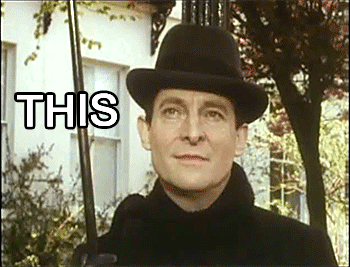
I'll bring this up if anyone tries to claim that Noah Primeval isn't preachy and ethnocentric.
So my goal was to incorporate real examples of ANE history and myth in subjection to that standard in such a way that we see their “true origin.”
....
You know what?
If someone wrote a Wiccan based fantasy series that demonized Christianity, he would be outraged.
Godawa reiterates his "speculation" that the deities were fallen angels with superhuman abilities that once belonged to God's divine council.
See the appendix at the back for my defense of this interpretation from the Bible.

I'm not in the mood to read a lengthy appendix that reads like you giving yourself a giant pat on the back. Perhaps that will be a future snark.
Lastly, I have permitted myself to use extra-Biblical Jewish literature from the Second Temple period as additional reference material for my story.
In other words...
He gave himself permission to steal and vandalize a different culture. Isn't that charming?
I use these ancient Jewish sources
I bet many people wished you hadn't.
not because I consider them completely factual or on par with the Bible,
"They are complete heresy. Instead, believe in the teachings of John Calvin."
but simply in an attempt to incarnate the soul of the ancient Hebrew imagination in conversation with the text of Scripture
Like the Yeti, the Hebrew imagination has yet to be found.
rather than imposing my own modern western one upon the text.
...
............
............................

I am within the tradition of the Church on this since authors of the New Testament as well as early Church Fathers
Just "Church Fathers"?

Christianity also had Church Mothers.
To name a few: Mary Magdalene, Phoebe, Junia, Lydia, Eudia, Thecla, Syntyche, and Prisca.
and other orthodox theologians in church history respected some of these ancient manuscripts as well.
While the author did the opposite.
Many of these texts from the Second Temple Period, such as Jubilees, Testaments of the Twelve Patriarchs or The Life of Adam and Eve, and others found in the Pseudepigrapha, were creative extrapolations of the Biblical text.
I guess the word of the day is "extrapolations".
Extrapolation is defined as "to predict by projecting past experience or known data" or " to infer from values within an already observed interval."
I find it rather disgusting to imply that the Midrash is a product of guesswork or estimates.
Which means whatever the author's personal beliefs are founded in facts.

These were not intended to deceive or overturn the Bible,
Notice the word "intended".
It infers that the writers weren't deliberately telling lies.
It just happens that they were spreading falsehoods.
but rather to retell Biblical stories with theological amplification and creative speculation

You see, humans are a curious species. We don't like unanswered questions.
Therefore, we come up with a possible answer or an explanation for a particular event.
The purpose of the Midrash is to provide explanations or to give a story details.
Ever wondered who was Cain's wife? According to Book of Jubilees, she was Cain's sister and her name is Awan.
while remaining true to their interpretation of the Scriptures.

They weren't providing interpretations to Mesopotamian mythology.
In short, I am not writing Scripture.
Normally, I would believe this.
But subsequent interviews and podcasts along with the preachy messages written in the story belies this statement.
I am not even saying that I believe this is how the story might have actually happened.
Remember when I said to keep something in mind because it will be significant later on?
Well, now it is important.
This statement and the words "Inspired by True Events" are contradictory.
I am simply engaging in a time-honored tradition of the ancient Hebrew culture:
No, no, no!
Do not pass go. Do not collect $200!
I am retelling a Biblical story in a new way to underscore the theological truths within it.

Godawa only wants to associate with ancient Hebrew culture when it elevates him as a writer and his stories.
From his remarks, it is obvious that he regards the Midrashes as being subpar bodies of work that will mislead undiscerning readers.
That being said, that won't stop him using such texts in order to receive praise for his "creativity" and be commended in scholarly circles for using Jewish texts.
This mentality is similar to Rick Riordan's.
In case anyone doesn't know...
Rick Riordan is best known for writing the Percy Jackson series which retold Greek mythology. He then wrote a series based on Norse mythology called Magnus Chase and the Gods of Asgard.
Both series were a hit and he greatly profited from these stories.
After sometime, Riordan made the following statements:
“I didn’t realize some people still worship the old Viking gods. Very strange, and a little scary…In my opinion, the more you learn about the mythology, the more impossible it is to take it seriously as a religion… after you’ve met Odin and Thor in the stories, who in their right mind would ever want to worship them?”
" I love Greek myths, but why anyone would want to worship the Greek pantheon is beyond me. "
"It’s strange to think anyone would still worship the Olympians seriously."
Early in the book, the character Chiron draws a clear distinction between God, capital-G, the creator of the universe, and the Greek gods (lower-case g). Chiron says he does not wish to delve into the metaphysical issue of God, but he has no qualms about discussing the Olympians because they are a “much smaller matter.”
Unsurprisingly, this offended many polytheists.
You might be wondering: what's my point?
To put it simply? Both writers profited from incorporating different mythologies into their stories.
One writer made disparaging remarks about individuals who believe in these deities after becoming a best selling author.
While the other barely concealed their disdain for the source material they used that garnered their popularity and praise from critics.
In conclusion?
Don't build your career on writing stories using different mythologies and deride the believers of said mythos or the very thing that puts money in your bank account.
Then wonder why some people think you are a horse's ass.
The Biblical theology that this story is founded upon is provided in several appendixes at the back of the book for those who are interested in going deeper.
First of all..
Stop peddling your friggin' appendixes.
We get it.
It has citations.
Which means it is supposed to be scholarly...
Therefore... It is deep and elevated literature.
The beauty of fiction
Um, no.
It is not all beautiful.
It can also be bland or terrible.
And in some cases, it is deeply disturbing.
is that we can make assumptions regarding uncertain theological and historical information
Yes, you can.
Up to a point.
The moment when you insist theses assumptions or personal beliefs are based in fact...
Writers like Philippa Gregory and Brian Godawa are born.
without having to prove them one way or another.
You know what also doesn't require proof?
Faith.
The story requires only that we establish continuity within the made up world,

It is called the suspension of disbelief.
and accepting those assumptions for the sake of the story does not imply theological agreement.
Normally, yes.
But this series makes it abundantly clear that if you don't agree with the political and theological beliefs...
At best, you are country pumpkin. (Yes, he does equate them to being stupider than Ana Steele.)
At worst, you are not only a moron but a depraved degenerate as well.
So, sit back and
Reach for the booze because you are going to need it. Also, make sure that the vomit bucket is in front of you.
let your imagination explore the contours of this re-imagined journey
And before long, wishing that you never did and longing to depart for the Undying Lands.
of one of the most celebrated religious heroes across all times and cultures.
And by the end, you want:
To repeatedly punch the "good" characters in the throat and stab them in the groin. Especially Noah.
The villains to shut up and fuck off. Because they are what a thirteen years old boy would think is edgy. Especially if said boy was also a Bible thumper.
1 note
·
View note
Text
The secret of Elayne's potential
It’s pretty clear from the outset that Elayne’s ability to channel and strength are not known outside the Tower. The only evidence otherwise is how freely the matter is discussed in front of Rand (and the guards under Tallanvor who brought him before Morgase & Elaida), but it’s also clear from the infodumping by everyone in the palace, and Elayne’s reaction to Gawyn’s inappropriate topics of discussion, that this is not normal and in hindsight, it’s a ta'veren��high tide, like when Rand met with Harine.
Anyway, they say that Elayne will be the first queen, post-Hawkwing, in a position to admit that she’s an Aes Sedai. So it follows that this is something that needs some work and doubtless a lot of behind the scenes political dealmaking and lining up support before the reveal.
With that in mind, it stands to reason that they wouldn’t say anything until they were ready for the world to know that Elayne is a full sister, and a lot of the timing for that would depend on Morgase’s longevity and political position when the time comes around. What if Elayne earns the shawl in a more typical period, say in five years (given her strength, she can be expected to have her training expedited, but not too much, since they want to be sure she’s groomed as the Tower wants), in which case Morgase will still be under fifty, and unlikely to die of natural causes for a good long time. Eventually Elayne’s ageless face will make her status apparent, and Andor will have to cope with the possibility of a sister inheriting the throne. Or maybe what actually happens, happens, and Morgase dies before Elayne is raised, but she can’t come running home from the Tower as Morgase did when Modrellein & Maighdin both died.
I don’t think that scenario in normal times would present a problem with Elayne’s Succession, since it’s the Tower that has her in hand, and can say so, whereas Elaida clearly could not in OTL. If the assembled nobles of Andor can accept an Aes Sedai giving permission for a foreign army to pass through Andor’s territory, even when they are inclined to oppose the specific sister personally, they aren’t going to do much when the late queen’s Aes Sedai advisor says “She will be coming home, just not yet. The Tower is very interested in seeing the Daughter-Heir to take her mother’s throne (with an implicit "so don’t even think about throwing your own hats into the ring”).“
On the other hand, a lot of other things can happen between Elayne being entered into the novice book and swearing the Three Oaths, including fatal failures in either test, or doing something that leaves them no choice but to put her out of the Tower, like refusing to continue the Accepted test. Not that I think she would be put out if that happened. What would probably happen is that she is kept under the Tower’s thumb perhaps with the specious justification of making sure she won’t do any harm with the Power, and then being sent to a farm under the supervision of the most hardcore disciplinarians until she is beaten into line and becomes the most obediant puppet queen in the history of Andor, with a group of Aes Sedai "advisors” whose job is as much to make sure she doesn’t perform any unauthorized or public channeling (not to mention keeping her shielded with permission to touch saidar as a reward for good behavior would probably be a very effective means of controlling a channeling monarch).
But in the event of some sort of mischance eliminating their Aes Sedai queen, it is definitely in the Tower’s M.O. to deny attempting something, rather than admit to failure, so why let anyone know ahead of time. Aes Sedai heir or no, Morgase is, for all intents and purposes, a White Tower operative, given her “more Catholic than the Pope” mentality Moiraine & Anaiya perceive as resulting from her failure to learn to channel and earn the shawl herself. There is no need to weaken her political position by first announcing that her Daughter-Heir is going to be Aes Sedai one day, and then admitting that she died failing the tests. Not to mention, something as publicly known as the Daughter-Heir’s fate might give potential initiates second thoughts or cause other people to reconsider letting their own daughters test
What I always found interesting about the whole issue was how they say Elayne will be the first queen to be out of the closet, as it were, with her shawl. First of all, why? They suggest it is a matter of strength, but I can’t see how her strength in the Power matters at all to her holding a throne, unless they mean that stronger sisters will use their standing to force her to rule as they wish, but that has nothing to do with openly admitting she is a sister. Or maybe the Tower has a hard and fast rule (which would predate the Trolloc Wars) that unless a sister is an 8(+5), she is not allowed to reveal her status and hold a throne. Maybe they think people will expect too much of an Aes Sedai queen that a weaker channeler cannot deliver? Or the public spotlight on her means that her weaker channeling will bring discredit to the Tower.
The more plausible meaning of strength has to do with political strength of the monarch in question, and Andor in general seems to have a stronger central rule than most others. There are not the divisions of power such as Tarabon and Illian have, or the fractious noble class as in Cairhien or Tear (which probably was some sort of crab-bucket situation that caused them to give up on anyone actually claiming the throne, even though kings had ruled from the Stone before the New Era), or other domestic rival interests that weaken the crown, as in Amadicia and Arad Domon. The less said about Altara & Murandy in that regard the better. The Ghealdanin aristocracy as well, seems quite ready to pounce at any sign of weakness in a ruler, though the era of Maseema’s reign of terror is admittedly a small sample size, and the Borderlands are a special case. But it does appear, especially given the relative mildness of Daes Daemar in Andor, that whoever does claim the Lion Throne is relatively secure in her authority. On the other hand, Morgase’s position at the time seemed to be at a nadir, due in no small part to her adherence to the Tower, so it doesn’t seem like they should be taking the family’s level of power in Andor for granted, and blithely assume House Trakand can get away with whatever unpopular thing they want when it comes time to announce that Andor will be ruled directly by an Aes Sedai.
Another possibility is that they mean personal political strength and ability. It would seem that if the Tower wanted an Aes Sedai queen, Kiruna would have been a prime candidate, just get Paitar out of the way. But he seems to be quite well-respected, even seemingly primus inter pares among his fellow Borderland rulers, while Kiruna’s own personality and judgment would seem to be of less than the highest quality. Bera is clearly the brains of that pair, and the Wise Ones seem to be hammering Kiruna the hardest of their apprentices. Maybe in Elayne, they are seeing someone they won’t have to reluctantly concede should not be imposed on a country at the expense of a better claimant and more qualified ruler.
Also of interest is the implication that there have been queens in the New Era who hid their Aes Sedai status. Was that the plan with Moiraine, that she take the throne as Laman’s heir but not reveal she studied more than books at the Tower? Strength did not play a part in the failure of that concept, unless it was that Moiraine’s strength in the Power gave her the gumption to defy the Tower’s plans, but then they might want weaker sisters who will go along with their agenda to take the thrones. Come to think of it, White Tower customs of non-interference and deference means that future Amyrlins will have to keep trying to get Sharina, Talaan or Nynaeve (haha! good luck) on board when they want to oppose Elayne or make Andor & Cairhien cooperate with their agenda.
It would seem that Moiraine’s openly operating as an Aes Sedai for a few years helped put paid to the possibility of the Tower forcing her on the throne against her will, since the Cairhienin monarchy seems to be historically weak (re: the lack of a core national military force possessed by nearly every other monarch who actually rules their country), and thus a Cairhienin queen couldn’t get away with being known to be a sister.
So, tl;dr, yeah. No one outside the Tower and Morgase’s inner circle, and people present when a ta'veren inspires them to discuss the matter, knew that Elayne was going to train as an Aes Sedai, and it makes sense that this knowledge would have been kept close.
#elayne trakand#aes sedai#andor#wheel of time#wot#unreasonably attractive fandom#not my meta#submission
35 notes
·
View notes